Let's Play "Rule The Waves" w/ Steve's Custom Country "Cascadia"
Moderator: Thanas
- Eternal_Freedom
- Castellan
- Posts: 10370
- Joined: 2010-03-09 02:16pm
- Location: CIC, Battlestar Temeraire
Re: Let's Play "Rule The Waves" w/ Steve's Custom Country "Cascadia"
19 years and 3 wars is historically a good life for a battlecruiser. And she died fighting. That's what matters.
Baltar: "I don't want to miss a moment of the last Battlestar's destruction!"
Centurion: "Sir, I really think you should look at the other Battlestar."
Baltar: "What are you babbling about other...it's impossible!"
Centurion: "No. It is a Battlestar."
Corrax Entry 7:17: So you walk eternally through the shadow realms, standing against evil where all others falter. May your thirst for retribution never quench, may the blood on your sword never dry, and may we never need you again.
Centurion: "Sir, I really think you should look at the other Battlestar."
Baltar: "What are you babbling about other...it's impossible!"
Centurion: "No. It is a Battlestar."
Corrax Entry 7:17: So you walk eternally through the shadow realms, standing against evil where all others falter. May your thirst for retribution never quench, may the blood on your sword never dry, and may we never need you again.
- U.P. Cinnabar
- Sith Marauder
- Posts: 3845
- Joined: 2016-02-05 08:11pm
- Location: Aboard the RCS Princess Cecile
Re: Let's Play "Rule The Waves" w/ Steve's Custom Country "Cascadia"
That's a good run for any warship. And "AVENGE THE WARRIOR!" is good slogan to use in fighting the good fight against the Boche. Not to mention that it will sell a lot of war bonds.Eternal_Freedom wrote:19 years and 3 wars is historically a good life for a battlecruiser. And she died fighting. That's what matters.
"DON'T THEIR DEATHS BE IN VAIN! BUY WAR BONDS! FOR THE WARRIOR! FOR THE REPUBLIC THEY DIED TO DEFEND!"
"Beware the Beast, Man, for he is the Devil's pawn. Alone amongst God's primates, he kills for sport, for lust, for greed. Yea, he will murder his brother to possess his brother's land. Let him not breed in great numbers, for he will make a desert of his home and yours. Shun him, drive him back into his jungle lair, for he is the harbinger of Death.."
—29th Scroll, 6th Verse of Ape Law
"Indelible in the hippocampus is the laughter. The uproarious laughter between the two, and their having fun at my expense.”
---Doctor Christine Blasey-Ford
Re: Let's Play "Rule The Waves" w/ Steve's Custom Country "Cascadia"
Who said this was against the Germans? 
I do like the "Avenge the Warrior!" idea for propaganda, though. Especially since she died fighting, and her death ensured a victory and not a single loss in the convoy.
I do like the "Avenge the Warrior!" idea for propaganda, though. Especially since she died fighting, and her death ensured a victory and not a single loss in the convoy.
”A Radical is a man with both feet planted firmly in the air.” – Franklin Delano Roosevelt
"No folly is more costly than the folly of intolerant idealism." - Sir Winston L. S. Churchill, Princips Britannia
American Conservatism is about the exercise of personal responsibility without state interference in the lives of the citizenry..... unless, of course, it involves using the bludgeon of state power to suppress things Conservatives do not like.
DONALD J. TRUMP IS A SEDITIOUS TRAITOR AND MUST BE IMPEACHED
"No folly is more costly than the folly of intolerant idealism." - Sir Winston L. S. Churchill, Princips Britannia
American Conservatism is about the exercise of personal responsibility without state interference in the lives of the citizenry..... unless, of course, it involves using the bludgeon of state power to suppress things Conservatives do not like.
DONALD J. TRUMP IS A SEDITIOUS TRAITOR AND MUST BE IMPEACHED
- U.P. Cinnabar
- Sith Marauder
- Posts: 3845
- Joined: 2016-02-05 08:11pm
- Location: Aboard the RCS Princess Cecile
Re: Let's Play "Rule The Waves" w/ Steve's Custom Country "Cascadia"
Or whoever.Steve wrote:Who said this was against the Germans?
Even if she just stood there and got blown to bits by plunging fire, like a certain famous RL battlecruiser aboard which a certain Time Lord saw service, it'd still make for good propaganda. Just ask the Brits.I do like the "Avenge the Warrior!" idea for propaganda, though. Especially since she died fighting, and her death ensured a victory and not a single loss in the convoy.
Or the Americans, for that matter. Arizona sold a lot of war bonds, after all.
"Beware the Beast, Man, for he is the Devil's pawn. Alone amongst God's primates, he kills for sport, for lust, for greed. Yea, he will murder his brother to possess his brother's land. Let him not breed in great numbers, for he will make a desert of his home and yours. Shun him, drive him back into his jungle lair, for he is the harbinger of Death.."
—29th Scroll, 6th Verse of Ape Law
"Indelible in the hippocampus is the laughter. The uproarious laughter between the two, and their having fun at my expense.”
---Doctor Christine Blasey-Ford
Re: Let's Play "Rule The Waves" w/ Steve's Custom Country "Cascadia"
I have officially finished the playthrough. I just clicked Resign, having completed the January 1930 turn.
Of course, this is just up to June 1914, so we have 15 and a half years of narrative for me to slog through.
Stay tuned....
Of course, this is just up to June 1914, so we have 15 and a half years of narrative for me to slog through.
Stay tuned....
”A Radical is a man with both feet planted firmly in the air.” – Franklin Delano Roosevelt
"No folly is more costly than the folly of intolerant idealism." - Sir Winston L. S. Churchill, Princips Britannia
American Conservatism is about the exercise of personal responsibility without state interference in the lives of the citizenry..... unless, of course, it involves using the bludgeon of state power to suppress things Conservatives do not like.
DONALD J. TRUMP IS A SEDITIOUS TRAITOR AND MUST BE IMPEACHED
"No folly is more costly than the folly of intolerant idealism." - Sir Winston L. S. Churchill, Princips Britannia
American Conservatism is about the exercise of personal responsibility without state interference in the lives of the citizenry..... unless, of course, it involves using the bludgeon of state power to suppress things Conservatives do not like.
DONALD J. TRUMP IS A SEDITIOUS TRAITOR AND MUST BE IMPEACHED
- Eternal_Freedom
- Castellan
- Posts: 10370
- Joined: 2010-03-09 02:16pm
- Location: CIC, Battlestar Temeraire
Re: Let's Play "Rule The Waves" w/ Steve's Custom Country "Cascadia"
As far as spoilers go, we know Warrior dies valiantly but the real question is...do I survive?
Baltar: "I don't want to miss a moment of the last Battlestar's destruction!"
Centurion: "Sir, I really think you should look at the other Battlestar."
Baltar: "What are you babbling about other...it's impossible!"
Centurion: "No. It is a Battlestar."
Corrax Entry 7:17: So you walk eternally through the shadow realms, standing against evil where all others falter. May your thirst for retribution never quench, may the blood on your sword never dry, and may we never need you again.
Centurion: "Sir, I really think you should look at the other Battlestar."
Baltar: "What are you babbling about other...it's impossible!"
Centurion: "No. It is a Battlestar."
Corrax Entry 7:17: So you walk eternally through the shadow realms, standing against evil where all others falter. May your thirst for retribution never quench, may the blood on your sword never dry, and may we never need you again.
Re: Let's Play "Rule The Waves" w/ Steve's Custom Country "Cascadia"
I think he's coming up with a cliffhanger just to spite you.Eternal_Freedom wrote:As far as spoilers go, we know Warrior dies valiantly but the real question is...do I survive?
You will be assimilated...bunghole!
- Eternal_Freedom
- Castellan
- Posts: 10370
- Joined: 2010-03-09 02:16pm
- Location: CIC, Battlestar Temeraire
Re: Let's Play "Rule The Waves" w/ Steve's Custom Country "Cascadia"
That will be his revenge for the SDNW6 Superb...maybe he's going to have me sacrifice her in battle. Well bollocks.Borgholio wrote:I think he's coming up with a cliffhanger just to spite you.Eternal_Freedom wrote:As far as spoilers go, we know Warrior dies valiantly but the real question is...do I survive?
Baltar: "I don't want to miss a moment of the last Battlestar's destruction!"
Centurion: "Sir, I really think you should look at the other Battlestar."
Baltar: "What are you babbling about other...it's impossible!"
Centurion: "No. It is a Battlestar."
Corrax Entry 7:17: So you walk eternally through the shadow realms, standing against evil where all others falter. May your thirst for retribution never quench, may the blood on your sword never dry, and may we never need you again.
Centurion: "Sir, I really think you should look at the other Battlestar."
Baltar: "What are you babbling about other...it's impossible!"
Centurion: "No. It is a Battlestar."
Corrax Entry 7:17: So you walk eternally through the shadow realms, standing against evil where all others falter. May your thirst for retribution never quench, may the blood on your sword never dry, and may we never need you again.
- U.P. Cinnabar
- Sith Marauder
- Posts: 3845
- Joined: 2016-02-05 08:11pm
- Location: Aboard the RCS Princess Cecile
Re: Let's Play "Rule The Waves" w/ Steve's Custom Country "Cascadia"
Does Cascadia win and rule triumphiant as an imperial power? Remember, stress and nervous tension are now serious problems throughout the Galaxy, so it's your duty to not leave us in suspense. You can keep Phillip Wallace sustaining a bruise on his upper right arm a secret, though.Steve wrote:I have officially finished the playthrough. I just clicked Resign, having completed the January 1930 turn.
Of course, this is just up to June 1914, so we have 15 and a half years of narrative for me to slog through.
Stay tuned....
Whoops.
"Beware the Beast, Man, for he is the Devil's pawn. Alone amongst God's primates, he kills for sport, for lust, for greed. Yea, he will murder his brother to possess his brother's land. Let him not breed in great numbers, for he will make a desert of his home and yours. Shun him, drive him back into his jungle lair, for he is the harbinger of Death.."
—29th Scroll, 6th Verse of Ape Law
"Indelible in the hippocampus is the laughter. The uproarious laughter between the two, and their having fun at my expense.”
---Doctor Christine Blasey-Ford
Re: Let's Play "Rule The Waves" w/ Steve's Custom Country "Cascadia"
July 1914
Social tensions and economic difficulties explode into a major revolt on the island of Bermuda against the British colonial authorities.
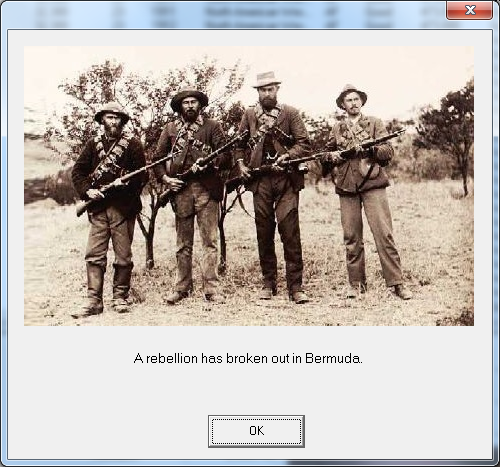
The Presidential Estate
Portland Federal District
9 July 1914
The weekly meeting with President Lakeland went on as smoothly as it ever could, given the history the Admiral had with the man. Between defying him during Lakeland's brief flirtation with Tetzel's cruiser infatuation and later undermining his attempts to block the peace treaty with Germany in 1910, the two men were understandably not on the best of speaking terms. In dealing with Lakeland as President, Admiral Garrett always felt silent relief that the British settlers of his nation had been so insistent on adapting the Westminster system with the American, providing for a Cabinet responsible to Parliament and thus, by proxy, keeping the President from having sole authority in military matters whatever the Constitution said about being Commander-in-Chief.
The last item of the day came at noon. "What do you think, Admiral, of a shooting competition for the Navy?", Lakeland asked. "I recall there were some several years ago that lifted morale and crew effectiveness."
"There were," the Admiral confirmed. "I am not opposed to the idea. The budget is there."
"Good. Good. I would like to observe the ships assigned to Bremerton when it is their turn." Lakeland looked up from his papers. "A chance to see the fleet our nation has spent so much treasure to build."
"I'll gladly escort you aboard the ship of your choice, Mister President," Admiral Garrett replied.
There was a nod. And more silence. Just before the Admiral could request permission to depart, Lakeland spoke up with a softer voice. "How is your wife? I've heard she is ill."
"A chronic bronchitis," the Admiral replied. "My son Thomas and his family are with her at the Pagosa Springs to take the waters there."
"And yet you are here?"
"Duty has kept me here, Mister President. Parliament expects my testimony on fleet readiness tomorrow before they go into summer recess." The Admiral nodded. "I expect to be on the train Friday night to join my family at the Springs. I admit my own health could use a turn at the waters."
Lakeland nodded. "Yes. They are good for the aches and pains of age, among other things. Just remember to bring something pleasant for fragrance, the sulfur is quite evident."
"I shall keep that in mind, sir."
Lakeland seemed to think of what he was to say next. "Whatever our past differences and difficulties, Admiral, I do value you and the Navy you have built for our nation. I hope you understand that whatever disagreements we may have, I wish to see the Cascadian Republic prosper as much as you do."
The Admiral nodded. "I agree, sir. Our methods are our main source of disagreement, not our wishes."
"I hope the waters work for you, Admiral… for you and your wife. My prayers are for her recovery."
"Thank you, Mister President."
There was nothing more to be said. The Admiral was immediately dismissed.
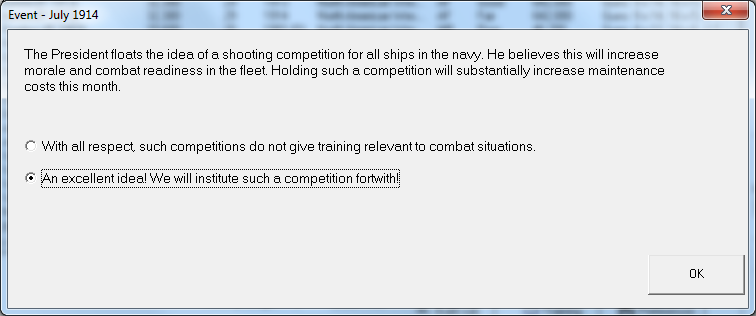
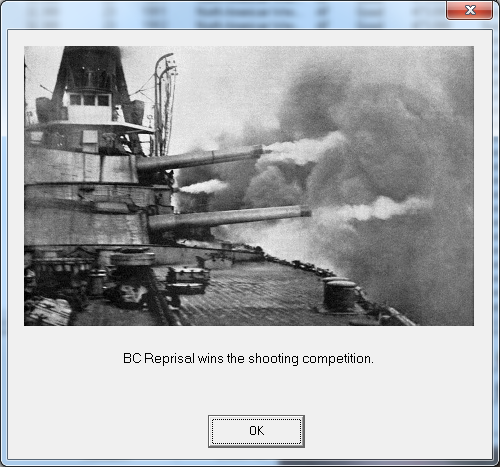
A new advance in fire control systems was announced by the Admiralty.
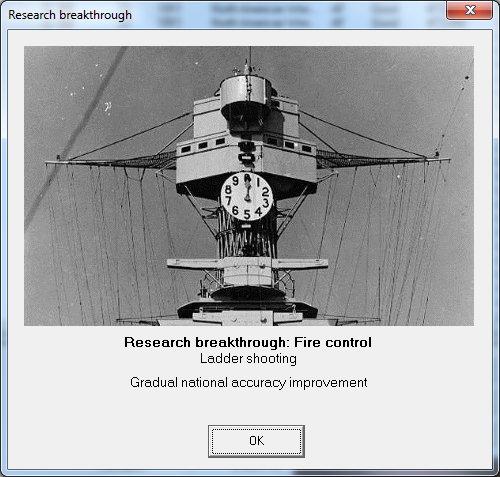
Naval Ordnance reported that new quality control procedures for shells would have to be reconsidered.
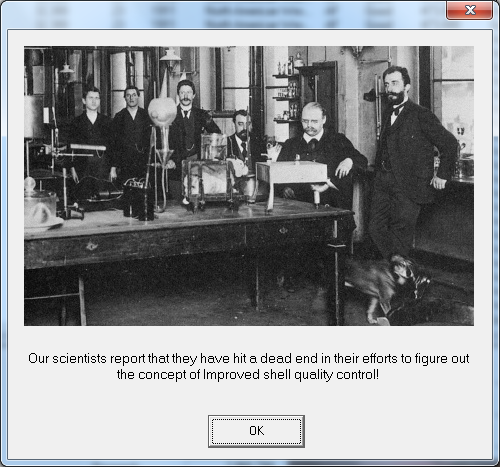
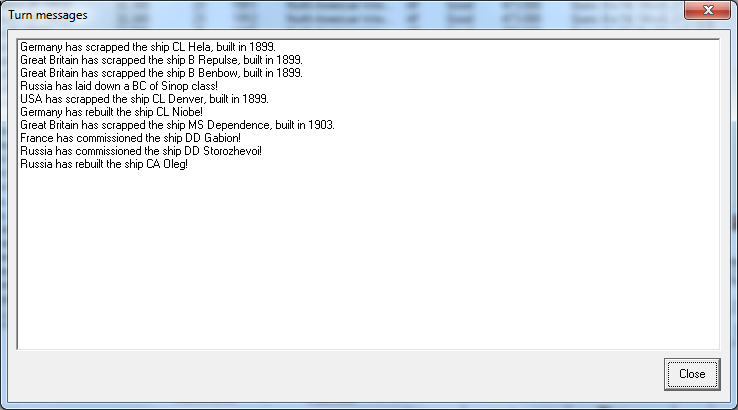
August 1914
The dock expansion program for the year was completed on schedule.
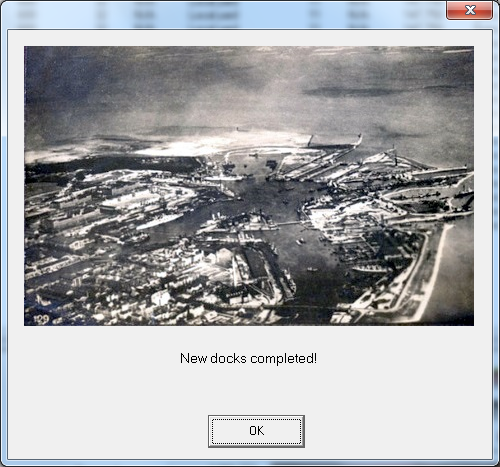
The Balkan situation was threatened with another explosion. The King of Greece was shot and killed by an assassin linked to the Serb Black Hand. Investigators later uncovered indications that the Black Hand, increasingly hostile to the Serbian Royal Government, were becoming associated with Lenin and the Russian Soviet.
As Europe reeled from the regicide, Admiral Garrett was asked for a public statement on the matter. Showing bitterness over the death of his father-in-law, he declared that whoever got involved with the Balkans would get their "fingers burned". "Whoever meddles in the Balkans is an idiot."
Unfortunately this response, and Lakeland's even more vicious reply, irritated several European capitals. Relations with Berlin, Paris, and Moscow suffered.
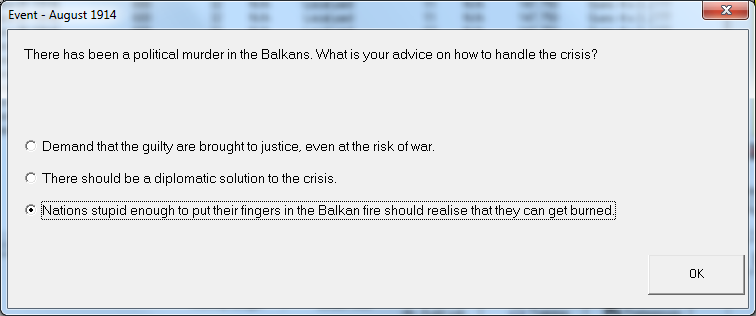
Germany tension to 8 France to 7 Russia 6
Cascadia had a shift in its politics on the 12th of February. Leonard Charleton's summit of radical labor and socialist leaders started a week prior in a conference hall in Kelowna. Disappointment with the Socialist cause was paramount to these individuals. Several looked up to what was happening in Russia, where Lenin had finished consolidating power and had stripped away the private sector entirely.
"It is clear that the forces of imperialism and capitalism are too powerful to be eliminated by the ballot box alone. It is plainly necessary that to save the workingman from his chains, we embrace other forms of political action beyond elections. Revolutionary struggle in the form of Lenin may be required before we prevail."
With those words Charleton tore the Cascadian Socialist movement in twain. The movement had previously been built up around peaceful change and anti-war sentiment - now Charleton wanted to embrace the idea of violent change through revolution. Many of those attending cheered. They were tired of the lack of progress. The most radical of the Socialists, they felt the Cushing government had made too many concessions to capitalism. What they wanted was the complete crushing of the capitalist class in the nation and the forced seizure of their industries by state power on behalf of the workers.
Responding to Charleton's speech, the gathered voted to form the nucleus of a new political party and organization. The Communist Party of Cascadia would stand for elections as well and in the meantime work to "awaken the proletariat" and "dispel the lies of the Socialists". Party members would be required to train with weaponry should the opportune moment for revolution be provided.
Charleton had believed, firmly, that the working class of the nation would flock to his banner. It remained to be seen if he was correct.
The research agreement with Britain continued to have an effect.
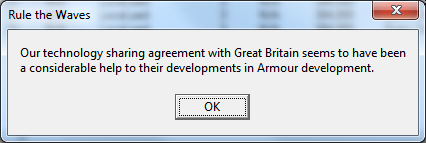
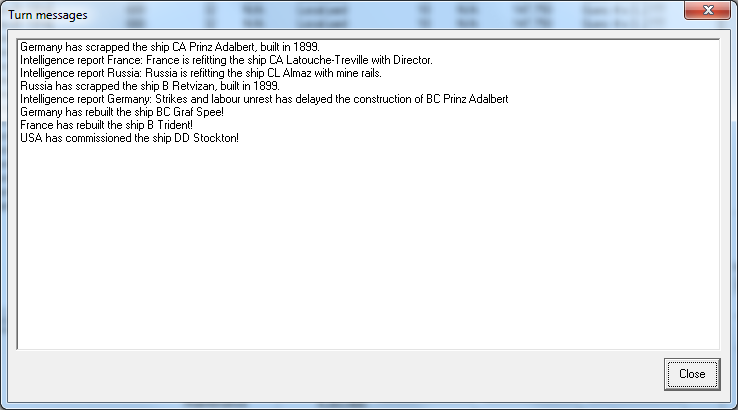
September 1914
The British Admiralty made an offer for plans to an improved Torpedo Protection System. Admiral Garrett urged acceptance for the nation's ally.
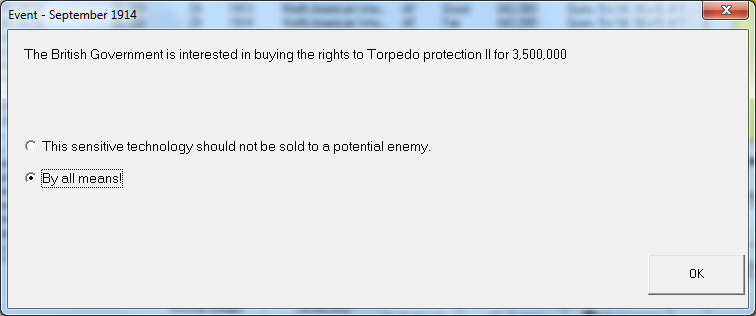
The proposal for a heavy raiding cruiser was revisited. Modifications were made to the design concept of the Apache, a 12000T+ criuser with 9 8" guns supported by 8 4" secondary guns and 10 2" deck guns. The 4" belt was for protection against smaller naval guns. The design speed of 30 knots gives the ship excellent escape opportunities against larger ships and the ability to chase down any raider it comes across.
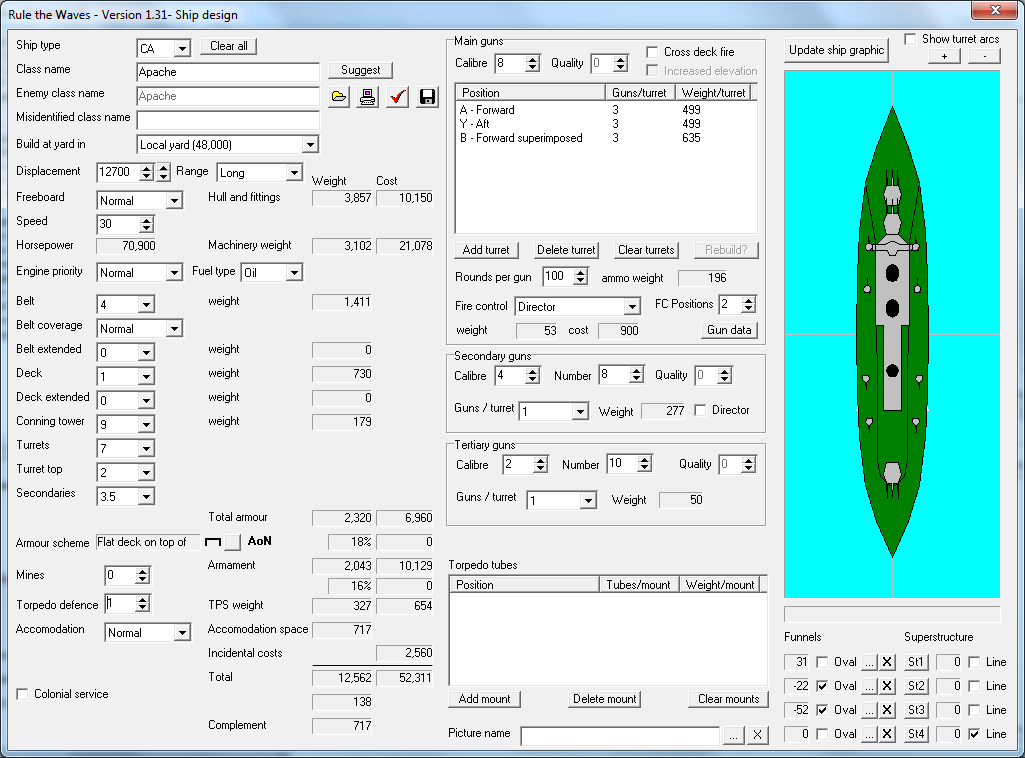
The Apache was laid along with a sister ship, the Navajo.
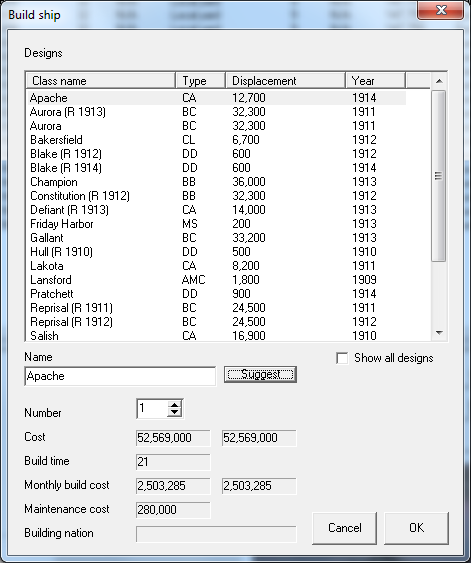
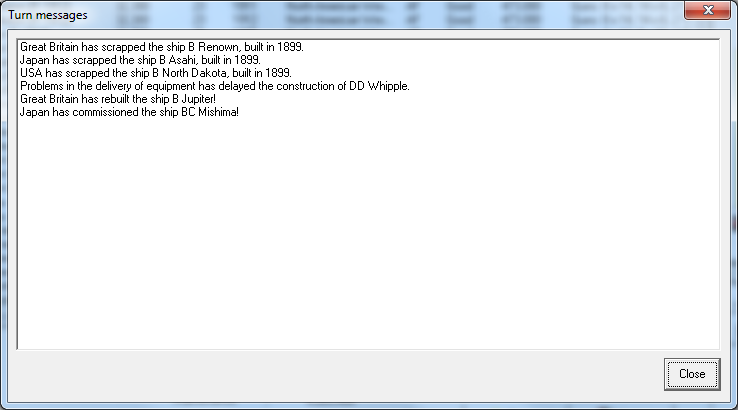
October 1914
The British government, already facing domestic strife over Ulster and the Irish Home Rule bill, was forced to deploy a division to Bermuda to try and suppress the rebellion.
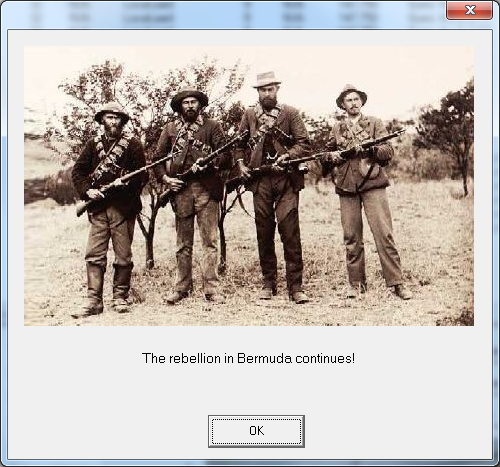
In the meantime, German backing for Argentina provoked another crisis between that nation and Chile. Against his own impulse, President Lakeland accepted the urging of his Cabinet to advise the Chileans to join them in a peace conference to try and iron out the difficulties.
Unfortunately, the talks failed to deliver a firm, workable solution. Nevertheless, relations with Germany and Russia improved. The British also signaled appreciation for Cascadia's peaceful solution with the Bermuda revolt still raging.
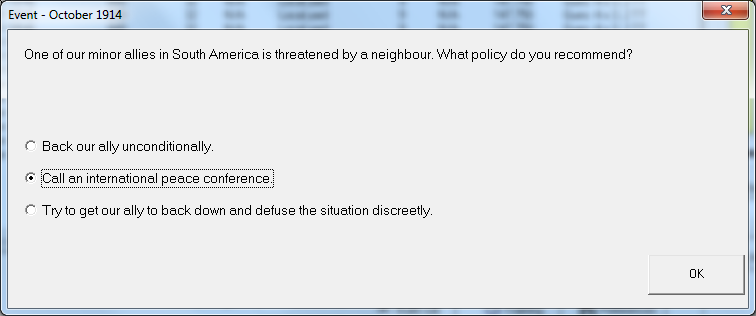
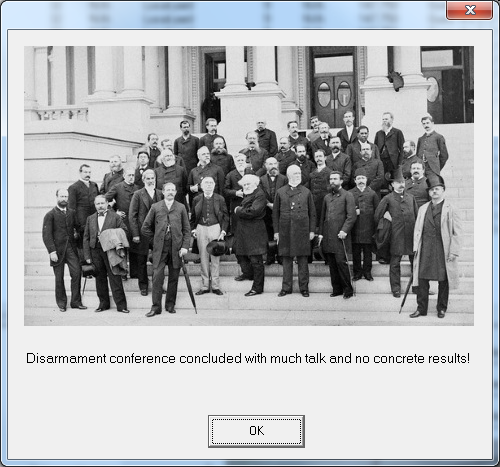
Germany tension to 7 Russia 5 UK 2
Research teams reported they had nearly finished work on new smoke floats for the Navy.
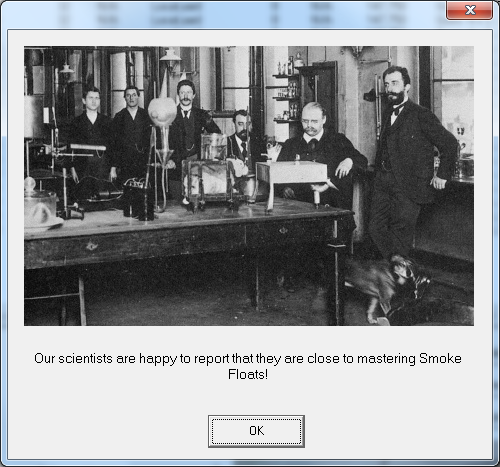
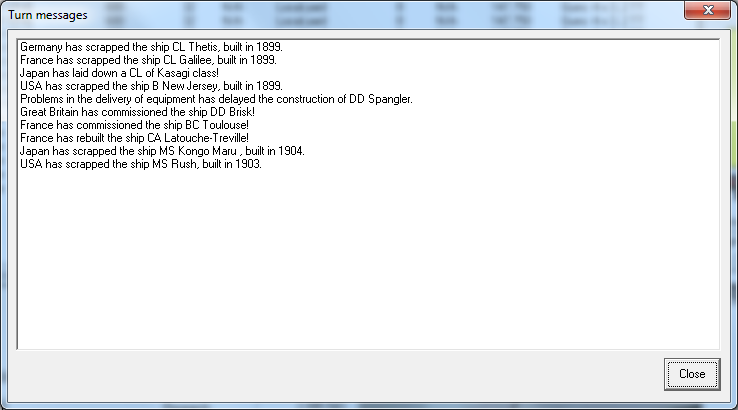
November 1914
The six new Pratchett-class destroyers were commissioned.
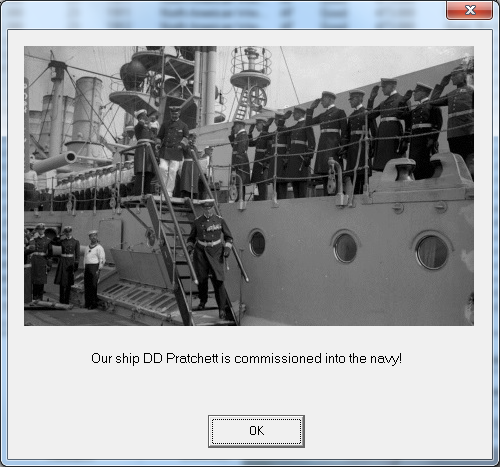
Despite the improving relations, President Lakeland believed that conflict with Germany was inevitable. With concern over German naval spending in mind, the Parliament acquiesced to his insistence on another naval spending increase, leading to bitter recriminations from the Socialists and the Dove-Democrats.
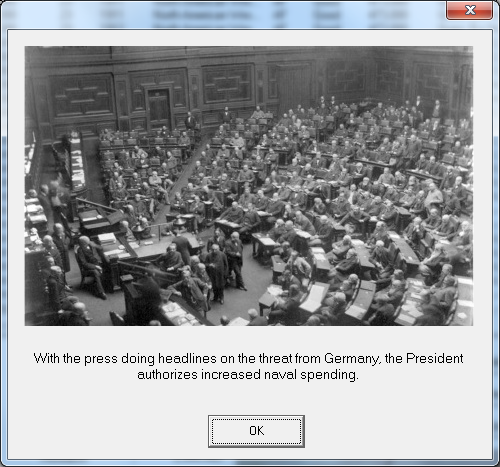
Germany tension to 8
British naval armor research has been aided by contact with Cascadian forging contractors.
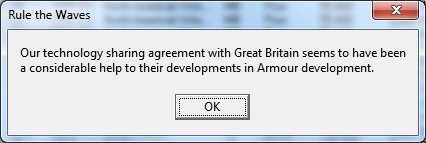
Naval Armoring reported they had nearly finished work on new improved homogenous armor.
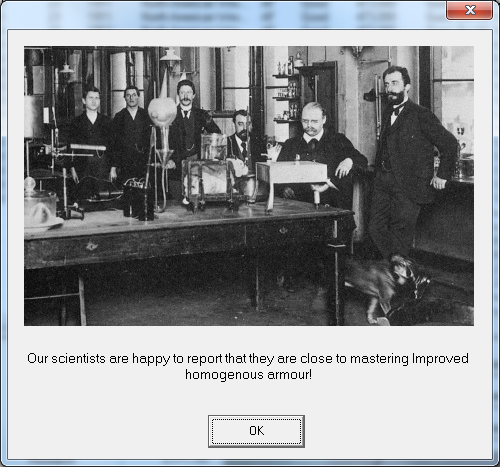
Naval Artillery reported that they had finished work on a new, improved triple turret layout that would eliminate accuracy and rate-of-fire deficiencies.
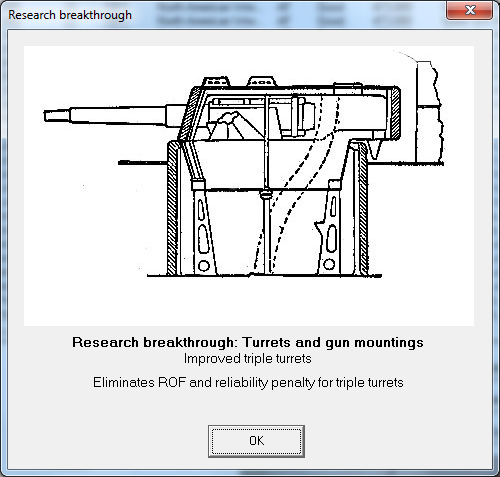
Smoke floats deployable by light cruisers were developed.
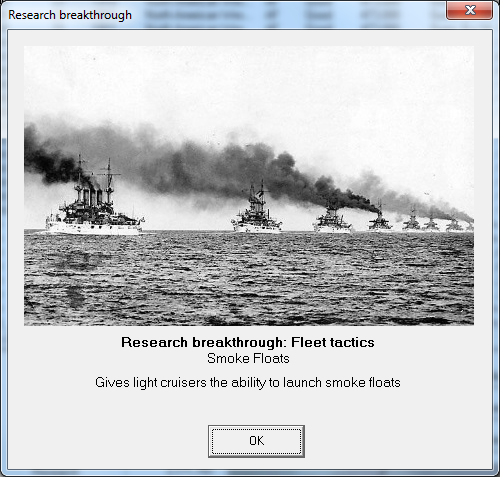
A new class of scout cruisers, the Vancouver-class, were put under order. They would be armed with 8 6" guns, several being on the centreline, with 6 3" deck guns (3 per side) and a design speed of 30 knots with a lightweight engine.
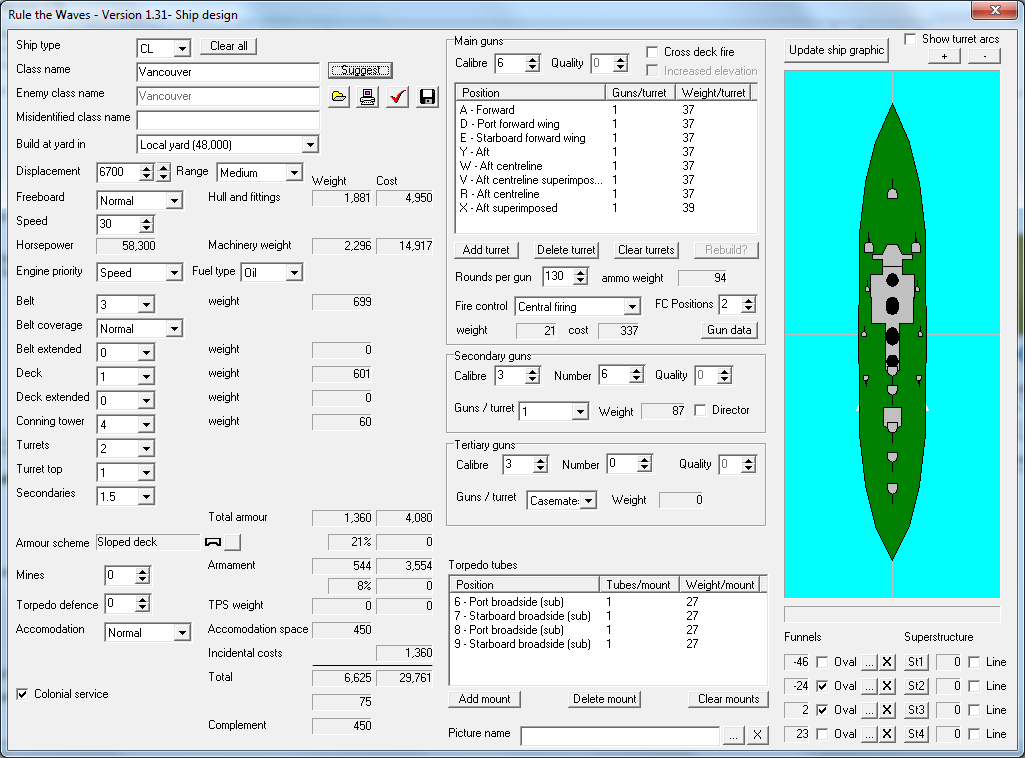
The Vancouver and a sister ship, the Richland, were ordered.
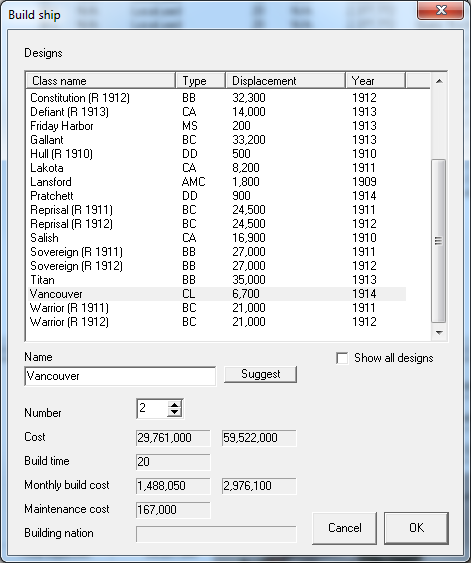
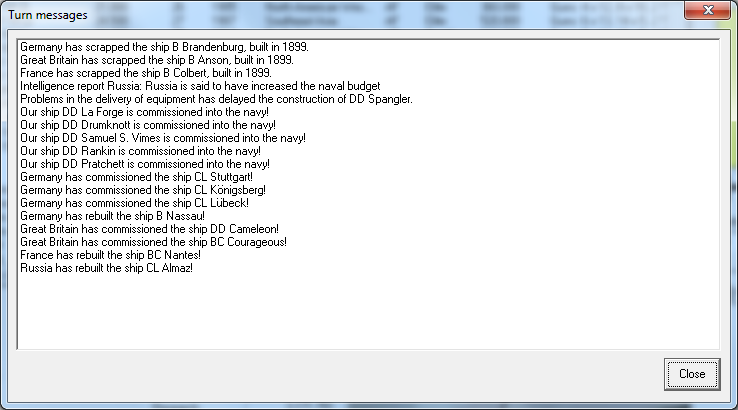
December 1914
Relations with Russia took a turn for the worse after Lenin gave another fiery speech denouncing Cascadia's territorial ambitions in the Pacific and continued possession of Kamchatka and Chukotka.
Russia tension to 6
New fleet tactics were devised through British and Cascadian working groups.
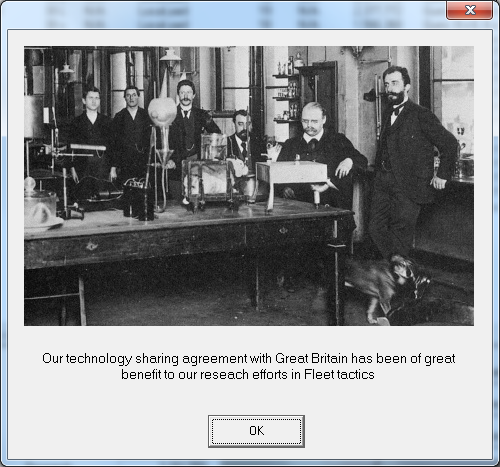
Difficulties are now reported over developing improved homogenous armor, in defiance of the prior month's statements.
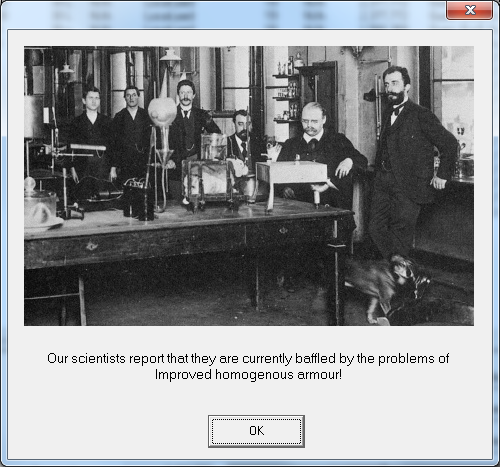
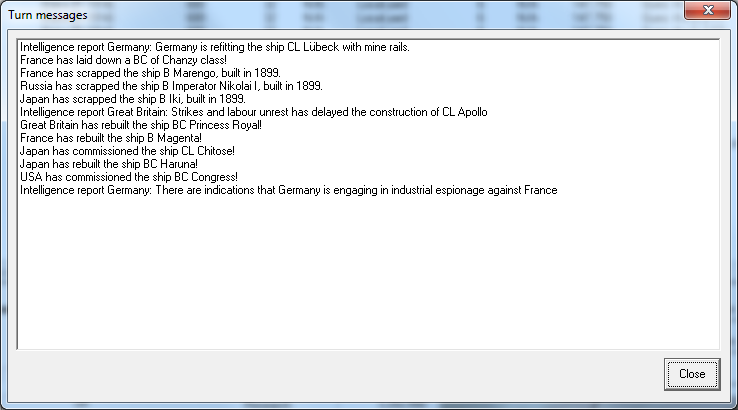
As of the end of 1914, here's how world naval spending and force size are looking:
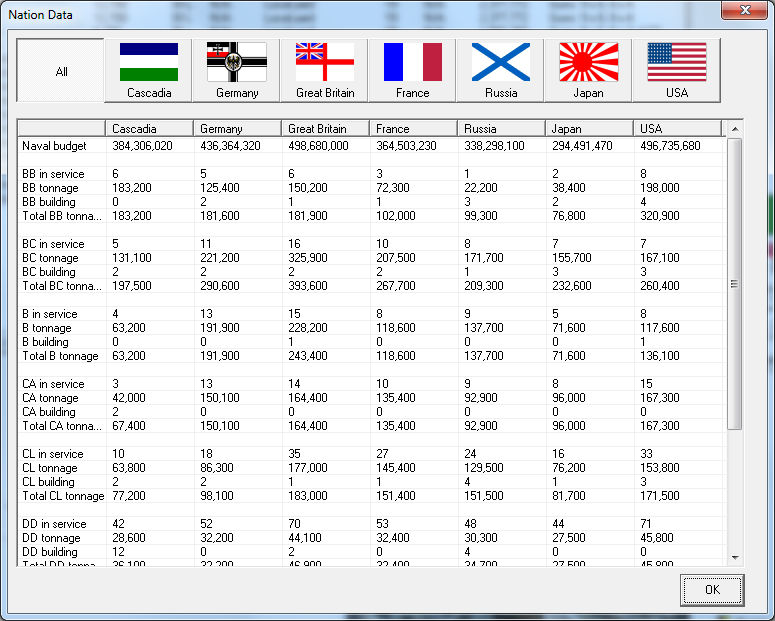
Social tensions and economic difficulties explode into a major revolt on the island of Bermuda against the British colonial authorities.

The Presidential Estate
Portland Federal District
9 July 1914
The weekly meeting with President Lakeland went on as smoothly as it ever could, given the history the Admiral had with the man. Between defying him during Lakeland's brief flirtation with Tetzel's cruiser infatuation and later undermining his attempts to block the peace treaty with Germany in 1910, the two men were understandably not on the best of speaking terms. In dealing with Lakeland as President, Admiral Garrett always felt silent relief that the British settlers of his nation had been so insistent on adapting the Westminster system with the American, providing for a Cabinet responsible to Parliament and thus, by proxy, keeping the President from having sole authority in military matters whatever the Constitution said about being Commander-in-Chief.
The last item of the day came at noon. "What do you think, Admiral, of a shooting competition for the Navy?", Lakeland asked. "I recall there were some several years ago that lifted morale and crew effectiveness."
"There were," the Admiral confirmed. "I am not opposed to the idea. The budget is there."
"Good. Good. I would like to observe the ships assigned to Bremerton when it is their turn." Lakeland looked up from his papers. "A chance to see the fleet our nation has spent so much treasure to build."
"I'll gladly escort you aboard the ship of your choice, Mister President," Admiral Garrett replied.
There was a nod. And more silence. Just before the Admiral could request permission to depart, Lakeland spoke up with a softer voice. "How is your wife? I've heard she is ill."
"A chronic bronchitis," the Admiral replied. "My son Thomas and his family are with her at the Pagosa Springs to take the waters there."
"And yet you are here?"
"Duty has kept me here, Mister President. Parliament expects my testimony on fleet readiness tomorrow before they go into summer recess." The Admiral nodded. "I expect to be on the train Friday night to join my family at the Springs. I admit my own health could use a turn at the waters."
Lakeland nodded. "Yes. They are good for the aches and pains of age, among other things. Just remember to bring something pleasant for fragrance, the sulfur is quite evident."
"I shall keep that in mind, sir."
Lakeland seemed to think of what he was to say next. "Whatever our past differences and difficulties, Admiral, I do value you and the Navy you have built for our nation. I hope you understand that whatever disagreements we may have, I wish to see the Cascadian Republic prosper as much as you do."
The Admiral nodded. "I agree, sir. Our methods are our main source of disagreement, not our wishes."
"I hope the waters work for you, Admiral… for you and your wife. My prayers are for her recovery."
"Thank you, Mister President."
There was nothing more to be said. The Admiral was immediately dismissed.


A new advance in fire control systems was announced by the Admiralty.

Naval Ordnance reported that new quality control procedures for shells would have to be reconsidered.


August 1914
The dock expansion program for the year was completed on schedule.

The Balkan situation was threatened with another explosion. The King of Greece was shot and killed by an assassin linked to the Serb Black Hand. Investigators later uncovered indications that the Black Hand, increasingly hostile to the Serbian Royal Government, were becoming associated with Lenin and the Russian Soviet.
As Europe reeled from the regicide, Admiral Garrett was asked for a public statement on the matter. Showing bitterness over the death of his father-in-law, he declared that whoever got involved with the Balkans would get their "fingers burned". "Whoever meddles in the Balkans is an idiot."
Unfortunately this response, and Lakeland's even more vicious reply, irritated several European capitals. Relations with Berlin, Paris, and Moscow suffered.

Germany tension to 8 France to 7 Russia 6
Cascadia had a shift in its politics on the 12th of February. Leonard Charleton's summit of radical labor and socialist leaders started a week prior in a conference hall in Kelowna. Disappointment with the Socialist cause was paramount to these individuals. Several looked up to what was happening in Russia, where Lenin had finished consolidating power and had stripped away the private sector entirely.
"It is clear that the forces of imperialism and capitalism are too powerful to be eliminated by the ballot box alone. It is plainly necessary that to save the workingman from his chains, we embrace other forms of political action beyond elections. Revolutionary struggle in the form of Lenin may be required before we prevail."
With those words Charleton tore the Cascadian Socialist movement in twain. The movement had previously been built up around peaceful change and anti-war sentiment - now Charleton wanted to embrace the idea of violent change through revolution. Many of those attending cheered. They were tired of the lack of progress. The most radical of the Socialists, they felt the Cushing government had made too many concessions to capitalism. What they wanted was the complete crushing of the capitalist class in the nation and the forced seizure of their industries by state power on behalf of the workers.
Responding to Charleton's speech, the gathered voted to form the nucleus of a new political party and organization. The Communist Party of Cascadia would stand for elections as well and in the meantime work to "awaken the proletariat" and "dispel the lies of the Socialists". Party members would be required to train with weaponry should the opportune moment for revolution be provided.
Charleton had believed, firmly, that the working class of the nation would flock to his banner. It remained to be seen if he was correct.
The research agreement with Britain continued to have an effect.


September 1914
The British Admiralty made an offer for plans to an improved Torpedo Protection System. Admiral Garrett urged acceptance for the nation's ally.

The proposal for a heavy raiding cruiser was revisited. Modifications were made to the design concept of the Apache, a 12000T+ criuser with 9 8" guns supported by 8 4" secondary guns and 10 2" deck guns. The 4" belt was for protection against smaller naval guns. The design speed of 30 knots gives the ship excellent escape opportunities against larger ships and the ability to chase down any raider it comes across.

The Apache was laid along with a sister ship, the Navajo.


October 1914
The British government, already facing domestic strife over Ulster and the Irish Home Rule bill, was forced to deploy a division to Bermuda to try and suppress the rebellion.

In the meantime, German backing for Argentina provoked another crisis between that nation and Chile. Against his own impulse, President Lakeland accepted the urging of his Cabinet to advise the Chileans to join them in a peace conference to try and iron out the difficulties.
Unfortunately, the talks failed to deliver a firm, workable solution. Nevertheless, relations with Germany and Russia improved. The British also signaled appreciation for Cascadia's peaceful solution with the Bermuda revolt still raging.


Germany tension to 7 Russia 5 UK 2
Research teams reported they had nearly finished work on new smoke floats for the Navy.


November 1914
The six new Pratchett-class destroyers were commissioned.

Despite the improving relations, President Lakeland believed that conflict with Germany was inevitable. With concern over German naval spending in mind, the Parliament acquiesced to his insistence on another naval spending increase, leading to bitter recriminations from the Socialists and the Dove-Democrats.

Germany tension to 8
British naval armor research has been aided by contact with Cascadian forging contractors.

Naval Armoring reported they had nearly finished work on new improved homogenous armor.

Naval Artillery reported that they had finished work on a new, improved triple turret layout that would eliminate accuracy and rate-of-fire deficiencies.

Smoke floats deployable by light cruisers were developed.

A new class of scout cruisers, the Vancouver-class, were put under order. They would be armed with 8 6" guns, several being on the centreline, with 6 3" deck guns (3 per side) and a design speed of 30 knots with a lightweight engine.

The Vancouver and a sister ship, the Richland, were ordered.


December 1914
Relations with Russia took a turn for the worse after Lenin gave another fiery speech denouncing Cascadia's territorial ambitions in the Pacific and continued possession of Kamchatka and Chukotka.
Russia tension to 6
New fleet tactics were devised through British and Cascadian working groups.

Difficulties are now reported over developing improved homogenous armor, in defiance of the prior month's statements.


As of the end of 1914, here's how world naval spending and force size are looking:

”A Radical is a man with both feet planted firmly in the air.” – Franklin Delano Roosevelt
"No folly is more costly than the folly of intolerant idealism." - Sir Winston L. S. Churchill, Princips Britannia
American Conservatism is about the exercise of personal responsibility without state interference in the lives of the citizenry..... unless, of course, it involves using the bludgeon of state power to suppress things Conservatives do not like.
DONALD J. TRUMP IS A SEDITIOUS TRAITOR AND MUST BE IMPEACHED
"No folly is more costly than the folly of intolerant idealism." - Sir Winston L. S. Churchill, Princips Britannia
American Conservatism is about the exercise of personal responsibility without state interference in the lives of the citizenry..... unless, of course, it involves using the bludgeon of state power to suppress things Conservatives do not like.
DONALD J. TRUMP IS A SEDITIOUS TRAITOR AND MUST BE IMPEACHED
Re: Let's Play "Rule The Waves" w/ Steve's Custom Country "Cascadia"
January 1915
The Admiralty
Portland Federal District
3 January 1915
Naval Secretary Santiago came by for the first meeting of the new year with the high officers of the Admiralty. Tensions with Germany were casting a pall over the upcoming year, although it remained to be seen if another war would break out. The constant struggling with the European power seemed to have become part of life for the Cascadian Republic. Lakeland had made clear his own view that it would only end when Cascadia had successfully expelled the Germans from the Pacific. A prospect that, in Santiago's view, was not likely to happen easily.
Admiral Garrett directed the meeting with customary diligence. He had already sat as Chief of Naval Operations for the longest period in the nation's half century of history and the Admiralty had become his machine through and through. Santiago often got the feeling that his role was completely unnecessary in the Navy. The Admiral's long time in his post meant that many politicians in the capital knew him - he did not need the Naval Secretary to represent his interests in Parliament or the Cabinet.
Had Santiago been more ambitious about a vision for the Navy, this might have rankled. As it was, his primary concern was making sure the Navy stayed in budget and responded to the Cabinet's directives promptly.
After the meeting, he remained behind to converse with Admiral Garrett privately. "This American contract for new light guns…"
"There is potential use for 2" weapons on destroyers," Admiral Garrett remarked. "And certainly on submersibles. It is worth the money."
"I will complete the paperwork then, if you are so sure," Santiago replied. He reached into his pocket and pulled out a pack of cigarettes. "When will you re-deploy the fleet back to Manila?"
"When war appears imminent," he replied. "The Naval budget is currently spoken for elsewhere. A deployment may force me to suspend construction of our new ships. And we have need of those cruisers for our fleet."
Santiago nodded at the Admiral's assessment. "Very well." For a moment he said nothing further. "How is your wife?"
"Better," the Admiral answered. "Her health is much improved over these past months."
"She wasn't at the New Year's Celebration the President threw," Santiago explained. "I was concerned…"
"Her physician believed the winter weather was not conducive to her health," Admiral Garrett replied. "I agreed. She and Gabbie are staying at the Vallejo house in Santa Barbara until the winter is over."
"I see. And your other daughter…"
"Attending classes at the National University," he answered. "Her first year. She lives on campus during the week and visits on the weekends."
"So you are alone?"
"I am."
"My condolences. Winter in this city is gray enough as it is." Santiago stopped at the door before leaving. "I imagine you would rather be with your family."
"Yes. But duty demands I remain at my post."
"Duty. Yes. I can respect that in you, Admiral." Santiago nodded. "But you have carried the burden of duty for so long. With your wife's health as it is, I would wonder if you might be better off…"
"...is this your way of asking for me to resign, Mister Secretary?"
"No, Admiral," he replied.
"Thank you. I did not want to have miscommunication on the issue." Admiral Garrett nodded. "Is there anything else?"
"No, Admiral. Nothing. I shall see you later."
"Have a pleasant day, Mister Secretary."
Rain drizzled down from the gray clouds that dominated Portland's winter weather as always. The motor cab pulled along the rain-slick road until it stopped in front of the neighborhood townhouse as always. The Admiral gave a generous tip and fare to the Barbadian immigrant driving the cab. He unfolded his umbrella outside the door and stepped out into the cold drizzle. Thankfully it was only about twenty feet, if not less, to the covering over the front door. He closed the umbrella there and entered his home.
His quiet, empty house.
Not so empty. Mei Ling was waiting, as always, and was by his side by the time he put the umbrella away in its stand. "Welcome home, Admiral," she said, her English much improved since the day Rachel had hired her to replace Josephine. Without another word she helped him out of his great coat. "Dinner is cooking. Mrs. Lowes has a soup out for you to start with."
"Thank you," he said. "Allow me to change."
As always he went into his ground floor rooms and put his uniform in the wardrobe he kept for all of his uniforms. He changed into his house robe, a dark burgundy-colored garment that Rachel had bought for him nearly a year ago, and returned to the study. A steaming bowl of chicken soup was already laid out at his desk. He picked a book from the nearby shelf - Mahan for light reading at the moment - and went to his chair to begin sipping on the rich broth.
Normally he would be in the dining room. That was the custom for years. But there was little point now. Not unless Sophie was here for dinner, and that was usually only Friday and Saturday nights. With Rachel and Gabbie down in southern California, Thomas and his growing family living at the Vallejo estate near Mare Island, and Raffie quartered in Bremerton while the Liberty was in port, there was nobody to share a proper meal with. Mrs. Lowes was kind enough to cook dinners for him before going home to her family, and she had been doing so since Rachel took young Laurie with her to Santa Barbara, and Mei Ling would eat privately as well.
The sting of loneliness during the week had dulled over time. But it was still there. For so many years he had been used to the sounds of life in this house, to his children playing and Rachel teaching Sophie…
He thought back to what Santiago had been saying. By all standard measures he had indeed governed the Navy for longer than any other. Was it time to move on? To retire and enjoy his final years with Rachel? To have the time to check in on the grandkids? He'd given over 40 years of loyal service to his nation. Maybe it was time to retire.
He wouldn't have an answer to that by the end of the day, certainly. But it was a thought to consider. For the future.
(Apologies, I had an error due to having SWTOR on in the background, the screenshots of buying the improved 2" guns didn't work.)
February 1915
The Admiralty
Portland, Federal District
4 February 1915
Rear Admiral James Hawke was the newest admiral in the Navy. His position with Naval Intelligence, specifically the Security Office, had been made official upon his promotion to Captaincy, and now he was in charge of foreign field operations for Naval Intelligence.
A group of lieutenants were clustered around the desk while he stood off, waiting for the response to come. He had already anticipated it.
"No. No, this is too risky." Admiral Garrett thumped the papers in front of him laying out the operational plan.
Said plan? To utilize the contacts Cascadian Naval Intelligence had established in Germany's Pacific fleet ports to launch a sabotage mission. The goal would be to blow up a German battlecruiser in port.
"I can guarantee you we can…."
Before Lieutenant Commander Osbourne could finish, Admiral Garrett cut him off fiercely. "I won't hear of it!", he shouted. "Even if you succeed, it would simply guarantee a new war! And our nation would again be seen as the instigator! The answer is final!"
The officer were dejected - and indignant - as they filed out. "That was rather harsh," Hawke pointed out to his superior.
"Harshness is deserved for such mindless ambition," the Admiral growled. "The little fools. They underestimate the Germans."
"They do, yes." Hawke nodded. "But ambition can be useful when properly re-directed."
"I'll leave it to you, Admiral Hawke, to best re-direct them. I've little patience for these games myself."
"Yes sir." Upon departing the intelligence man sighed. The CNO was a visionary when it came to embracing new warship concepts, but his grasp of how useful intelligence work could be never seemed to go beyond acquiring enemy design plans. With a little tweaking, the bombing plan might yet be feasible...
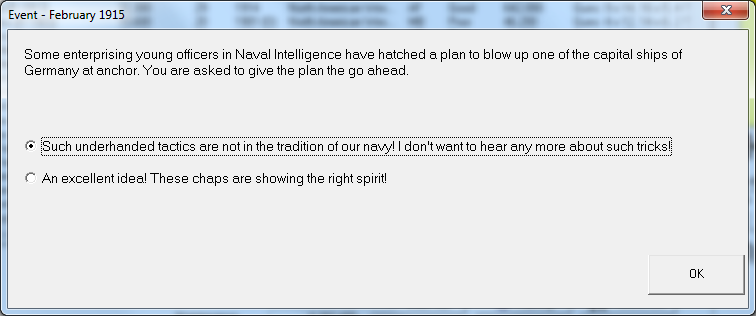
New gyroscopes for Cascadian torpedoes have been implemented after close work with British torpedo manufacturers.
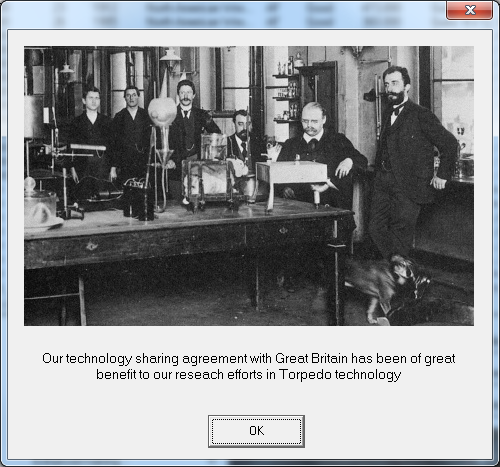
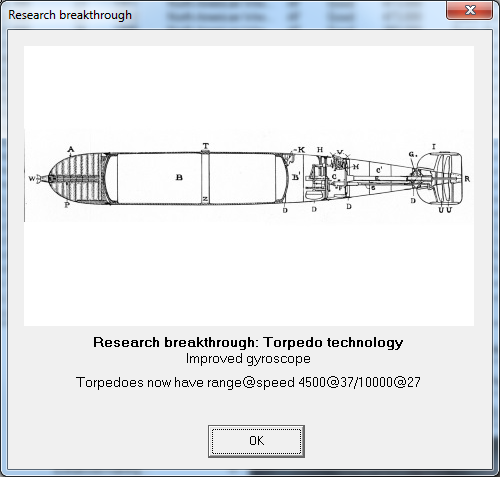
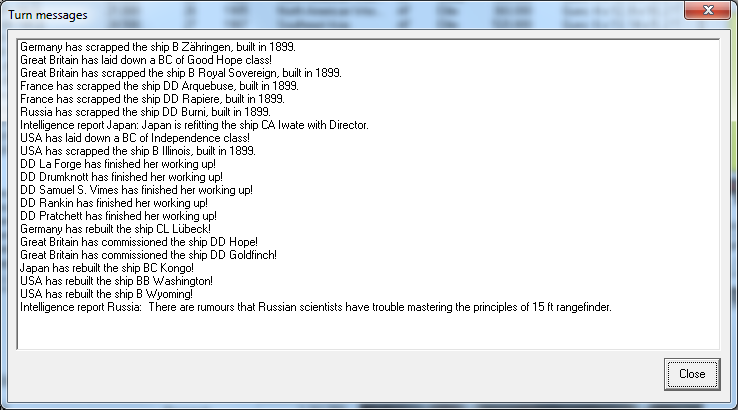
March 1915
After months of disorder, peace is restored to the island of Bermuda. General amnesties are declared for many of those caught up in the riots, while ringleaders are incarcerated elsewhere in the British Empire.
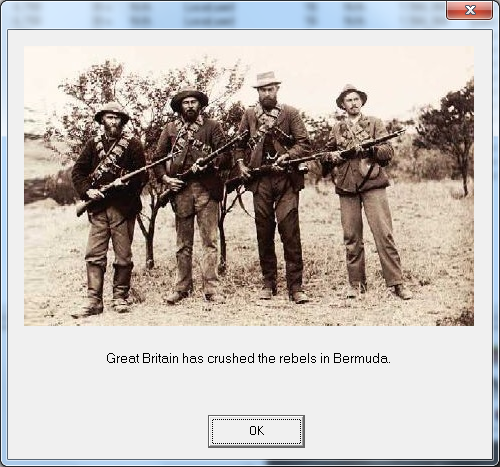
Naval Artillery reported that their design teams had put together a workable model for quadruple turrets. While an intriguing advance, the Admiralty did not commit to using the turret layout on any planned ships.
A proposal was made that the next class of destroyer would be built with super-imposed guns, allowing a reduction in the number of guns mounted on the new class without reducing effective firepower.
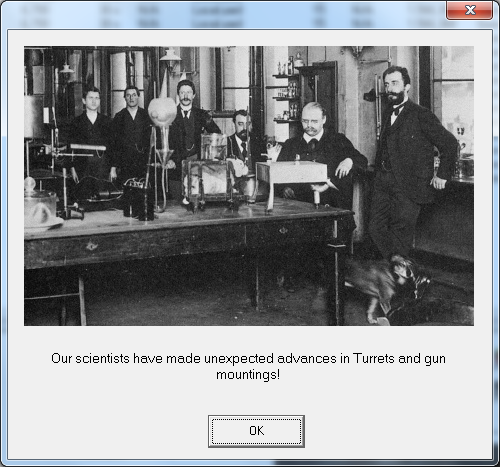
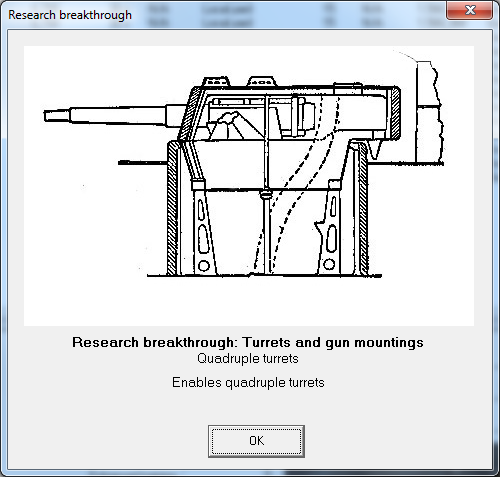
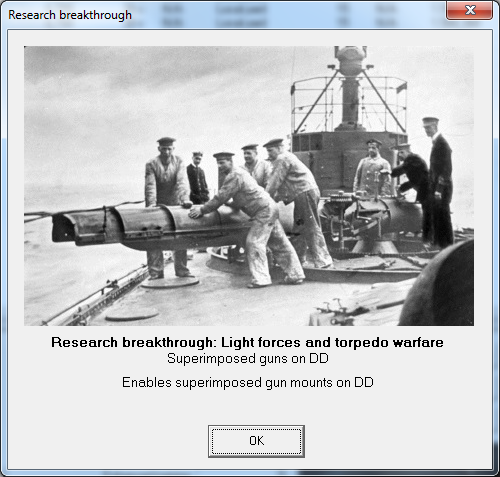
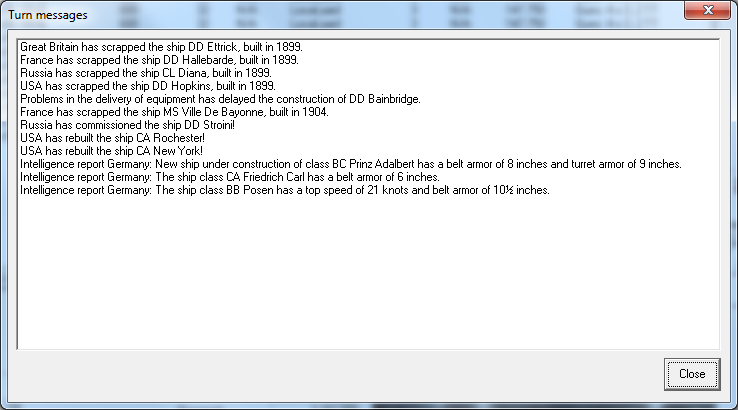
April 1915
Due to a decline in private orders and the loss of an expected contract from China, Moran Brothers offered a discount on another Vancouver-class cruiser. The Admiralty, upon review of the budget, decided it would fit within the year's budget and accepted the offer, naming the vessel Seattle.
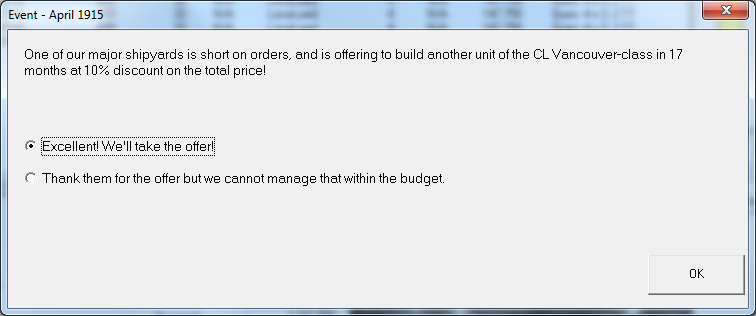
Called upon by the Navy League to give a speech, Admiral Garrett laid out his views on the ongoing tensions in the world. During the speech he gave his impression of the threat Germany still posed to Cascadian interests whether or not the two were in hostilities. "The conquest of Sumatra is a dagger pointed at the throat of Cascadian trade in Southeast Asia," as the Admiral laid out that the Germans' ability to threaten the shipping through the Strait of Malacca was severe to Cascadian trade. President Lakeland was quick to second the Admiral's opinion.
When news of the speech reached Germany, the result was a new wave of anti-Cascadian fulminations in German newspapers. The German press were quick to exploit the remarks as proof of Cascadia's "reckless hatred of the German Empire and disregard for its rights". A number of German conservative politicians insisted that the nation reconsider the matter of Samoa.
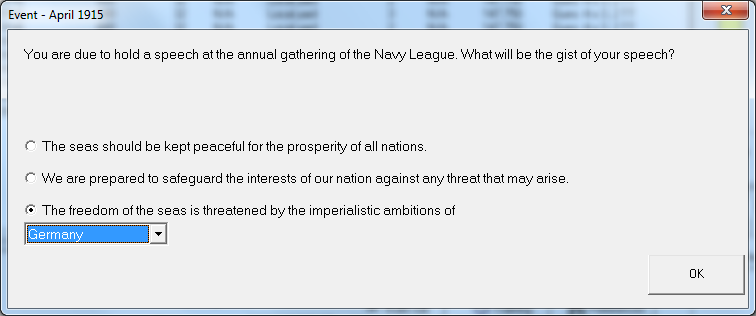
German tension up to 10
A report from Naval Artillery indicated progress in a new 15ft rangefinder for ire control systems.
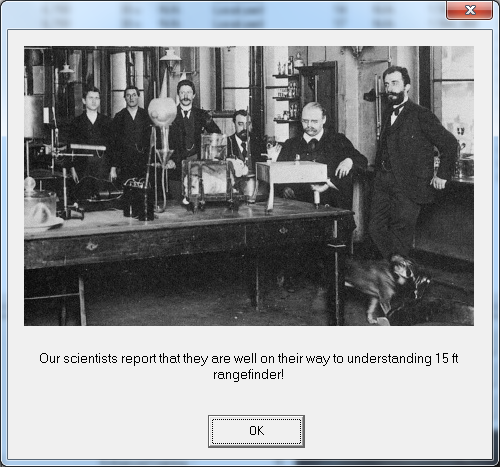
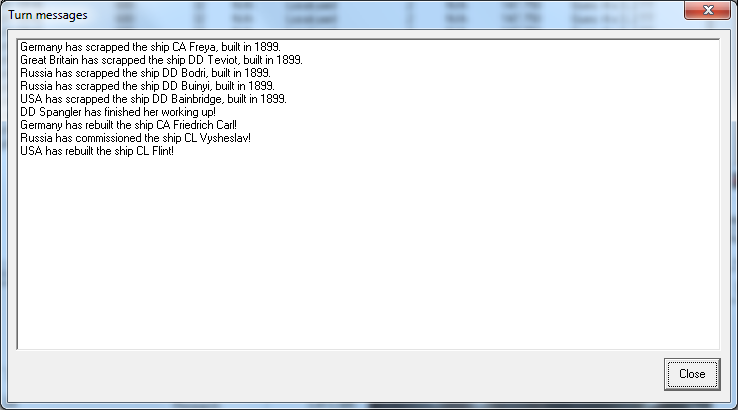
New wires from Mozambique indicated a new upsurge in rebel activity exploiting the political instability in Portugal following the fall of the monarchy and creation of the Portuguese Republic. Several armed groups were attacking government targets and threatening European interests in the colony.
The German consul in Lourenço Marques issued a state to the Portuguese colonial authorities, insisting that Portugal do more to keep the rebels out of German East Africa. When the Portuguese government failed to post more forces in the north, the German authorities in that colony began shifting troops to the south. In Berlin the Reichstag was asked to consider funding to purchase the colony from Portugal.
News of this reached London. The British had a long-standing treaty with Portugal and issued a statement supporting continued Portuguese rule in Mozambique. British squadrons in the area were wired orders to patrol off the coast and prevent any German attempts to enter the colony. Asquith's government approached Ambassador Armstrong and informed him of the situation. Cascadian commitment to the defense of Mozambique was requested.
In Portland, Lakeland was quick to support the idea. Burgess was more circumspect, fearing the situation would spiral, but Muniz won him over in the Cabinet debates on the issue. On April 27th, the Cascadian government agreed to support Britain in thwarting any German designs in Mozambique.
With the situation as it was, Admiral Garrett contemplated a deployment of the fleet. But such an order would undoubtedly heighten the crisis and prompt Germany to feel cornered. It seemed more circumspect to not change fleet readiness and deployments for the moment and therefore not spook the Germans.
This decision was a controversial one, to be certain, given what later happened. It was one of the acts the Admiral would be most bitterly criticized for. It would be left to future historians to demonstrate that, with the facts on hand, his decision was a realistic choice to prevent war, not simply a "naive" choice to avoid a war that couldn't be stopped.
He had other things on his mind, however.
The Garrett House
West Portland, Oregon
23 April 1915
Two weeks.
Two weeks his family had been home - Rachel and Gabbie back from Santa Barbara, Sophie still around for the weekends - and everything had been fine.
Now it was the afternoon and Admiral Garrett, in house robe, was carrying the tray with their dinners to Rachel in her sickbed. It might have been the late spurt of cold rain, one last blast of the usual wet season, but she was again in bed with a bronchitis that the doctors worried was becoming pneumonia. Rachel had become pale again and he could hear the wheezing in her struggle to take complete breaths. "Here, my dear," he said. The steaming soups and stews Laurie had cooked were made to help with her health. And his own, frankly. He set the bed tray in her lap.
"Thank you de-." A coughing fit interrupted her sentence. He held up the handkerchief for her to cough into. Horrid mucus came out with the coughs. It clearly brought her pain, so he used his free hand to take hers. When the coughing was over she smiled weakly at him.
In the past two years, Rachel's hair had begun to whiten. And at an alarming rate. It was as if all of the emotional turmoils of the past half-decade - Thomas' mutilation in the last war, her father's death, the stress of raising Gabbie as their last child reached adolescence - were sapping the vitality from her.
"Perhaps you should take to the waters at Pagosa again?", he ventured. "They did wonders for you last summer."
"You wish to see me leave home again, my dear?", she asked. A bit of her old fire showed. She was teasing him. "You enjoy living the bachelor life?"
"No. God no." He shook his head. "I lived for the weekends and Sophie coming home. This house is too empty without you and Gabbie, Rachel." He kissed her on the forehead before partaking of his own bowl of soup. After swallowing it he added, "I merely worry about your health."
"I will go if you go too," she said. "Otherwise, I am tired of being apart from you, and I will stay."
His expression darkened. "If things were otherwise, I would inform the Admiralty that I was taking a leave. But this situation in East Africa has everyone on edge. The Kaiser is in one of his moods again, it seems. Or he has lost control of his expansionist clique."
Rachel frowned deeply. "Mother of God preserve us… it has not yet been five years since the peace. Are we to go to war again? Must Thomas lose the other eye?"
"No. No, I don't…" The Admiral sighed. "It may be nothing. Our relations with Germany are soured again, yes, but it needn't come to war. The Germans know that a renewed war will see our fleet and the Royal Navy shut them up in the North Sea. We will cut off their trade and their economy will crumble. That has to bring restraint to the policymakers in Berlin."
"If there is war, then it will be Raffie…" Rachel shook her head. "I have nearly lost one son to conflict. Must the other be risked?"
"It was his choice, dear. His choice to be in the Navy."
"I know. I… simply worry. I…"
Before she could take another bite, another coughing fit began. He helped her with it. After about fifteen seconds it subsided and she took a pained breath.
After a couple more spoonfuls of the hearty broth before them, Rachel spoke up. "You have been in the Admiralty for fifteen years," she said. "And you have led the Navy for most of them."
"Yes." He knew where the talk was going now.
"Stephen, haven't you served long enough. You have grown white-haired in the service of our nation. Isn't it time for someone else to take up that burden? You could retire. We could live at the family home and be with our grandchildren. Visit with your family in the summers and retire to Santa Barbara in the winters. We have so little time left, I wish we could spend it together…"
He listened to her speak and found himself in agreement. He felt worn and weary from the years of service, of meetings and political arguments and finessing the naval budget and all other things. Retirement had an appeal to him that could not be ignored.
But duty wouldn't let go. Not yet. Not in this situation. "If not for this Mozambique crisis, I would say yes, and seek to resign before the year was out," he admitted. "But the crisis as it stands must be dealt with. I can't afford to leave the Admiralty in a search for new leadership with war on the horizon."
Rachel nodded. Her disappointment was met only by her understanding. "I know," she said. "And that is why I love you so."
"And I you." He smiled at her.
And he made a resolution to himself. As much as he appreciated his duty, as much as he still enjoyed getting to mold the Cascadian Navy into the image he desired for it… he would give it all up to spend their last years together.
If nothing happened before the end of the year, he would retire.
Seven days later, Germany invaded Mozambique.
May 1915
At the end of April, German colonial troops marched into Portuguese Mozambique.
The ongoing upheavals in that colony had threatened to spill over the borders. German colonial authorities claimed to have discovered that the rebels in Portuguese territory were trying to foment a rebellion in Tanganyika. They wired to Berlin repeatedly, requesting permission to enter Mozambique to pursue the rebels.
In Berlin, there was a hope that a limited operation would avoid setting off the British. The Kaiser approved the operation with standard bombast, however, and as the reports came in German mood hardened. The Portuguese had clearly lost control in that distant African colony and they could not guarantee the safety of other Europeans. It was time for Germany to impose order in Southeast Africa. They would appeal to the opinion of Europe to restrain Britain and Cascadia.
If that did not work, then Germany had her growing submersible force and raiding cruisers to scour the British and Cascadian merchant marine from the seas. It was believed that only a union of the British and Cascadian fleets in the North Sea could effectively blockade Germany, but the land-hungry Cascadians would never deploy the majority of their fleet to thankless blockading when they could grabbing at Germany's Pacific colonies.
In retrospect, many would say that the Germans had simply lost patience. Years of being stung repeatedly by the upstart Cascadians, now joined with Britain and its efforts to curtail Germany, had left the German people frustrated and angry. And they were ready for a fight.
On April 30th, German colonial forces crossed the border. The German Indian Ocean squadron moved along the coast to support them and to land troops in Inhambane to secure the northern port.
Word reached London by way of the British consul, who was informed by the Portuguese. The Asquith Government immediately issued a demand that Germany withdraw. The Cascadian government echoed the demand.
The May Day Demand polarized opinion in Berlin. The SDP, preparing for their marches torn between pacifists who opposed a war and those willing to support the effort. In the end, this split defeated the best change of the Reichstag intervening to force a backdown.
In Portland, Muniz proposed that an international force be assembled, with Britian in the lead. Several French and Russian ships joined up with the British to do just that, forcing the Germans to turn back.
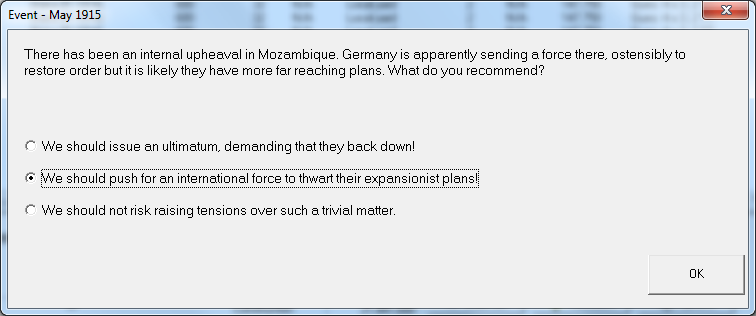
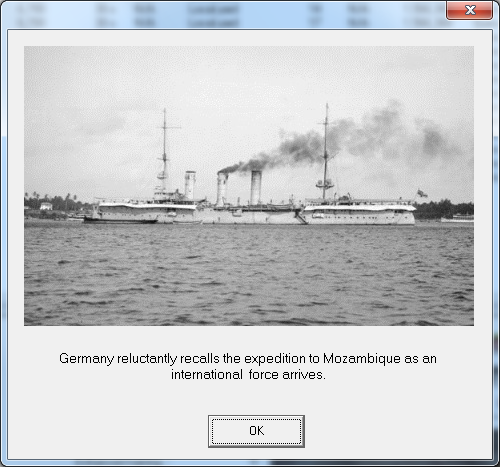
But they refused to withdraw the troops from northern Mozambique, insisting on the partial occupation as a "buffer" to resist incursions into Tanganyika.
On May 3rd, Asquith presented the situation to Parliament. The German intransigence was given a harsh, unfairly so, light, depicted as a land grab like the takeover of Sumatra in 1910. Fearful of growing German power, the Parliament voted by a majority to approve war powers to the Government and to declare war if Germany had not started a withdrawal by the 5th.
Upon receipt of this news in Cascadia, the Cascadian fleet was ordered to prepare for deployment. Recriminations immediately began against Admiral Garrett in the Parliament, with the Conservatives accusing the Admiral of failing to appreciate the situation by not deploying the fleet days before.
The Socialists and Dove Democrats made a fierce attempt in the House to reject any commitment to a declaration of war. "We should not go to war to support British interests in Africa," declared Socialist Rep. Carl Matthews of Vancouver. But with their minority, there was no chance to stop it if the Liberals remained intact. Which they did, as the British alliance was considered too important to abandon whatever one thought of the war.
Lakeland smoothed things over in his address to the House on the 5th of May, observing that "we shall not require a massive army for a war that will be primarily fought on the oceans of the world". The fear of sending more young Cascadian men to be slaughtered in trenches could not act as a break upon the course.
In Berlin, the moment of truth had arrived. And the German government was defiant. Their Navy was outnumbered, but the British worldwide commitment and what was presumed would be a selfish Cascadian devotion to invading German possessions with naval superiority was seen as a counterbalance to thwart any blockade of Germany. And German raiders could savage the British and Cascadian merchant marines until those nations were forced to make peace with Germany.
Late on the 5th, the German Ambassadors to London and Portland asked for their passports. The signal was clear.
With the deadline passed and no German withdrawal from Mozambique, the British Empire declared war on Germany on May 6th. The new Republic of Portugal declared war on the same day.
It would be May 7th in Europe when Cascadia's reaction arrived on the continent. The Cascadian Republic had honored its alliance with Britain. After an angry Socialist walkout of the House, as well as Senator Flagg's lonely defiant withdrawal from the Senate, the Republic of Cascadia declared war on the German Empire.
For the third time in twelve years, the Cascadian nation was at war with Germany.
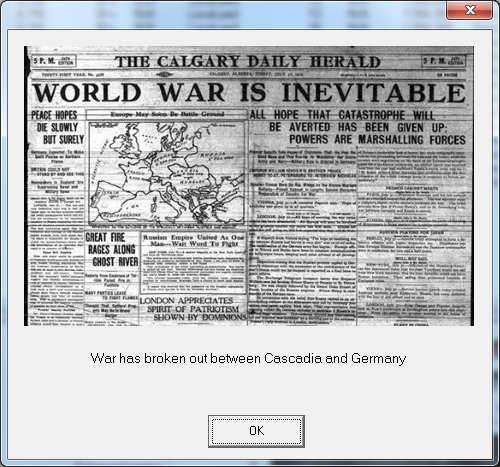
Germany delivered the first blow. Having departed Sumatra days before, when war seemed increasingly-likely, two German battlecruisers and their escorts steamed to the approaches of Manila Bay and attacked the Repulse as she patrolled the area.
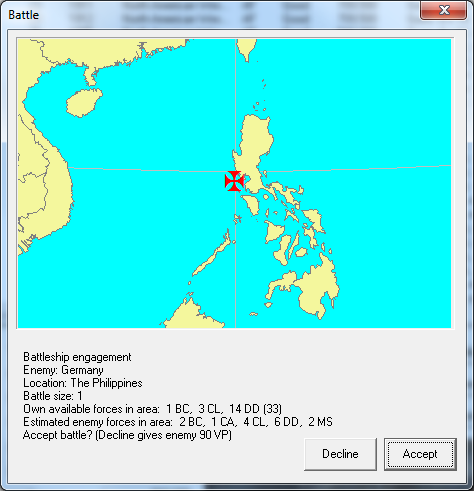
At 1748 the two sides spotted each other and began exchanging fire.
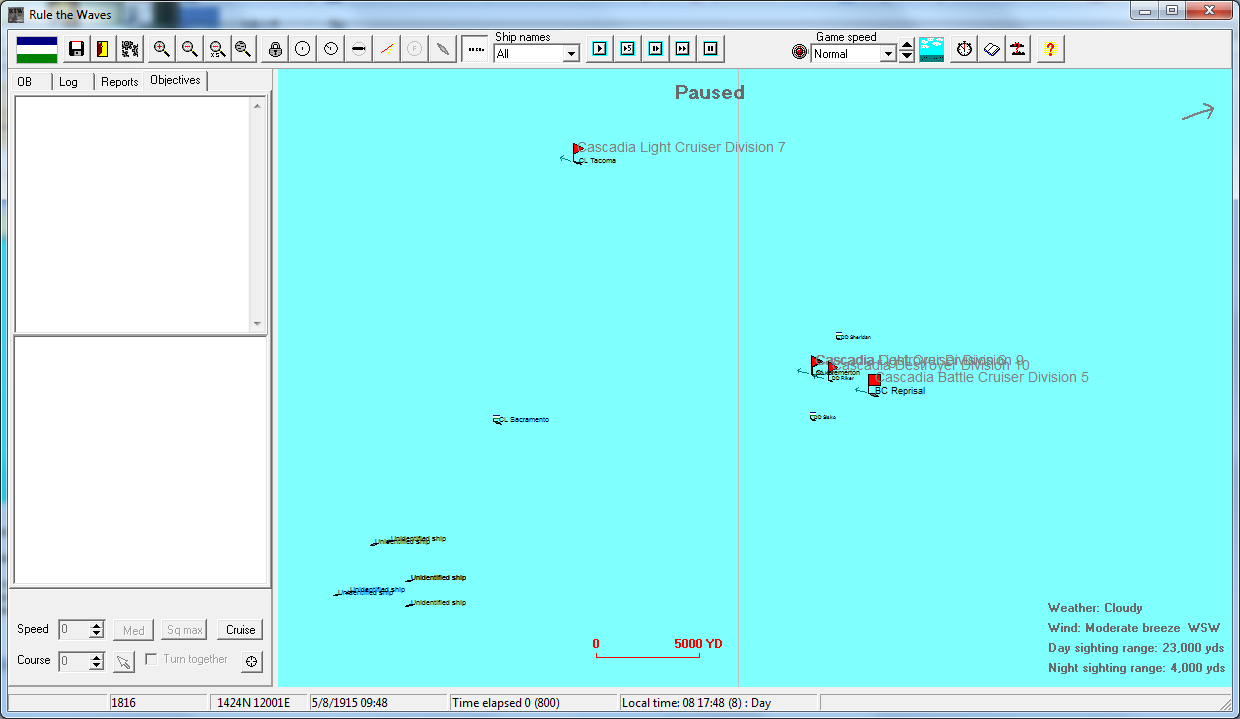
A 13" shell from Reprisal struck the German battlecruiser Thetis ten minutes later. After twilight descended the battle continued at closer range. Shortly after 1830 two shells from Thetis struck the Repulse, inflicting damage on the older battlecruiser.
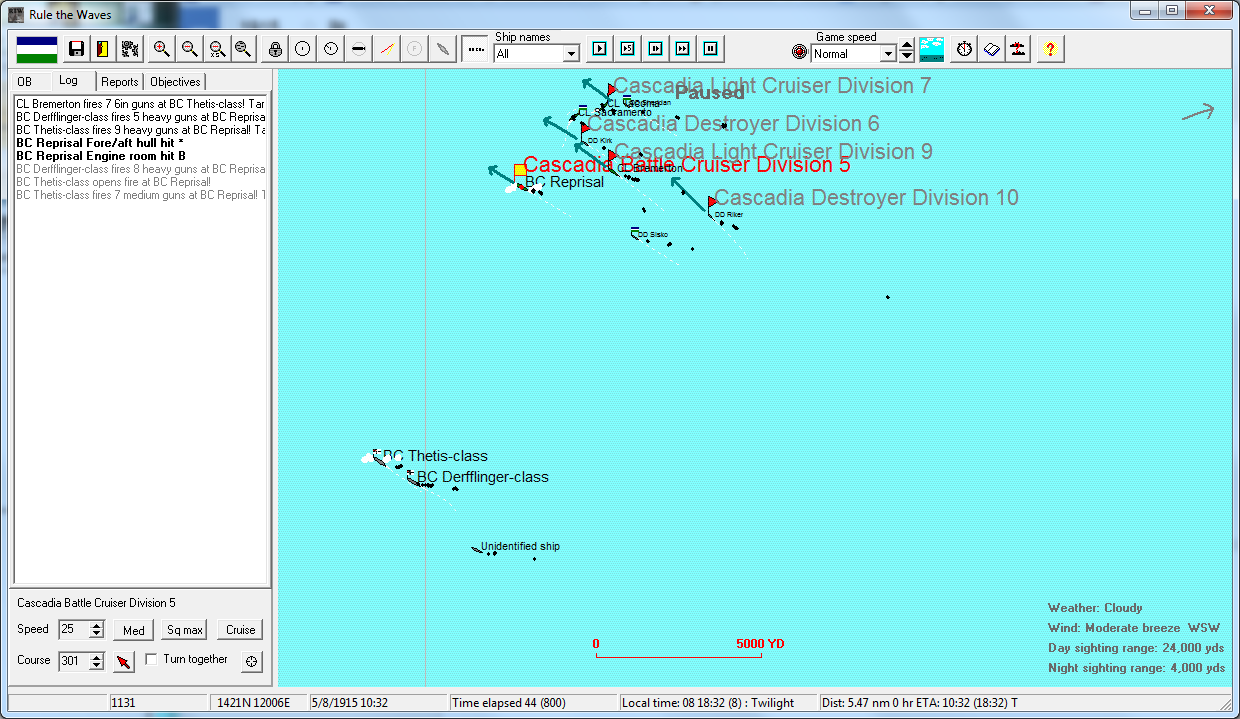
Within minutes another shell from Repulse had hit the German battlecruiser.
With the fall of night, the Repulse and her escorts broke away and returned to Manila, where they would arrive by 2100. The German ships continued to prowl the area and sank two Cascadian merchant ships near the Bay during the night, before their withdrawal the next morning.
The damage to the Repulse was more significant than had been inflicted on the newer Thetis - the battle was a tactical draw and a minor strategic victory for Germany by briefly knocking out of action Cascadia's only battlecruiser in the Southeast Asia and Central Pacific region.
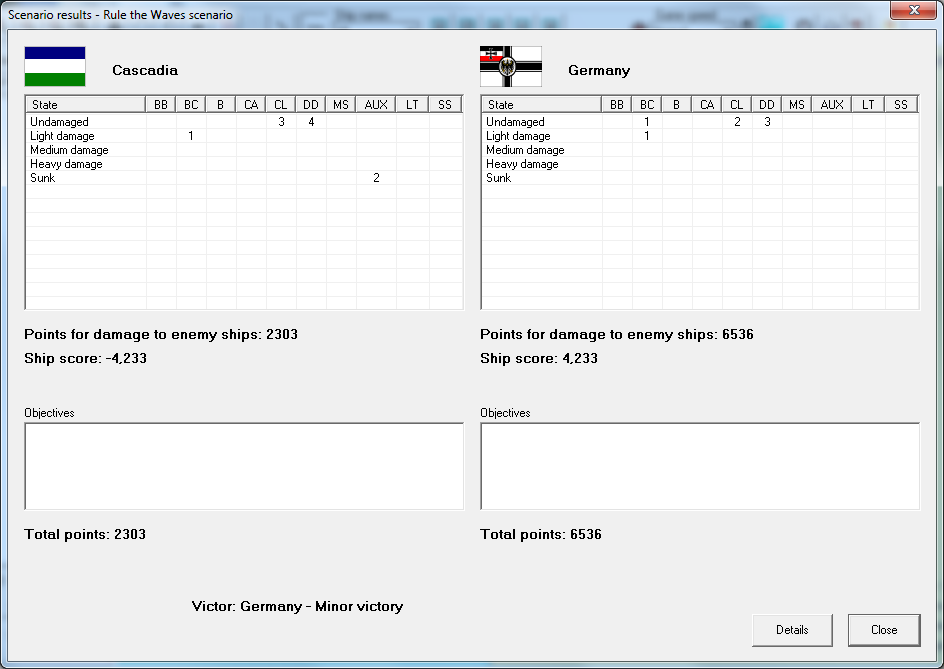
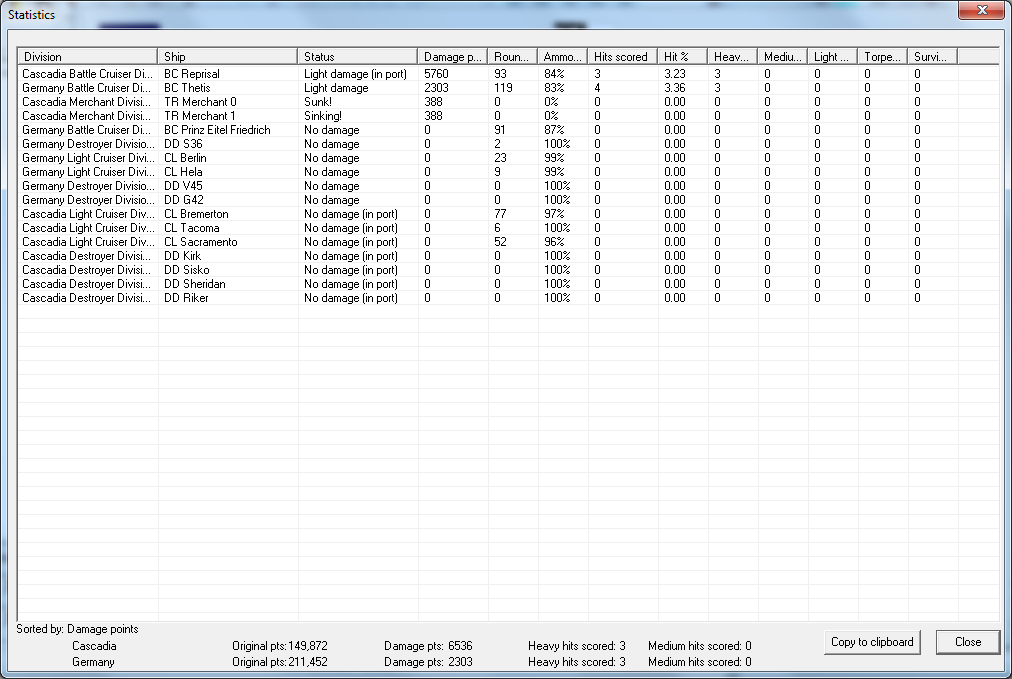
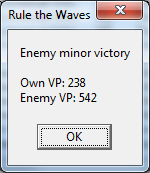
With the war underway, Admiral Garrett ordered an increase to training expenditures and methods to get the Navy ready for future actions. The fleet was promptly deployed to Manila and Chuuk to begin operations against German holdings.
London wired to Portland with a request that the Cascadian fleet ignore such operations, and that the bulk of the fleet steam across the world to Scapa Flow to join the British Home Fleet in enforcing a blockade on Germany. Admiral Garrett was sympathetic to the British proposal - a victory against Germany was more likely there than hoping to find an opening to invade German possessions. But President Lakeland was adamant that operations be attempted in the Pacific first and the Admiral obeyed.
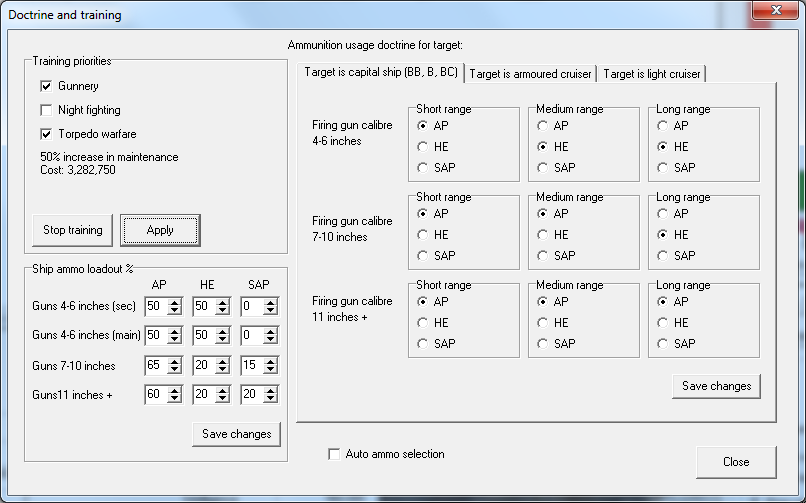
Much to the disgust of Senator Flagg, his initial attempts to foment popular dissent against the war were anemic. While some trade unions with committed pacifist or socialist leadership joined anti-war demonstrations, the relief from the need to amass an army for the trenches had removed the main issues that had fueled his movement in the prior war. Many unions voted for patriotic actions, promoting war bonds and benefits to members who volunteered for the Army or Navy.
Lakeland had learned the lessons of 1908-1910 well, and with Burgess' hearty approval, he had not expanded the army draft callups for 1915. Instead he put forward a call for army volunteers, with a set service time, to provide the manpower to launch the desired invasions of Germany's Pacific holdings while still protecting the nation's territories. This took the sting out of the war's start and reduced the risk of unrest.
Unrest to 2
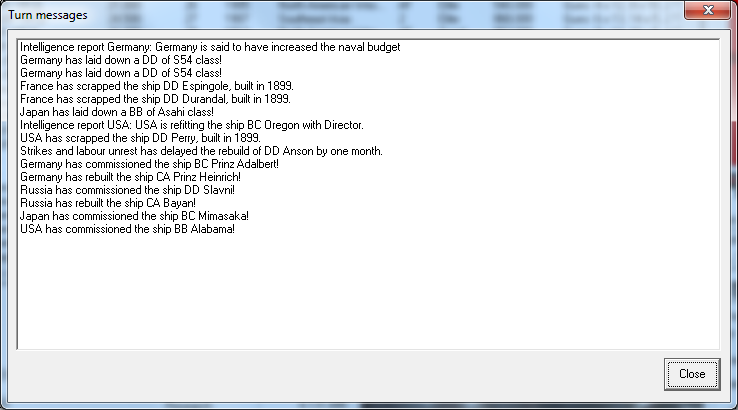
June 1915
The reconstructions of several Blake-class destroyers were completed.
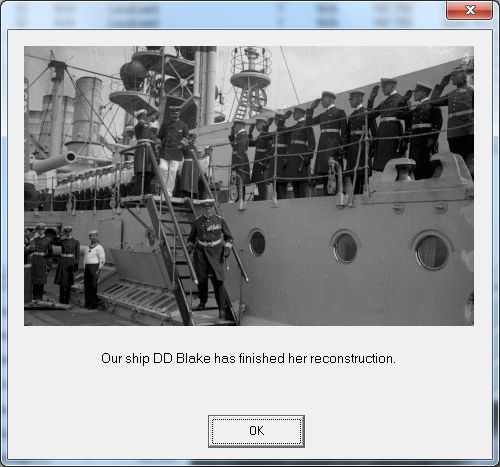
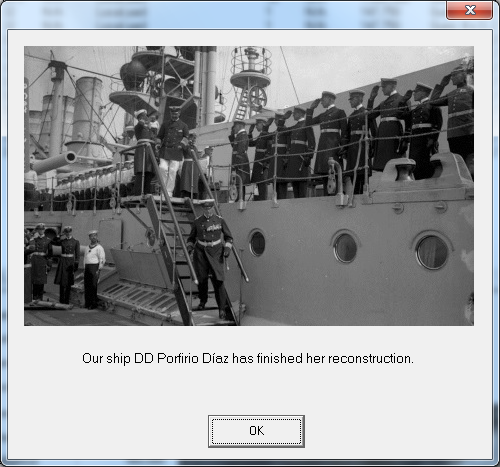
Cascadian support provided improvements to British turret technology and explosive shell manufacturing and design.

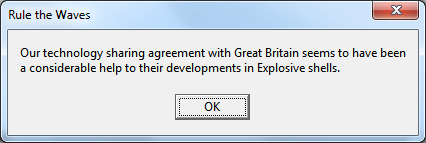
The Admiralty was presented with new 15ft rangefinders for their ships.
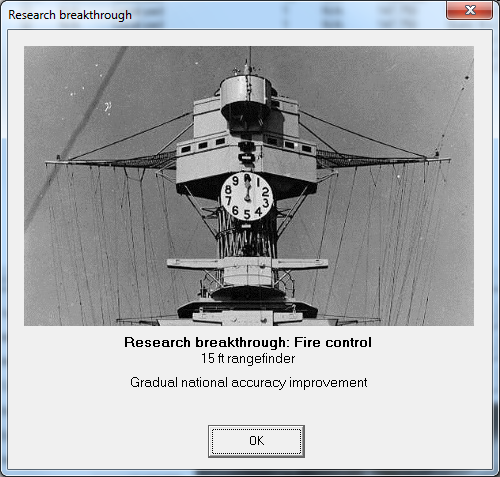
Cascadian submersibles, including the new mid-range models, sank three German merchants during the month. German raiders made up for that; the armored cruiser Victoria Louise, soon to be the terror of Cascadian merchantmen across the world, caught and sank two Cascadian ships departing Europe during the start of her outward raiding voyage. The light cruiser Amazone sank a Cascadian merchant off Java.
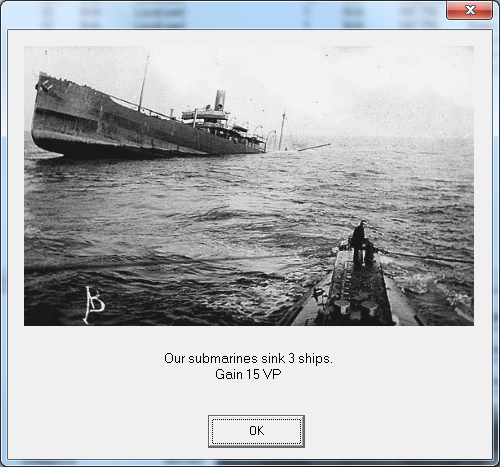
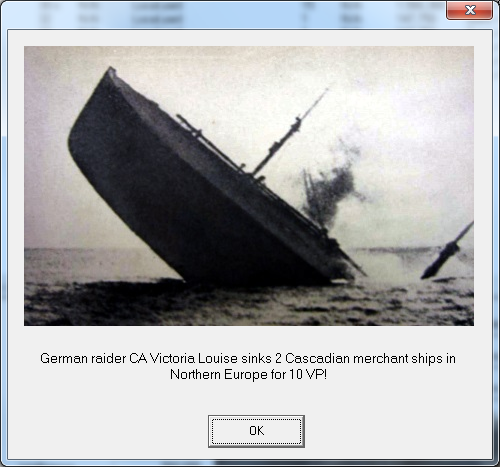
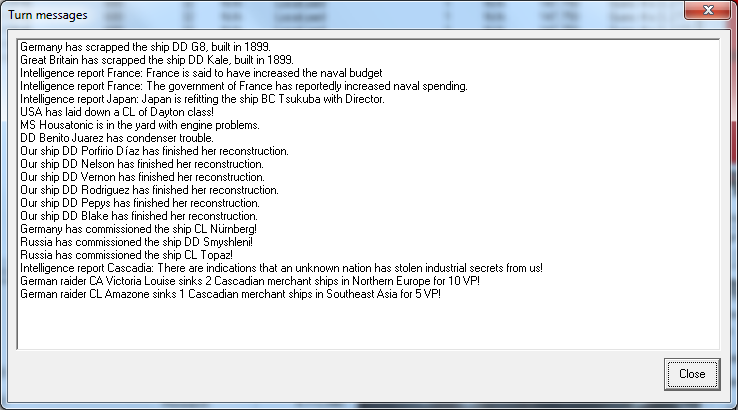
The Admiralty
Portland Federal District
3 January 1915
Naval Secretary Santiago came by for the first meeting of the new year with the high officers of the Admiralty. Tensions with Germany were casting a pall over the upcoming year, although it remained to be seen if another war would break out. The constant struggling with the European power seemed to have become part of life for the Cascadian Republic. Lakeland had made clear his own view that it would only end when Cascadia had successfully expelled the Germans from the Pacific. A prospect that, in Santiago's view, was not likely to happen easily.
Admiral Garrett directed the meeting with customary diligence. He had already sat as Chief of Naval Operations for the longest period in the nation's half century of history and the Admiralty had become his machine through and through. Santiago often got the feeling that his role was completely unnecessary in the Navy. The Admiral's long time in his post meant that many politicians in the capital knew him - he did not need the Naval Secretary to represent his interests in Parliament or the Cabinet.
Had Santiago been more ambitious about a vision for the Navy, this might have rankled. As it was, his primary concern was making sure the Navy stayed in budget and responded to the Cabinet's directives promptly.
After the meeting, he remained behind to converse with Admiral Garrett privately. "This American contract for new light guns…"
"There is potential use for 2" weapons on destroyers," Admiral Garrett remarked. "And certainly on submersibles. It is worth the money."
"I will complete the paperwork then, if you are so sure," Santiago replied. He reached into his pocket and pulled out a pack of cigarettes. "When will you re-deploy the fleet back to Manila?"
"When war appears imminent," he replied. "The Naval budget is currently spoken for elsewhere. A deployment may force me to suspend construction of our new ships. And we have need of those cruisers for our fleet."
Santiago nodded at the Admiral's assessment. "Very well." For a moment he said nothing further. "How is your wife?"
"Better," the Admiral answered. "Her health is much improved over these past months."
"She wasn't at the New Year's Celebration the President threw," Santiago explained. "I was concerned…"
"Her physician believed the winter weather was not conducive to her health," Admiral Garrett replied. "I agreed. She and Gabbie are staying at the Vallejo house in Santa Barbara until the winter is over."
"I see. And your other daughter…"
"Attending classes at the National University," he answered. "Her first year. She lives on campus during the week and visits on the weekends."
"So you are alone?"
"I am."
"My condolences. Winter in this city is gray enough as it is." Santiago stopped at the door before leaving. "I imagine you would rather be with your family."
"Yes. But duty demands I remain at my post."
"Duty. Yes. I can respect that in you, Admiral." Santiago nodded. "But you have carried the burden of duty for so long. With your wife's health as it is, I would wonder if you might be better off…"
"...is this your way of asking for me to resign, Mister Secretary?"
"No, Admiral," he replied.
"Thank you. I did not want to have miscommunication on the issue." Admiral Garrett nodded. "Is there anything else?"
"No, Admiral. Nothing. I shall see you later."
"Have a pleasant day, Mister Secretary."
Rain drizzled down from the gray clouds that dominated Portland's winter weather as always. The motor cab pulled along the rain-slick road until it stopped in front of the neighborhood townhouse as always. The Admiral gave a generous tip and fare to the Barbadian immigrant driving the cab. He unfolded his umbrella outside the door and stepped out into the cold drizzle. Thankfully it was only about twenty feet, if not less, to the covering over the front door. He closed the umbrella there and entered his home.
His quiet, empty house.
Not so empty. Mei Ling was waiting, as always, and was by his side by the time he put the umbrella away in its stand. "Welcome home, Admiral," she said, her English much improved since the day Rachel had hired her to replace Josephine. Without another word she helped him out of his great coat. "Dinner is cooking. Mrs. Lowes has a soup out for you to start with."
"Thank you," he said. "Allow me to change."
As always he went into his ground floor rooms and put his uniform in the wardrobe he kept for all of his uniforms. He changed into his house robe, a dark burgundy-colored garment that Rachel had bought for him nearly a year ago, and returned to the study. A steaming bowl of chicken soup was already laid out at his desk. He picked a book from the nearby shelf - Mahan for light reading at the moment - and went to his chair to begin sipping on the rich broth.
Normally he would be in the dining room. That was the custom for years. But there was little point now. Not unless Sophie was here for dinner, and that was usually only Friday and Saturday nights. With Rachel and Gabbie down in southern California, Thomas and his growing family living at the Vallejo estate near Mare Island, and Raffie quartered in Bremerton while the Liberty was in port, there was nobody to share a proper meal with. Mrs. Lowes was kind enough to cook dinners for him before going home to her family, and she had been doing so since Rachel took young Laurie with her to Santa Barbara, and Mei Ling would eat privately as well.
The sting of loneliness during the week had dulled over time. But it was still there. For so many years he had been used to the sounds of life in this house, to his children playing and Rachel teaching Sophie…
He thought back to what Santiago had been saying. By all standard measures he had indeed governed the Navy for longer than any other. Was it time to move on? To retire and enjoy his final years with Rachel? To have the time to check in on the grandkids? He'd given over 40 years of loyal service to his nation. Maybe it was time to retire.
He wouldn't have an answer to that by the end of the day, certainly. But it was a thought to consider. For the future.
(Apologies, I had an error due to having SWTOR on in the background, the screenshots of buying the improved 2" guns didn't work.)
February 1915
The Admiralty
Portland, Federal District
4 February 1915
Rear Admiral James Hawke was the newest admiral in the Navy. His position with Naval Intelligence, specifically the Security Office, had been made official upon his promotion to Captaincy, and now he was in charge of foreign field operations for Naval Intelligence.
A group of lieutenants were clustered around the desk while he stood off, waiting for the response to come. He had already anticipated it.
"No. No, this is too risky." Admiral Garrett thumped the papers in front of him laying out the operational plan.
Said plan? To utilize the contacts Cascadian Naval Intelligence had established in Germany's Pacific fleet ports to launch a sabotage mission. The goal would be to blow up a German battlecruiser in port.
"I can guarantee you we can…."
Before Lieutenant Commander Osbourne could finish, Admiral Garrett cut him off fiercely. "I won't hear of it!", he shouted. "Even if you succeed, it would simply guarantee a new war! And our nation would again be seen as the instigator! The answer is final!"
The officer were dejected - and indignant - as they filed out. "That was rather harsh," Hawke pointed out to his superior.
"Harshness is deserved for such mindless ambition," the Admiral growled. "The little fools. They underestimate the Germans."
"They do, yes." Hawke nodded. "But ambition can be useful when properly re-directed."
"I'll leave it to you, Admiral Hawke, to best re-direct them. I've little patience for these games myself."
"Yes sir." Upon departing the intelligence man sighed. The CNO was a visionary when it came to embracing new warship concepts, but his grasp of how useful intelligence work could be never seemed to go beyond acquiring enemy design plans. With a little tweaking, the bombing plan might yet be feasible...

New gyroscopes for Cascadian torpedoes have been implemented after close work with British torpedo manufacturers.



March 1915
After months of disorder, peace is restored to the island of Bermuda. General amnesties are declared for many of those caught up in the riots, while ringleaders are incarcerated elsewhere in the British Empire.

Naval Artillery reported that their design teams had put together a workable model for quadruple turrets. While an intriguing advance, the Admiralty did not commit to using the turret layout on any planned ships.
A proposal was made that the next class of destroyer would be built with super-imposed guns, allowing a reduction in the number of guns mounted on the new class without reducing effective firepower.




April 1915
Due to a decline in private orders and the loss of an expected contract from China, Moran Brothers offered a discount on another Vancouver-class cruiser. The Admiralty, upon review of the budget, decided it would fit within the year's budget and accepted the offer, naming the vessel Seattle.

Called upon by the Navy League to give a speech, Admiral Garrett laid out his views on the ongoing tensions in the world. During the speech he gave his impression of the threat Germany still posed to Cascadian interests whether or not the two were in hostilities. "The conquest of Sumatra is a dagger pointed at the throat of Cascadian trade in Southeast Asia," as the Admiral laid out that the Germans' ability to threaten the shipping through the Strait of Malacca was severe to Cascadian trade. President Lakeland was quick to second the Admiral's opinion.
When news of the speech reached Germany, the result was a new wave of anti-Cascadian fulminations in German newspapers. The German press were quick to exploit the remarks as proof of Cascadia's "reckless hatred of the German Empire and disregard for its rights". A number of German conservative politicians insisted that the nation reconsider the matter of Samoa.

German tension up to 10
A report from Naval Artillery indicated progress in a new 15ft rangefinder for ire control systems.


New wires from Mozambique indicated a new upsurge in rebel activity exploiting the political instability in Portugal following the fall of the monarchy and creation of the Portuguese Republic. Several armed groups were attacking government targets and threatening European interests in the colony.
The German consul in Lourenço Marques issued a state to the Portuguese colonial authorities, insisting that Portugal do more to keep the rebels out of German East Africa. When the Portuguese government failed to post more forces in the north, the German authorities in that colony began shifting troops to the south. In Berlin the Reichstag was asked to consider funding to purchase the colony from Portugal.
News of this reached London. The British had a long-standing treaty with Portugal and issued a statement supporting continued Portuguese rule in Mozambique. British squadrons in the area were wired orders to patrol off the coast and prevent any German attempts to enter the colony. Asquith's government approached Ambassador Armstrong and informed him of the situation. Cascadian commitment to the defense of Mozambique was requested.
In Portland, Lakeland was quick to support the idea. Burgess was more circumspect, fearing the situation would spiral, but Muniz won him over in the Cabinet debates on the issue. On April 27th, the Cascadian government agreed to support Britain in thwarting any German designs in Mozambique.
With the situation as it was, Admiral Garrett contemplated a deployment of the fleet. But such an order would undoubtedly heighten the crisis and prompt Germany to feel cornered. It seemed more circumspect to not change fleet readiness and deployments for the moment and therefore not spook the Germans.
This decision was a controversial one, to be certain, given what later happened. It was one of the acts the Admiral would be most bitterly criticized for. It would be left to future historians to demonstrate that, with the facts on hand, his decision was a realistic choice to prevent war, not simply a "naive" choice to avoid a war that couldn't be stopped.
He had other things on his mind, however.
The Garrett House
West Portland, Oregon
23 April 1915
Two weeks.
Two weeks his family had been home - Rachel and Gabbie back from Santa Barbara, Sophie still around for the weekends - and everything had been fine.
Now it was the afternoon and Admiral Garrett, in house robe, was carrying the tray with their dinners to Rachel in her sickbed. It might have been the late spurt of cold rain, one last blast of the usual wet season, but she was again in bed with a bronchitis that the doctors worried was becoming pneumonia. Rachel had become pale again and he could hear the wheezing in her struggle to take complete breaths. "Here, my dear," he said. The steaming soups and stews Laurie had cooked were made to help with her health. And his own, frankly. He set the bed tray in her lap.
"Thank you de-." A coughing fit interrupted her sentence. He held up the handkerchief for her to cough into. Horrid mucus came out with the coughs. It clearly brought her pain, so he used his free hand to take hers. When the coughing was over she smiled weakly at him.
In the past two years, Rachel's hair had begun to whiten. And at an alarming rate. It was as if all of the emotional turmoils of the past half-decade - Thomas' mutilation in the last war, her father's death, the stress of raising Gabbie as their last child reached adolescence - were sapping the vitality from her.
"Perhaps you should take to the waters at Pagosa again?", he ventured. "They did wonders for you last summer."
"You wish to see me leave home again, my dear?", she asked. A bit of her old fire showed. She was teasing him. "You enjoy living the bachelor life?"
"No. God no." He shook his head. "I lived for the weekends and Sophie coming home. This house is too empty without you and Gabbie, Rachel." He kissed her on the forehead before partaking of his own bowl of soup. After swallowing it he added, "I merely worry about your health."
"I will go if you go too," she said. "Otherwise, I am tired of being apart from you, and I will stay."
His expression darkened. "If things were otherwise, I would inform the Admiralty that I was taking a leave. But this situation in East Africa has everyone on edge. The Kaiser is in one of his moods again, it seems. Or he has lost control of his expansionist clique."
Rachel frowned deeply. "Mother of God preserve us… it has not yet been five years since the peace. Are we to go to war again? Must Thomas lose the other eye?"
"No. No, I don't…" The Admiral sighed. "It may be nothing. Our relations with Germany are soured again, yes, but it needn't come to war. The Germans know that a renewed war will see our fleet and the Royal Navy shut them up in the North Sea. We will cut off their trade and their economy will crumble. That has to bring restraint to the policymakers in Berlin."
"If there is war, then it will be Raffie…" Rachel shook her head. "I have nearly lost one son to conflict. Must the other be risked?"
"It was his choice, dear. His choice to be in the Navy."
"I know. I… simply worry. I…"
Before she could take another bite, another coughing fit began. He helped her with it. After about fifteen seconds it subsided and she took a pained breath.
After a couple more spoonfuls of the hearty broth before them, Rachel spoke up. "You have been in the Admiralty for fifteen years," she said. "And you have led the Navy for most of them."
"Yes." He knew where the talk was going now.
"Stephen, haven't you served long enough. You have grown white-haired in the service of our nation. Isn't it time for someone else to take up that burden? You could retire. We could live at the family home and be with our grandchildren. Visit with your family in the summers and retire to Santa Barbara in the winters. We have so little time left, I wish we could spend it together…"
He listened to her speak and found himself in agreement. He felt worn and weary from the years of service, of meetings and political arguments and finessing the naval budget and all other things. Retirement had an appeal to him that could not be ignored.
But duty wouldn't let go. Not yet. Not in this situation. "If not for this Mozambique crisis, I would say yes, and seek to resign before the year was out," he admitted. "But the crisis as it stands must be dealt with. I can't afford to leave the Admiralty in a search for new leadership with war on the horizon."
Rachel nodded. Her disappointment was met only by her understanding. "I know," she said. "And that is why I love you so."
"And I you." He smiled at her.
And he made a resolution to himself. As much as he appreciated his duty, as much as he still enjoyed getting to mold the Cascadian Navy into the image he desired for it… he would give it all up to spend their last years together.
If nothing happened before the end of the year, he would retire.
Seven days later, Germany invaded Mozambique.
May 1915
At the end of April, German colonial troops marched into Portuguese Mozambique.
The ongoing upheavals in that colony had threatened to spill over the borders. German colonial authorities claimed to have discovered that the rebels in Portuguese territory were trying to foment a rebellion in Tanganyika. They wired to Berlin repeatedly, requesting permission to enter Mozambique to pursue the rebels.
In Berlin, there was a hope that a limited operation would avoid setting off the British. The Kaiser approved the operation with standard bombast, however, and as the reports came in German mood hardened. The Portuguese had clearly lost control in that distant African colony and they could not guarantee the safety of other Europeans. It was time for Germany to impose order in Southeast Africa. They would appeal to the opinion of Europe to restrain Britain and Cascadia.
If that did not work, then Germany had her growing submersible force and raiding cruisers to scour the British and Cascadian merchant marine from the seas. It was believed that only a union of the British and Cascadian fleets in the North Sea could effectively blockade Germany, but the land-hungry Cascadians would never deploy the majority of their fleet to thankless blockading when they could grabbing at Germany's Pacific colonies.
In retrospect, many would say that the Germans had simply lost patience. Years of being stung repeatedly by the upstart Cascadians, now joined with Britain and its efforts to curtail Germany, had left the German people frustrated and angry. And they were ready for a fight.
On April 30th, German colonial forces crossed the border. The German Indian Ocean squadron moved along the coast to support them and to land troops in Inhambane to secure the northern port.
Word reached London by way of the British consul, who was informed by the Portuguese. The Asquith Government immediately issued a demand that Germany withdraw. The Cascadian government echoed the demand.
The May Day Demand polarized opinion in Berlin. The SDP, preparing for their marches torn between pacifists who opposed a war and those willing to support the effort. In the end, this split defeated the best change of the Reichstag intervening to force a backdown.
In Portland, Muniz proposed that an international force be assembled, with Britian in the lead. Several French and Russian ships joined up with the British to do just that, forcing the Germans to turn back.


But they refused to withdraw the troops from northern Mozambique, insisting on the partial occupation as a "buffer" to resist incursions into Tanganyika.
On May 3rd, Asquith presented the situation to Parliament. The German intransigence was given a harsh, unfairly so, light, depicted as a land grab like the takeover of Sumatra in 1910. Fearful of growing German power, the Parliament voted by a majority to approve war powers to the Government and to declare war if Germany had not started a withdrawal by the 5th.
Upon receipt of this news in Cascadia, the Cascadian fleet was ordered to prepare for deployment. Recriminations immediately began against Admiral Garrett in the Parliament, with the Conservatives accusing the Admiral of failing to appreciate the situation by not deploying the fleet days before.
The Socialists and Dove Democrats made a fierce attempt in the House to reject any commitment to a declaration of war. "We should not go to war to support British interests in Africa," declared Socialist Rep. Carl Matthews of Vancouver. But with their minority, there was no chance to stop it if the Liberals remained intact. Which they did, as the British alliance was considered too important to abandon whatever one thought of the war.
Lakeland smoothed things over in his address to the House on the 5th of May, observing that "we shall not require a massive army for a war that will be primarily fought on the oceans of the world". The fear of sending more young Cascadian men to be slaughtered in trenches could not act as a break upon the course.
In Berlin, the moment of truth had arrived. And the German government was defiant. Their Navy was outnumbered, but the British worldwide commitment and what was presumed would be a selfish Cascadian devotion to invading German possessions with naval superiority was seen as a counterbalance to thwart any blockade of Germany. And German raiders could savage the British and Cascadian merchant marines until those nations were forced to make peace with Germany.
Late on the 5th, the German Ambassadors to London and Portland asked for their passports. The signal was clear.
With the deadline passed and no German withdrawal from Mozambique, the British Empire declared war on Germany on May 6th. The new Republic of Portugal declared war on the same day.
It would be May 7th in Europe when Cascadia's reaction arrived on the continent. The Cascadian Republic had honored its alliance with Britain. After an angry Socialist walkout of the House, as well as Senator Flagg's lonely defiant withdrawal from the Senate, the Republic of Cascadia declared war on the German Empire.
For the third time in twelve years, the Cascadian nation was at war with Germany.

Germany delivered the first blow. Having departed Sumatra days before, when war seemed increasingly-likely, two German battlecruisers and their escorts steamed to the approaches of Manila Bay and attacked the Repulse as she patrolled the area.

At 1748 the two sides spotted each other and began exchanging fire.

A 13" shell from Reprisal struck the German battlecruiser Thetis ten minutes later. After twilight descended the battle continued at closer range. Shortly after 1830 two shells from Thetis struck the Repulse, inflicting damage on the older battlecruiser.

Within minutes another shell from Repulse had hit the German battlecruiser.
With the fall of night, the Repulse and her escorts broke away and returned to Manila, where they would arrive by 2100. The German ships continued to prowl the area and sank two Cascadian merchant ships near the Bay during the night, before their withdrawal the next morning.
The damage to the Repulse was more significant than had been inflicted on the newer Thetis - the battle was a tactical draw and a minor strategic victory for Germany by briefly knocking out of action Cascadia's only battlecruiser in the Southeast Asia and Central Pacific region.



With the war underway, Admiral Garrett ordered an increase to training expenditures and methods to get the Navy ready for future actions. The fleet was promptly deployed to Manila and Chuuk to begin operations against German holdings.
London wired to Portland with a request that the Cascadian fleet ignore such operations, and that the bulk of the fleet steam across the world to Scapa Flow to join the British Home Fleet in enforcing a blockade on Germany. Admiral Garrett was sympathetic to the British proposal - a victory against Germany was more likely there than hoping to find an opening to invade German possessions. But President Lakeland was adamant that operations be attempted in the Pacific first and the Admiral obeyed.

Much to the disgust of Senator Flagg, his initial attempts to foment popular dissent against the war were anemic. While some trade unions with committed pacifist or socialist leadership joined anti-war demonstrations, the relief from the need to amass an army for the trenches had removed the main issues that had fueled his movement in the prior war. Many unions voted for patriotic actions, promoting war bonds and benefits to members who volunteered for the Army or Navy.
Lakeland had learned the lessons of 1908-1910 well, and with Burgess' hearty approval, he had not expanded the army draft callups for 1915. Instead he put forward a call for army volunteers, with a set service time, to provide the manpower to launch the desired invasions of Germany's Pacific holdings while still protecting the nation's territories. This took the sting out of the war's start and reduced the risk of unrest.
Unrest to 2

June 1915
The reconstructions of several Blake-class destroyers were completed.


Cascadian support provided improvements to British turret technology and explosive shell manufacturing and design.


The Admiralty was presented with new 15ft rangefinders for their ships.

Cascadian submersibles, including the new mid-range models, sank three German merchants during the month. German raiders made up for that; the armored cruiser Victoria Louise, soon to be the terror of Cascadian merchantmen across the world, caught and sank two Cascadian ships departing Europe during the start of her outward raiding voyage. The light cruiser Amazone sank a Cascadian merchant off Java.



”A Radical is a man with both feet planted firmly in the air.” – Franklin Delano Roosevelt
"No folly is more costly than the folly of intolerant idealism." - Sir Winston L. S. Churchill, Princips Britannia
American Conservatism is about the exercise of personal responsibility without state interference in the lives of the citizenry..... unless, of course, it involves using the bludgeon of state power to suppress things Conservatives do not like.
DONALD J. TRUMP IS A SEDITIOUS TRAITOR AND MUST BE IMPEACHED
"No folly is more costly than the folly of intolerant idealism." - Sir Winston L. S. Churchill, Princips Britannia
American Conservatism is about the exercise of personal responsibility without state interference in the lives of the citizenry..... unless, of course, it involves using the bludgeon of state power to suppress things Conservatives do not like.
DONALD J. TRUMP IS A SEDITIOUS TRAITOR AND MUST BE IMPEACHED
Re: Let's Play "Rule The Waves" w/ Steve's Custom Country "Cascadia"
Warning: long-ass post incoming.
July 1915
The Warrior's condensor broke down as the ship attempted to leave Tsingtao. The battlecruiser was forced to return and undergo repairs.
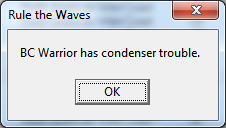
All but one of the Blake-class destroyers finished their reconstructions.
With the onset of the war, the joint tactical studies between the Cascadian Navy and the Royal Navy continued, providing improvements to the fleets' tactical capabilities.
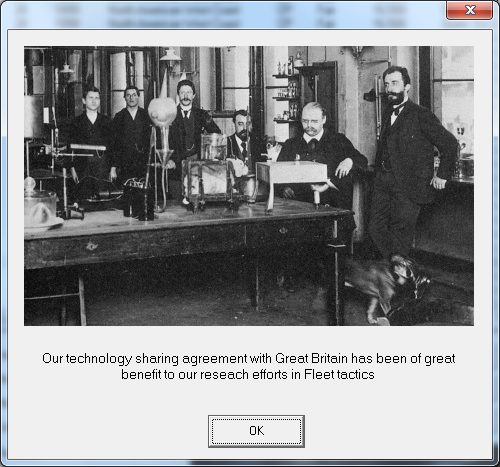
The submersible fleets continued their raiding. Six German ships were lost to Cascadian subs and the Germans managed three sinkings of Cascadian merchant ships.
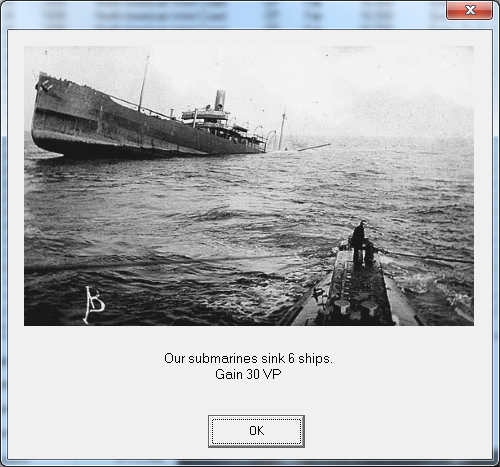
The Juneau caught and sunk a German merchant in the eastern Pacific.
The Amazone's raiding career was reported to have ended with internment in French Indochina after exhausting fuel chasing British merchantmen into Hong Kong. This would later prove incorrect.

Juneau sinks 1 in NAWC
German raider Amazone interned for lack of fuel
The Royal Navy conducted a bombardment of Dar-es-Salaam.
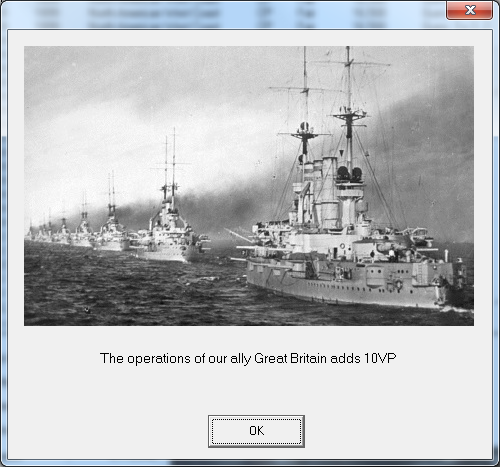
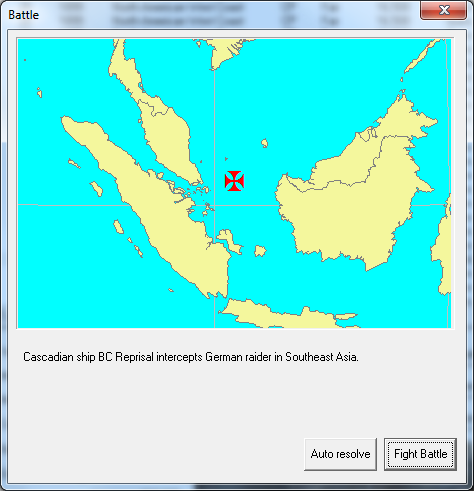
On July 22nd the Reprisal, freshly-repaired, intercepted the German cruiser Nymphe roughly 140 nautical miles east of Singapore. The German ship was sighted at 1605 local and the order was given to engage.
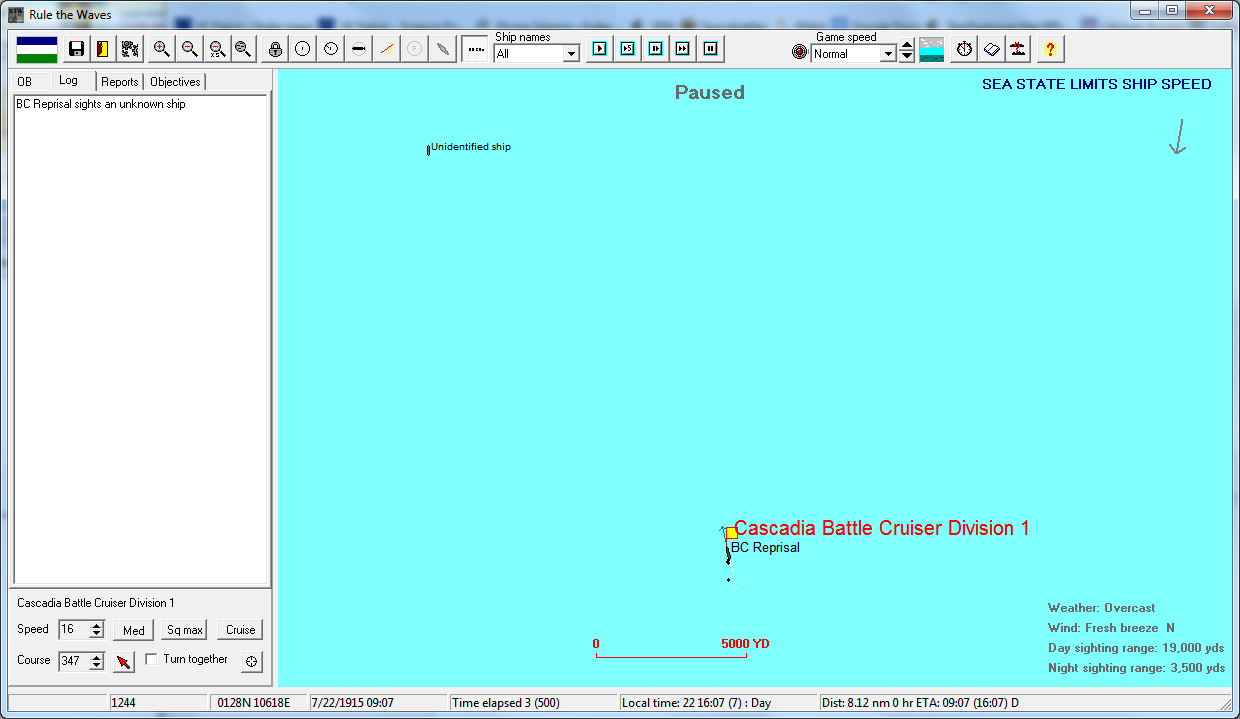
Twenty minutes of chase later the class of the enemy was identified - Gazelle-class, a protected cruiser - and the Reprisal continued to engage. She scored her first direct hit at 1639.
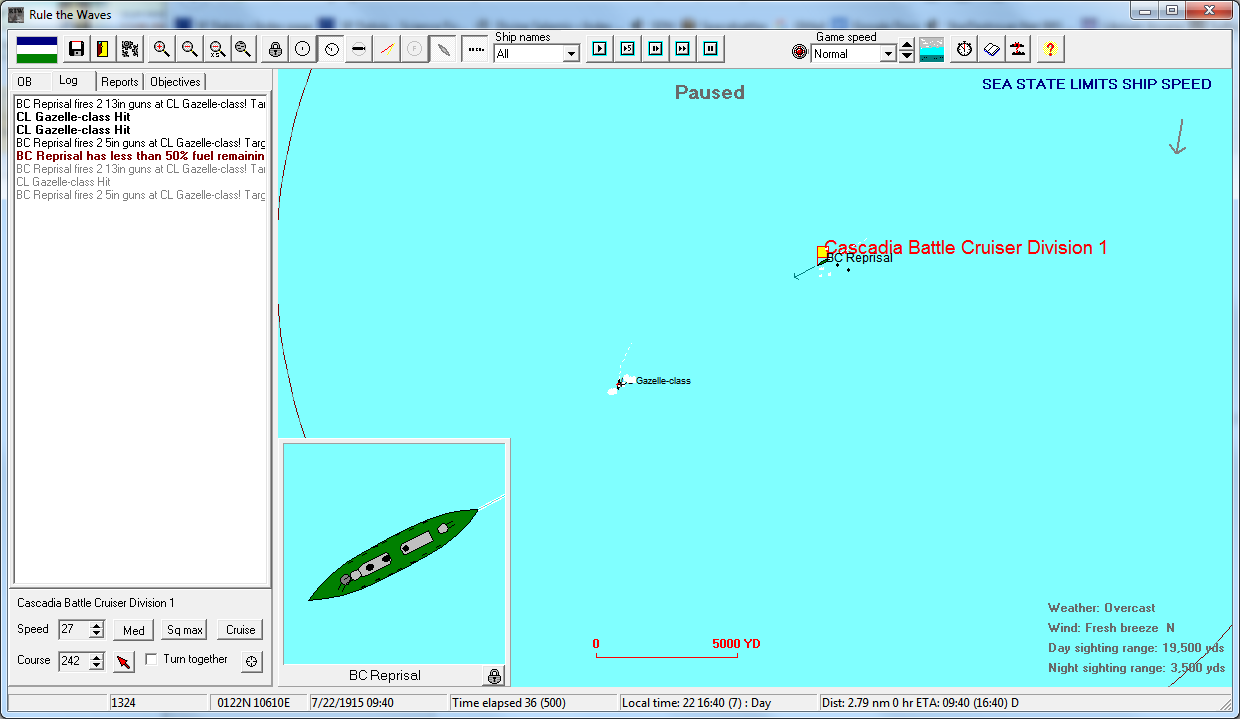
Numerous hits would be scored over the next hour. At 1702 the rudder of the Nymphe was damaged by a 5" shell from Reprisal. By the time twilight had fallen, the Nymphe was doomed. She sank to the bottom of the ocean at 1807.
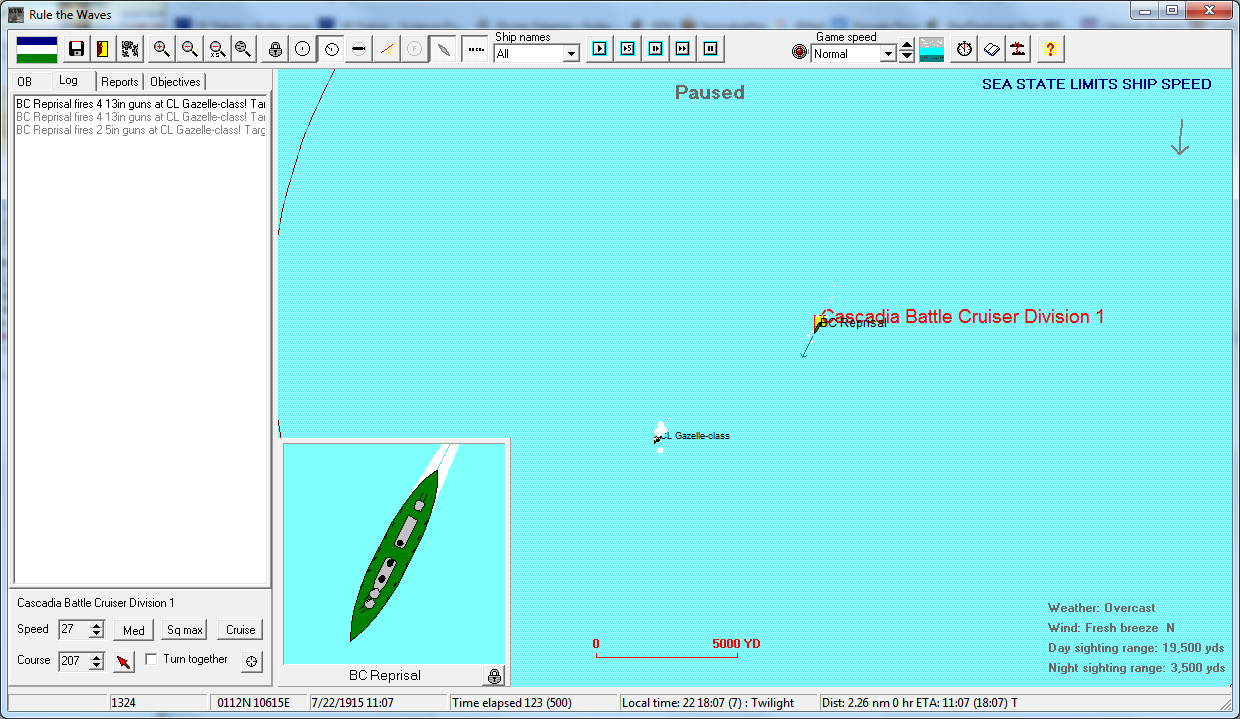
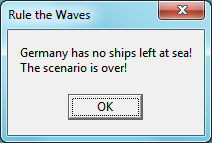
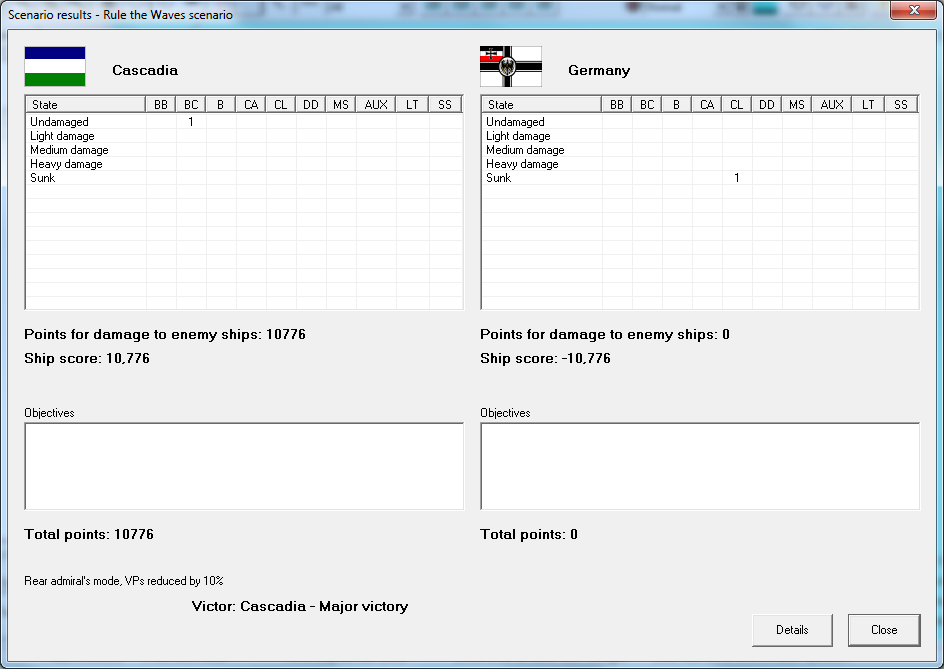
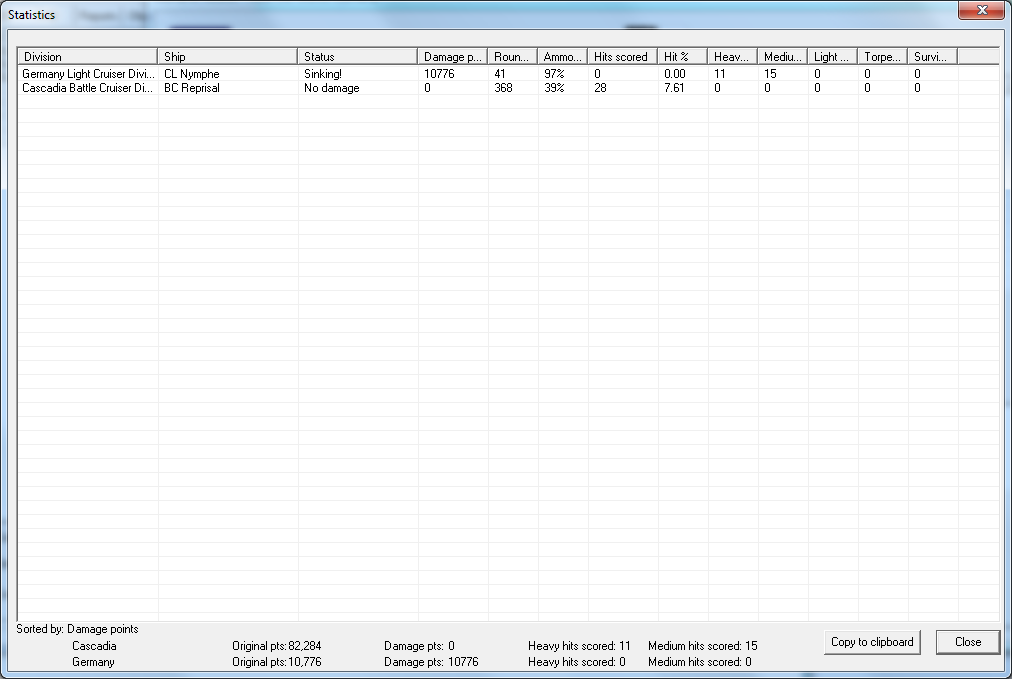
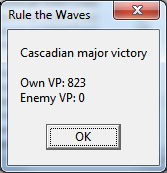
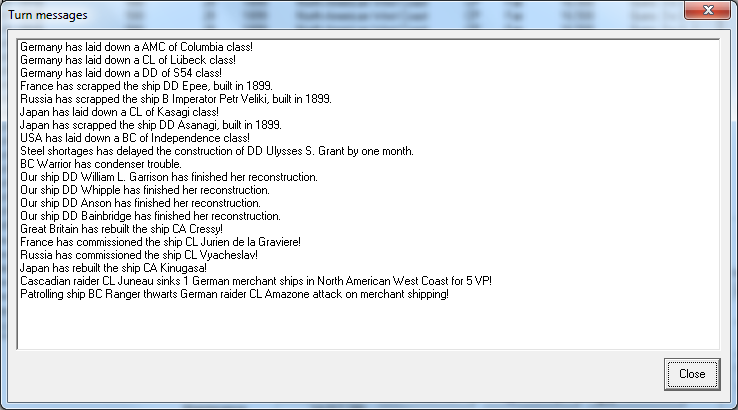
August 1915
The Cascadian submersible campaign received reinforcement with the commissioning of three new medium-range submersibles, the Mako, Hammerhead, and Barracuda.
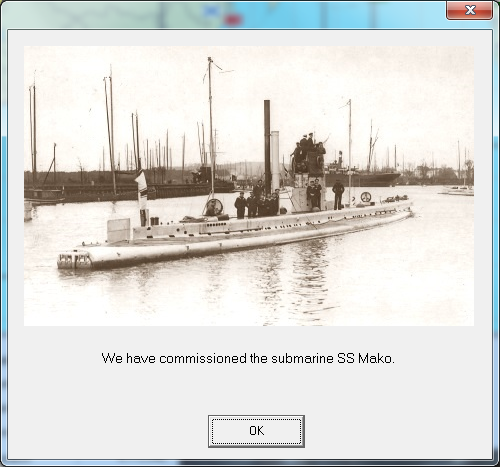
The last Blake-class DD finished reconstruction and returned to fleet service.
Grant finished reconstructed
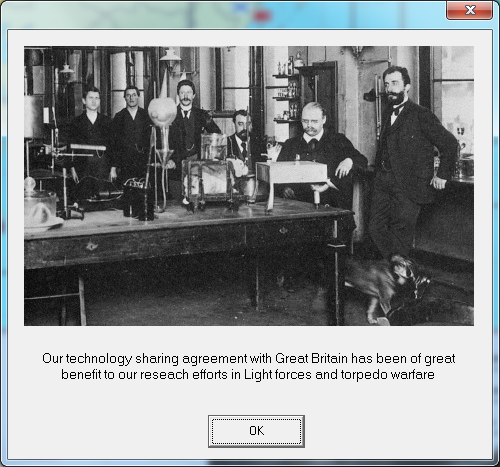
UK research helps light forces and torp warfare
Naval Artillery reported that Reilly & Colette had finished work on an improved 13" gun.
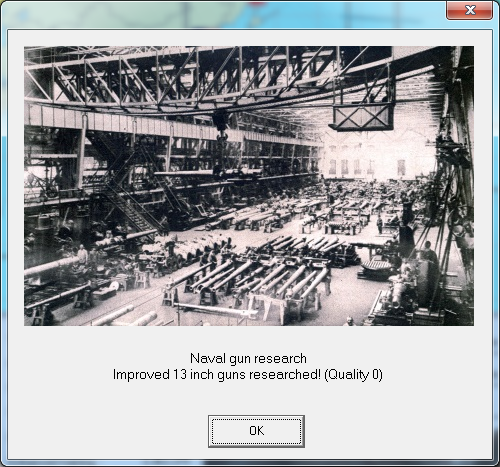
Cascadian submersibles sank 4 German merchants in the month while losing 2 of their number to German defenses. The Germans' U-boats scored 2 Cascadian kills.
The Las Vegas sank a German merchant north of New Guinea. The German cruisers Hertha and Medusa terrorized the sea lanes between Cascadia and Hawai'i, sinking 3 ships altogether in the month, while a merchant carrying rubber from the Belgian Congo was lost to the Victoria Louisa on her way to checking in on Cameroon, besieged by the British colonial forces operating out of Nigeria.
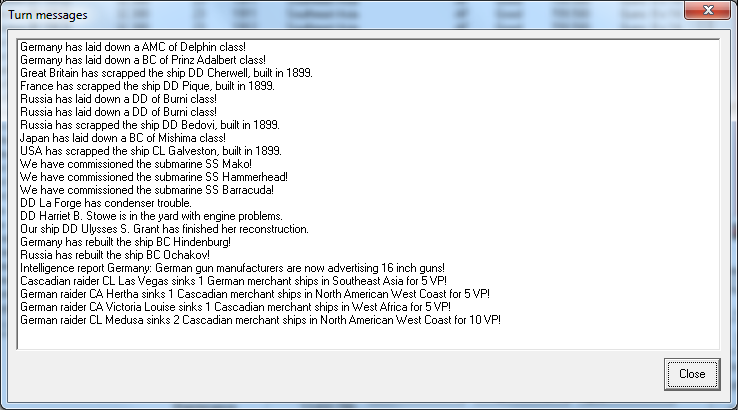
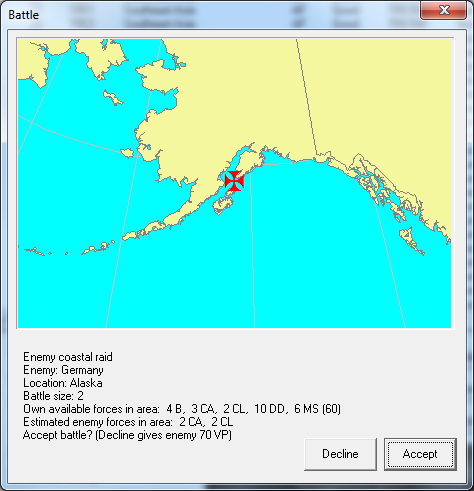
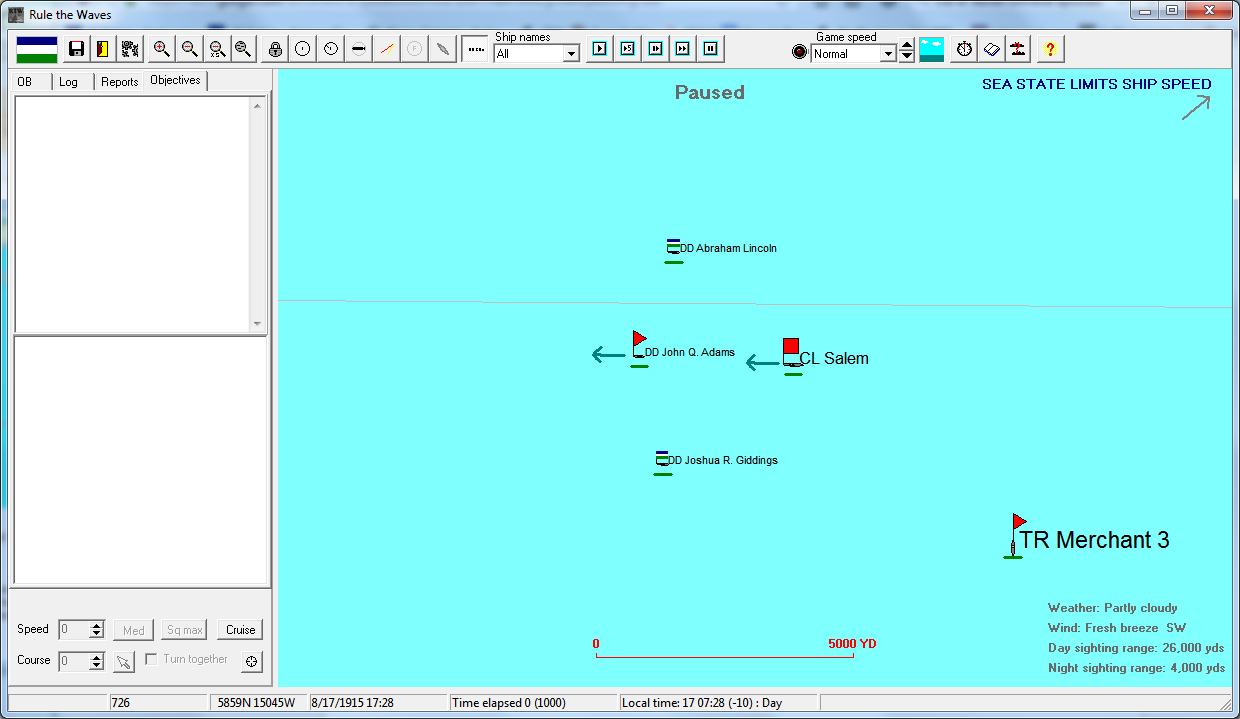
CRS John Q. Adams
South of the Kenai Peninsula, Alaskan Waters
August 1915
Commander Peter Wallace (a distant cousin to the commander of the 1st Battle Squadron and occasionally confused for said cousin) watched the heavy storm-tossed sea with frustration. A German raiding cruiser had been spotted hours ago off of Afognak Island. The CRS Salem and her escorting ships, including his own destroyer, were chasing the offending cruiser toward what looked to be one of the windiest summer storms he'd seen in the North Pacific.
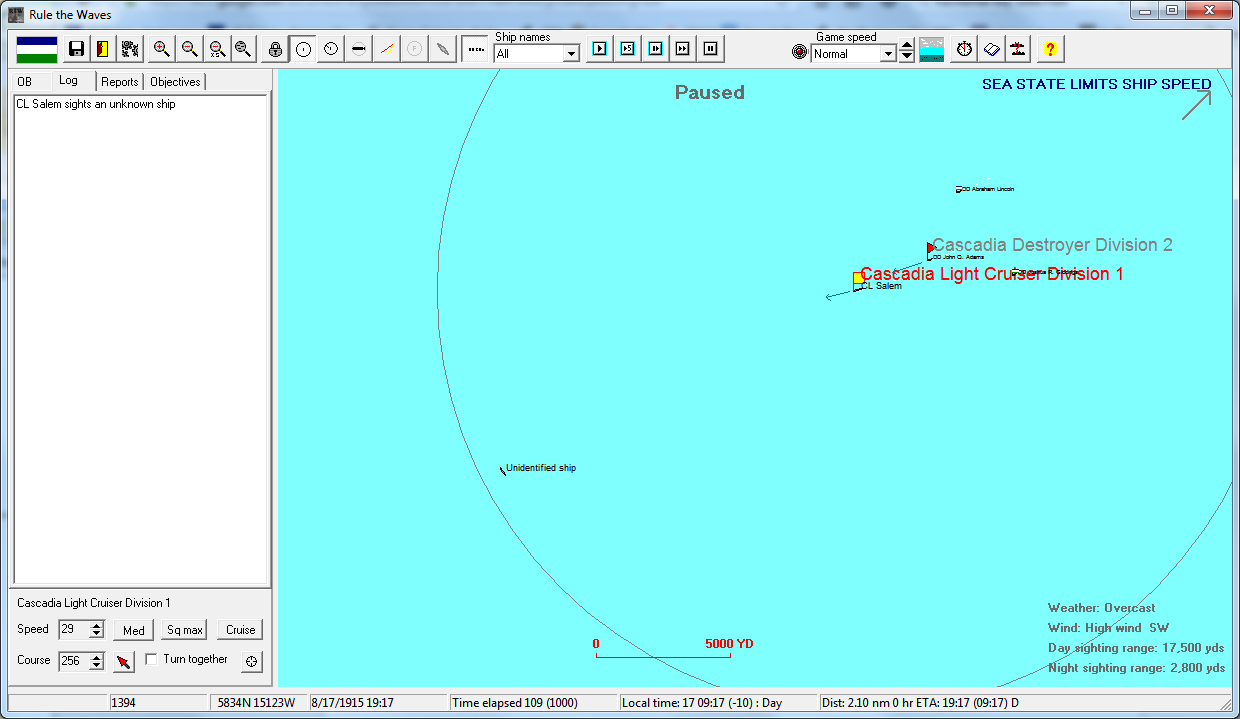
The chase had started at 0925. It was now approaching 1110. The enemy cruiser had been riddled with several shell hits but seemed to be steaming on strong. Salem still smoldered from the fire that had been set to her earlier by an enemy hit. Undoubtedly Captain Altmark was just as eager as he was to get to grips with the enemy and send them down. If they could catch them before the storm worsened…
There was a burst of flame from the damaged enemy cruiser. They were firing on their pursuers again. Wallace watched with binoculars, waiting to see if anything on the enemy was yet hit by the fire coming down on them.
There was a flash of sudden light. A thunderous roar rippled across the sea. Startled, Wallace turned his head in time…
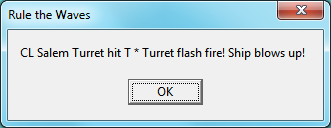
...to see what was left of the CRS Salem begin slipping into the Alaskan sea.
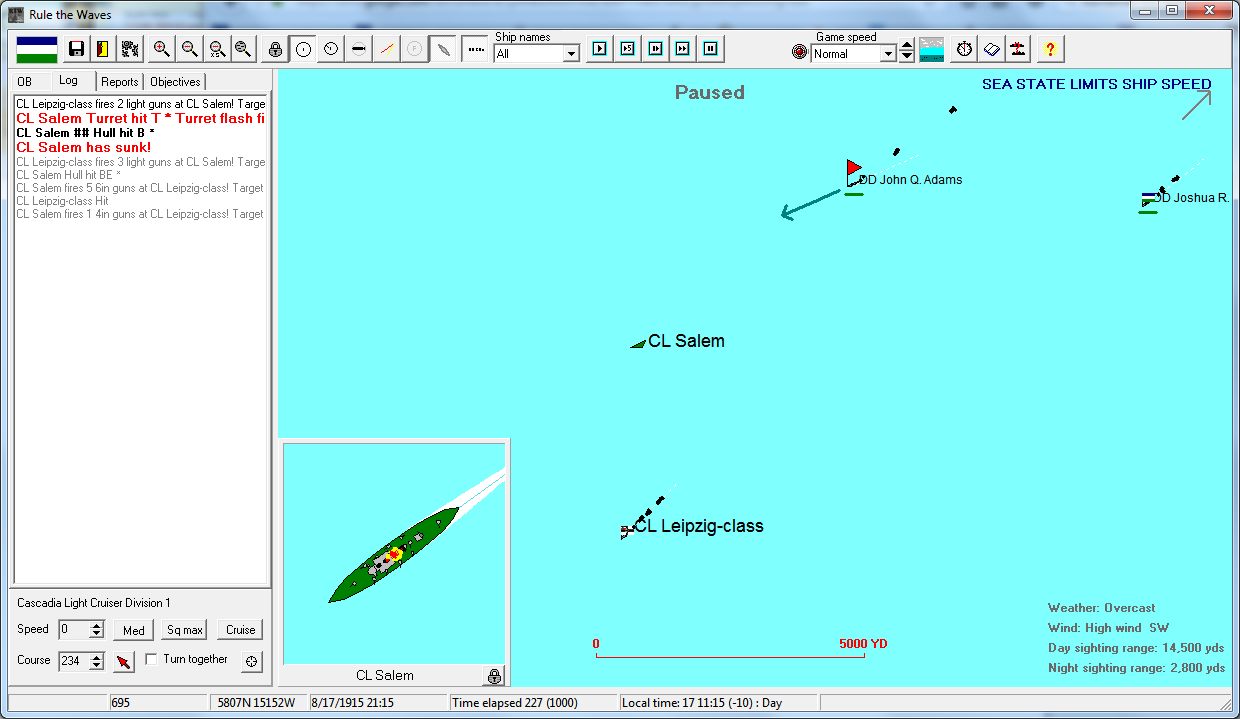
"God Almighty," he swore. The Germans must have caused a flash fire in the turret or magazine...
Then another thought came. With Altenmark dead or out of communication, he was in command of the force.
He knew immediately that he had to try and finish off the enemy cruiser. It couldn't be allowed to escape. "All ahead, flank!", he shouted. "Chase her down!"
"But the storm…"
"Dammit, man, we must catch her!", Wallace screamed.
And chase her they did, but their speed advantage was nullified by the stormy sea. Try as he might, Wallace couldn't overtake the damaged enemy ship. And the storm grew fiercer and fiercer. Just after 1400 they entered the storm proper and visibility dropped to almost nothing.
"We won't hit anything in this, sir!", Lt. Commander Gosnell insisted.
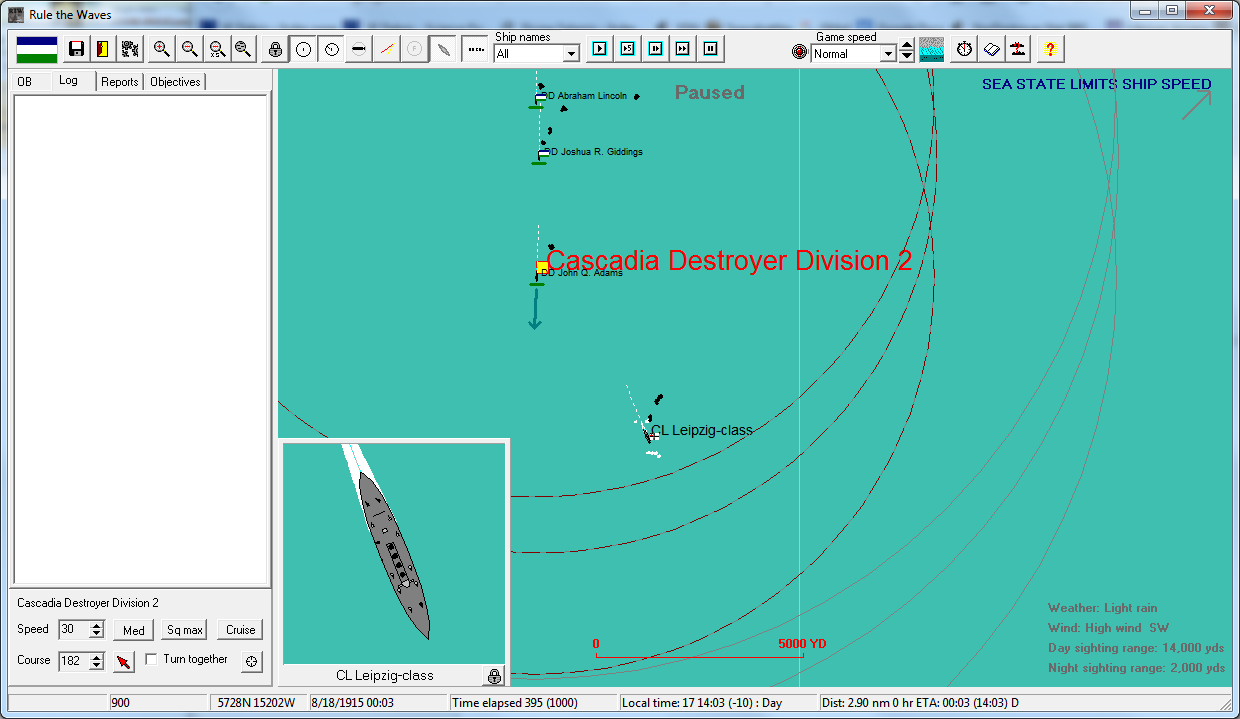
But he kept the chase on. For another hour. Two. But the storm was too fierce. Spent and frustrated, Wallace realized he could endanger his own ships if he continued.
When the German cruiser disappeared into the heaviest part of the storm at 1600, he knew the chase was over.
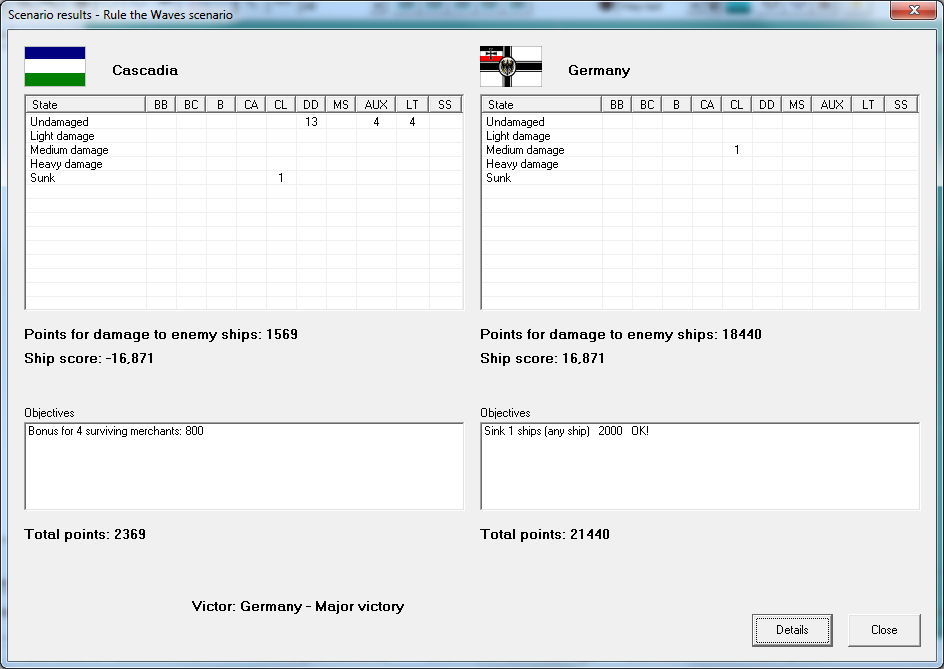
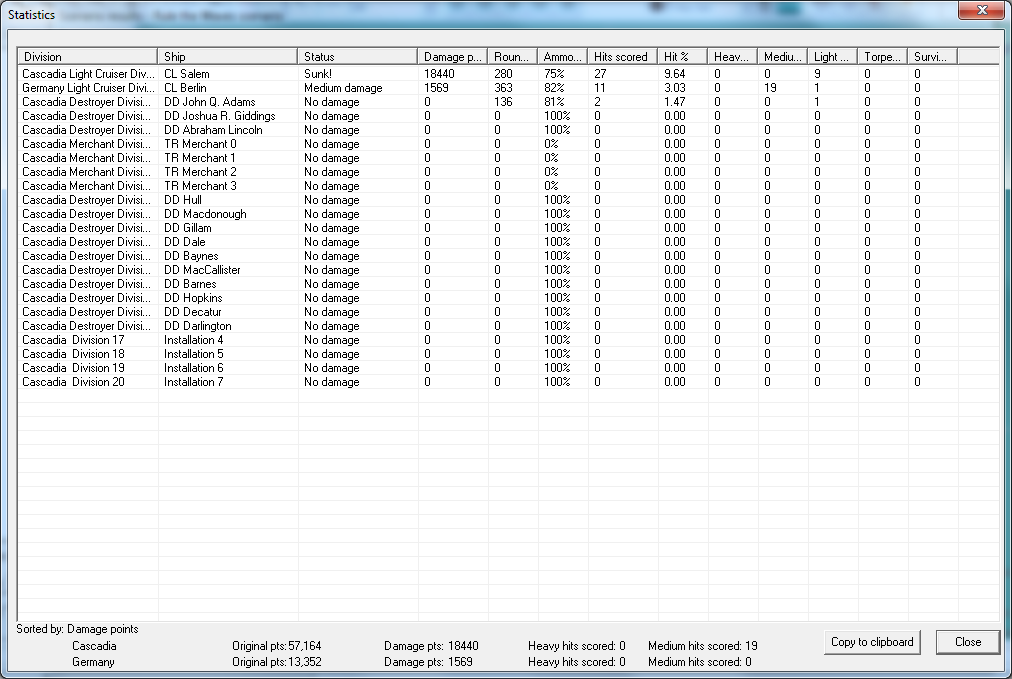
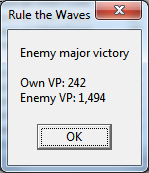
The Navy ordered four new submersibles to make good on war-time losses.
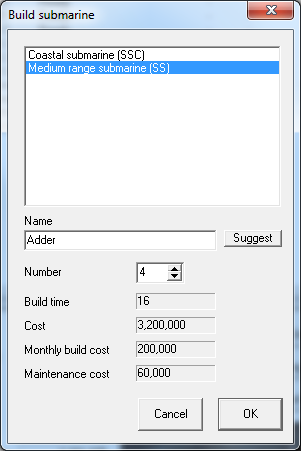
September 1915
During engagements in the war, the Royal Navy found that their fuzes for naval ordnance were not up to desired standards. They requested a license to manufacture superior Cascadian fuzes. At Admiral Garrett's behest, the Naval Office agreed to the terms of the license purchase.
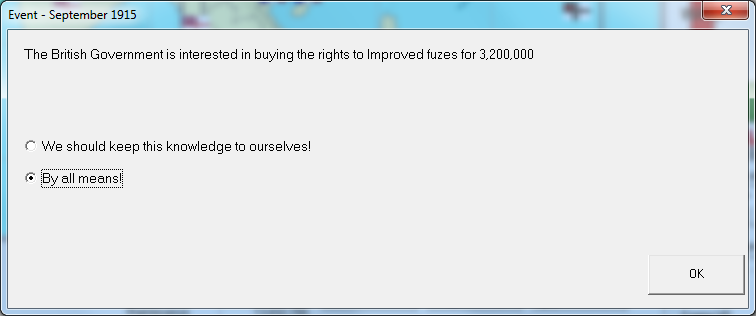
The Admiralty was informed that work was completed on a new triple torpedo mount for future ship designs.
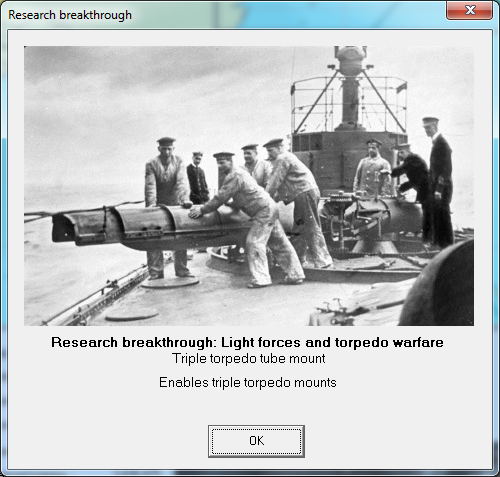
The submersible campaign continued on both sides. Cascadian subs claimed 4 German ships, losing one of their number during the month. The Germans only managed to sink 1 Cascadian merchantman in the Indian Ocean while losing one of the submersibles assigned to the Pacific to Cascadian anti-submersible patrols.
The cruiser Hertha claimed two Cascadian merchants en route to China in the waters off of Japan.
The losses to the German merchant marine since the start of the war sent a shock through the German economy, causing a painful increase in prices for numerous items, including food.
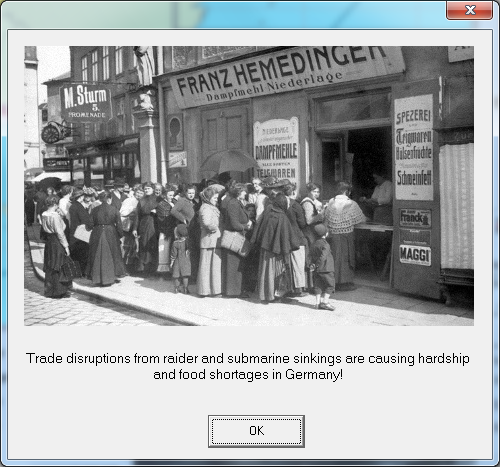
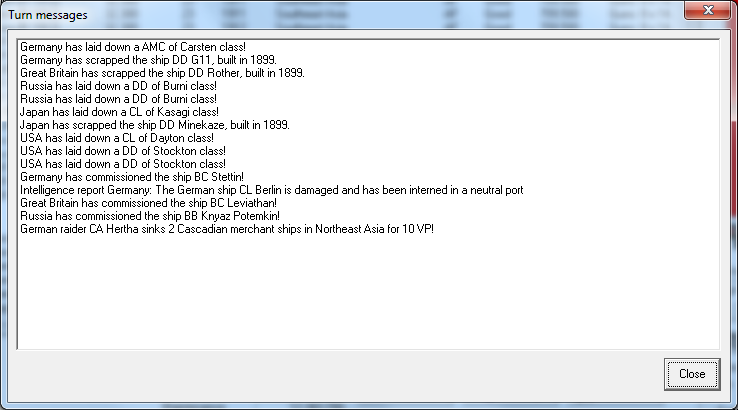
German raiding cruisers withdrew from a potential engagement off of Victoria Island.
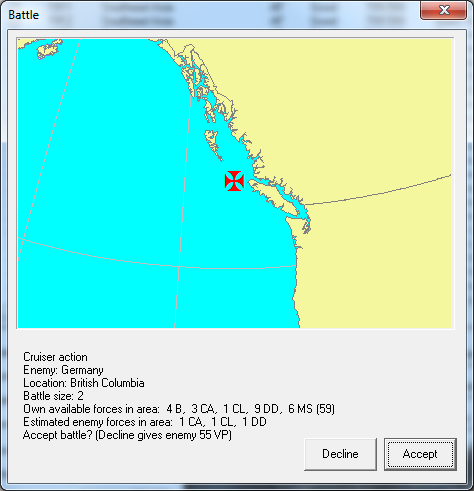
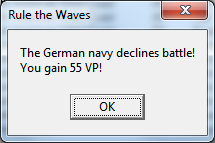
The Cascadian fleet was also on the movie in the Central Pacific.
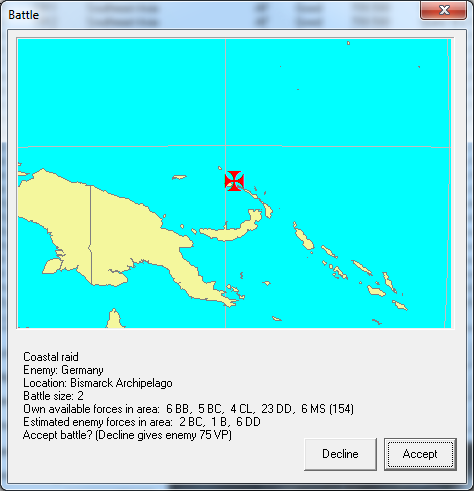
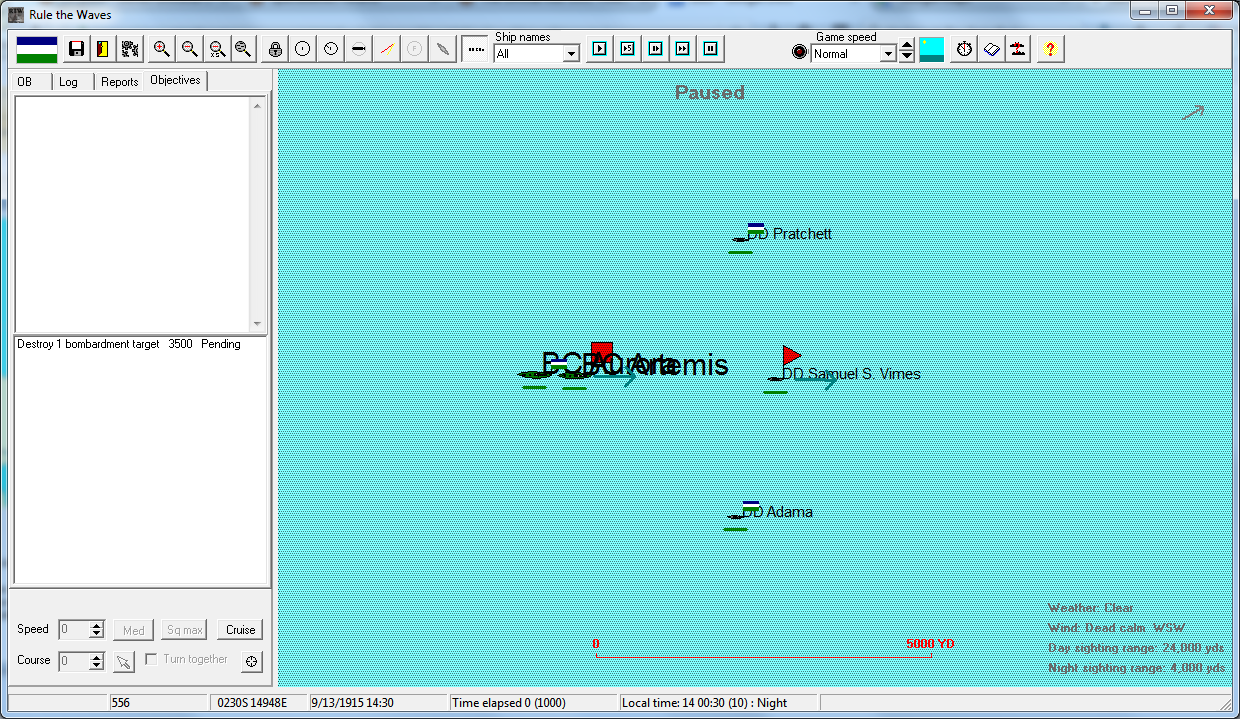
The Aurora and Artemis, with escorting destroyers, attempted a raid on Kavieng on New Ireland. After spending the night seeking targets in the limited visibility, they spotted German ships with the coming of dawn, first contact being at 0745.
Two enemy battlecruisers, the Thetis and the Prinz Eitel Friedrich of the Derfflinger, led a small force of escorts and engaged the Aurora and Artemis west of Kavieng.
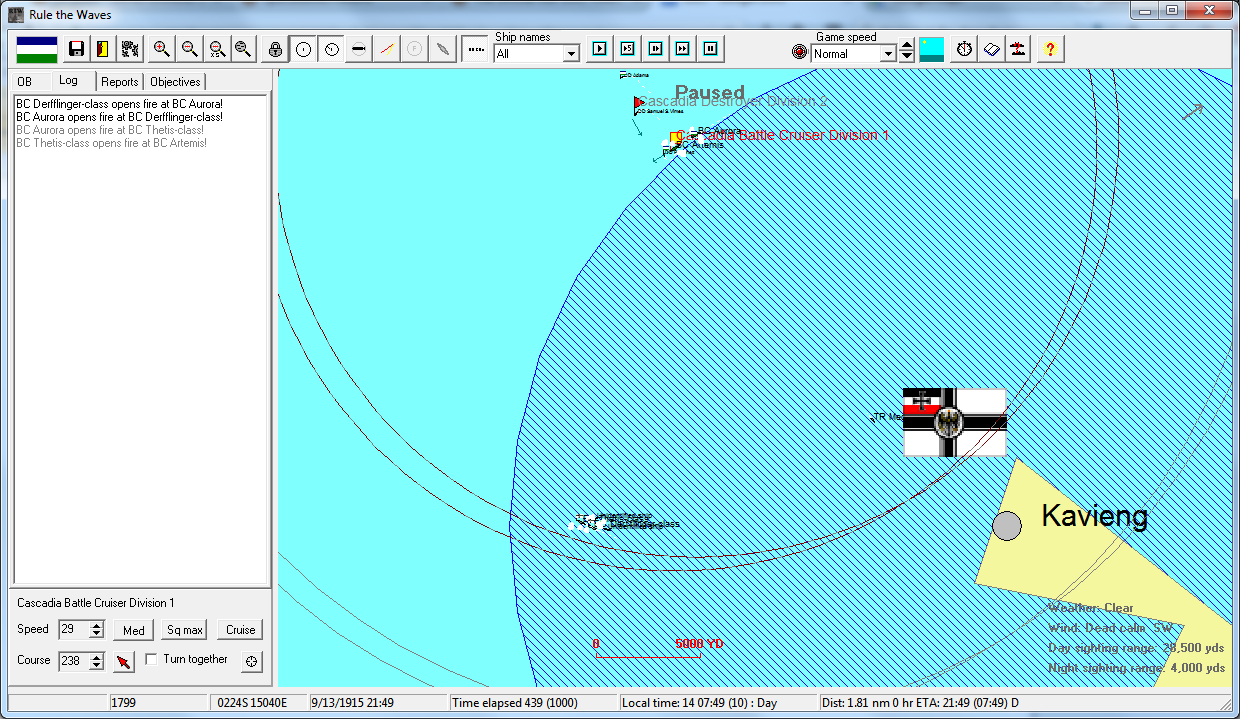
The initial exchange of fire led to an early German success when a shell destroyed one of Aurora's main turrets at 0759. With one turret out, she still managed a return hit on the Prinz Eitel Friedrich a few minutes later.
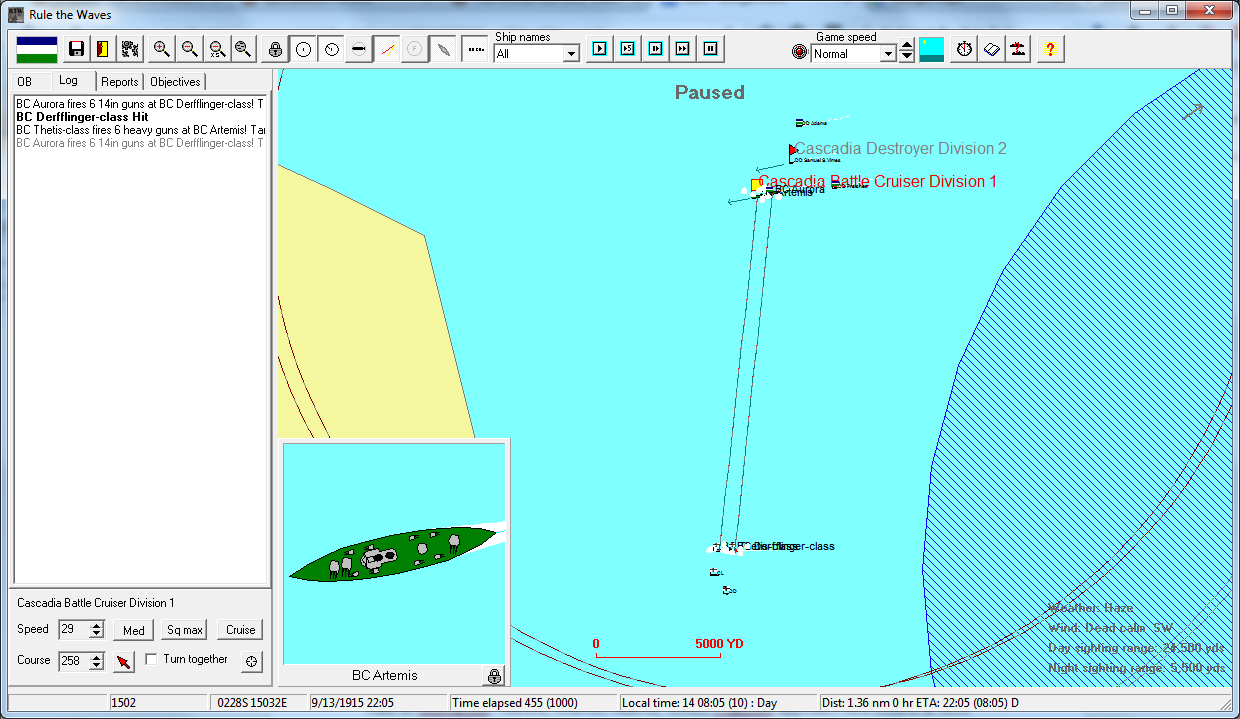
The Artemis soon became the focus of the German ships. She was hit again and a fire began to rage on the vessel, only being extinguished toward the end of the hour. The two Cascadian battlecruisers meanwhile inflicted their own hits on the Prinz Eitel Friedrich, damaging that ship extensively and knocking out two of her turrets.
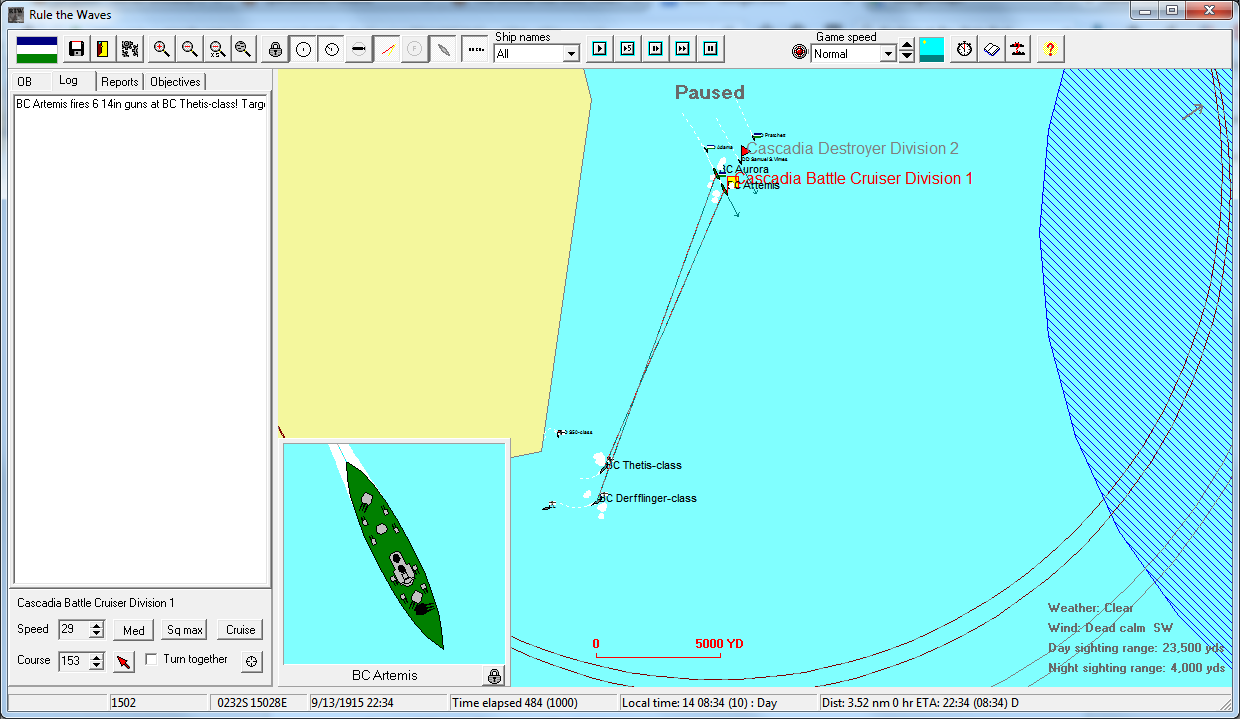
The German ships decided that they'd fought long enough and, with extensive damage on the Prinz Eitel Friedrich, retired into the waters of Kavieng, behind the suspected minefield that the Cascadian cruisers didn't dare enter (Translation: the game will not let you enter the blue circle. Which actually makes this coastal raid mission virtually impossible to win because the bombardment target assigned to Kavieng is literally beside the port and thus in the middle of a 40,000+ yards wide exclusion zone created by the suspected minefield, so only the largest and longest range guns on a clear day have a hope of hitting the damn thing).
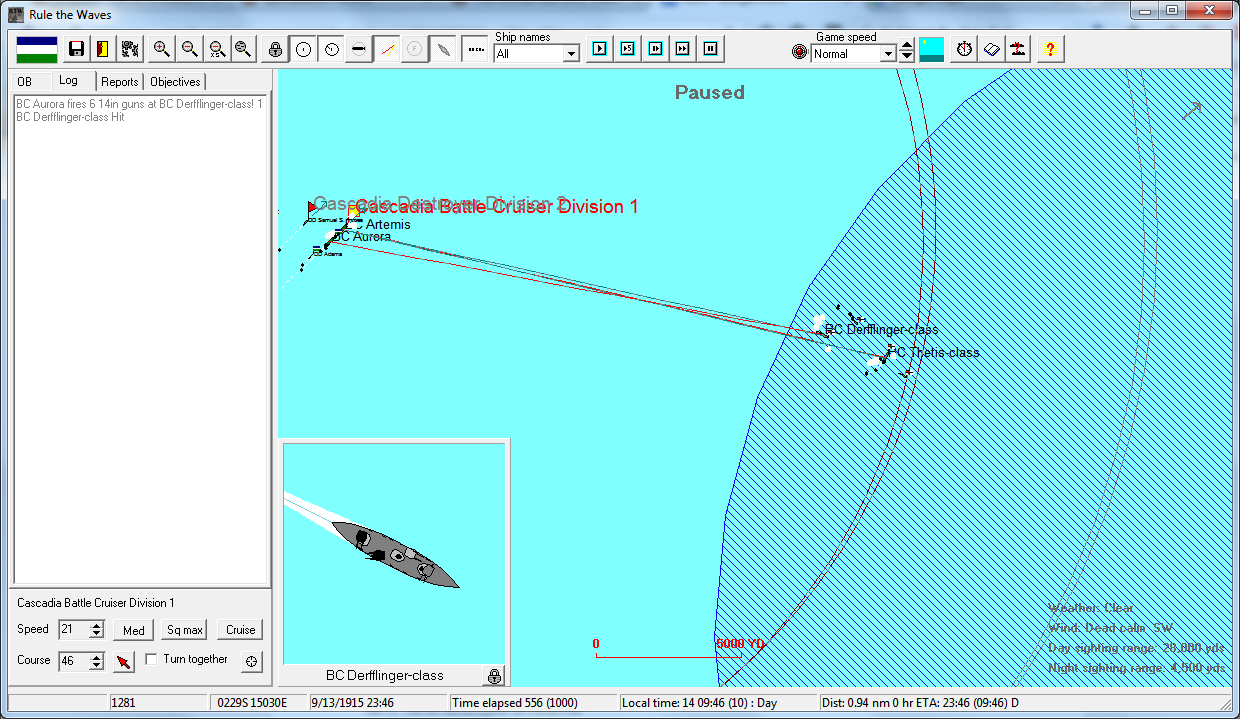
Even while withdrawing, the Germans were still delivering solid hits to the Cascadian ships. At 1006, damage from German shells knocked out electrical power on Artemis, leaving the Cascadian battlecruiser flooding and crippled. It took over an hour for the Artemis' damage control teams and engineering crew to get main power restored to the ship. The battered Cascadian battlecruisers withdrew, conscious of their exposed position. During their withdrawal, a bulkhead on the Artemis failed and the ship was threatened with further flooding. Thankfully the damage control teams, exhausted as they were, got the flooding under control.
The Admiralty was humiliated by the battle. While neither ship was sunk, they would require time in the repair yard at Chuuk before being combat capable again, and the German press was quick to laud their Pacific squadrons for their firm repulse of the Cascadian raid. The failure of naval intelligence to identify the extent of the German minefield and the impossibility of hitting any useful German targets without braving said minefield was a further blow to Cascadian prestige and morale. Several newspapers criticized Admiral Garrett personally for approving the raid and for not having the fleet in place at the start of the war to hit the Bismarcks before the German minelayers had finished their work.
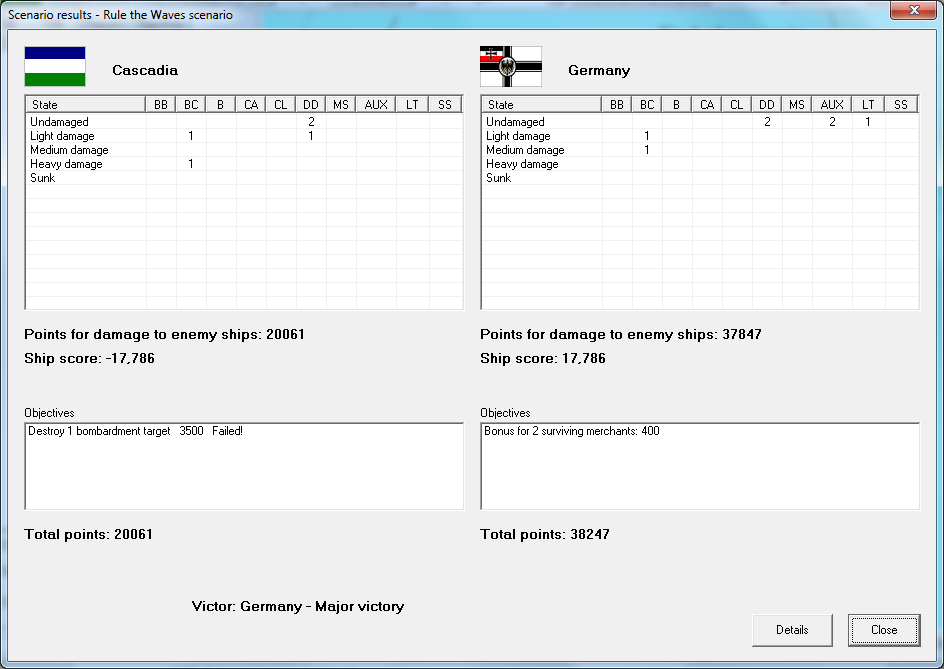
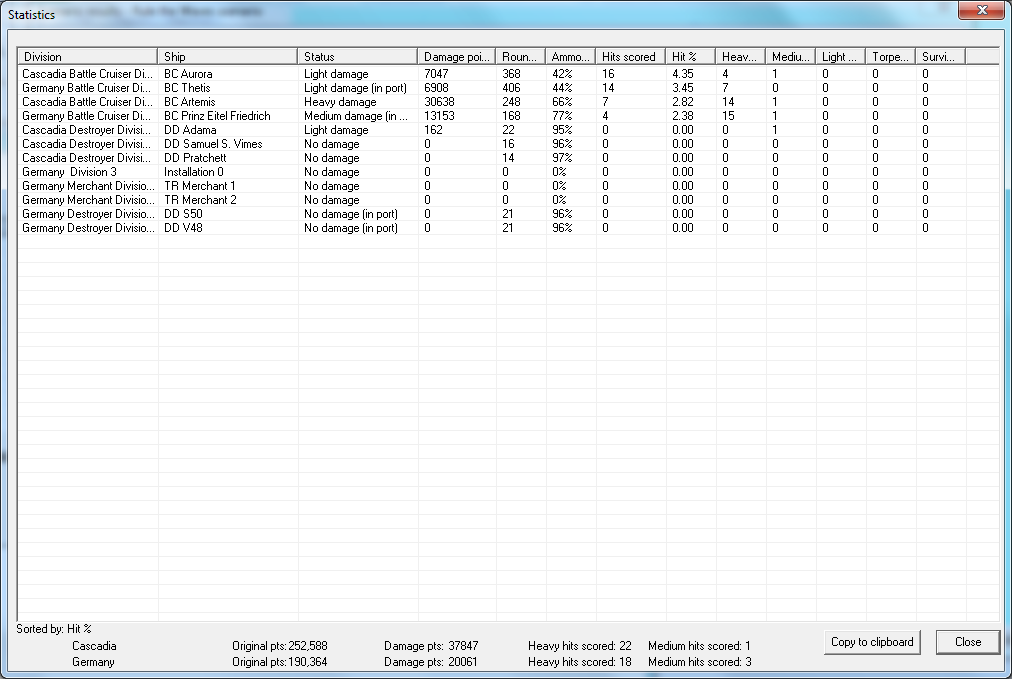
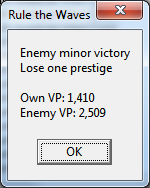
With the loss of the Salem, the Navy laid another Vancouver-class cruiser, the Esquimalt, to replace the loss.
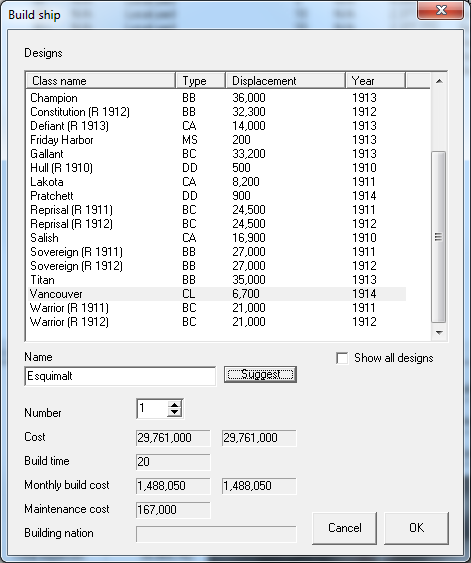
After months of preparation, the British forces in Kenya invaded Tanganyika, looking to take the pressure off of the Anglo-Portuguese forces fighting both German colonial troops and Mozambiquan rebels in northern Mozambique.
Several early skirmishes saw British successes that opened the interior of the colony to them. But there was no pullback from Mozambique as expected, and the Germans were holding firm on the vital coastline of the colony after the defeat of a British amphibious attack on the northern port of Tanga.
October 1915
Cascadian Naval Intelligence reported a slight victory in recovering blueprints on the work being done in German yards on the cruiser Niobe.
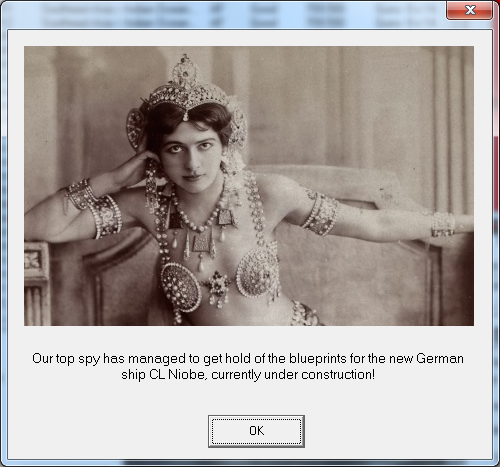
The German submersible campaign proved the more effective in October. They claimed three Cascadian ships across the globe without a single loss while the Cascadian submersible fleet failed to engage any target effectively. The Las Vegas sank two German ships in the East Indies, but those losses were countered by Cascadian losses to the cruisers Hertha and Gefion.
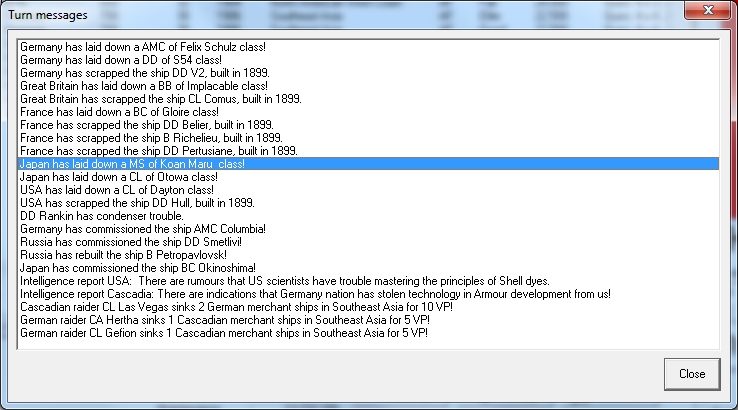
Convoy attack of Saipan - Warrior leads La Forge,Diaz, Drumknott, Tacoma, Sacramento against convoy on October 26 1635 local
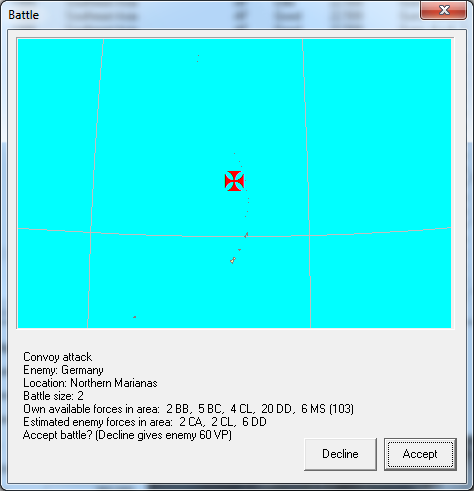
Near the end of the month, the Warrior led a force of destroyers and new scout cruisers against a German supply convoy heading toward Saipan. Contact was made at 1710 on the 26th of October.
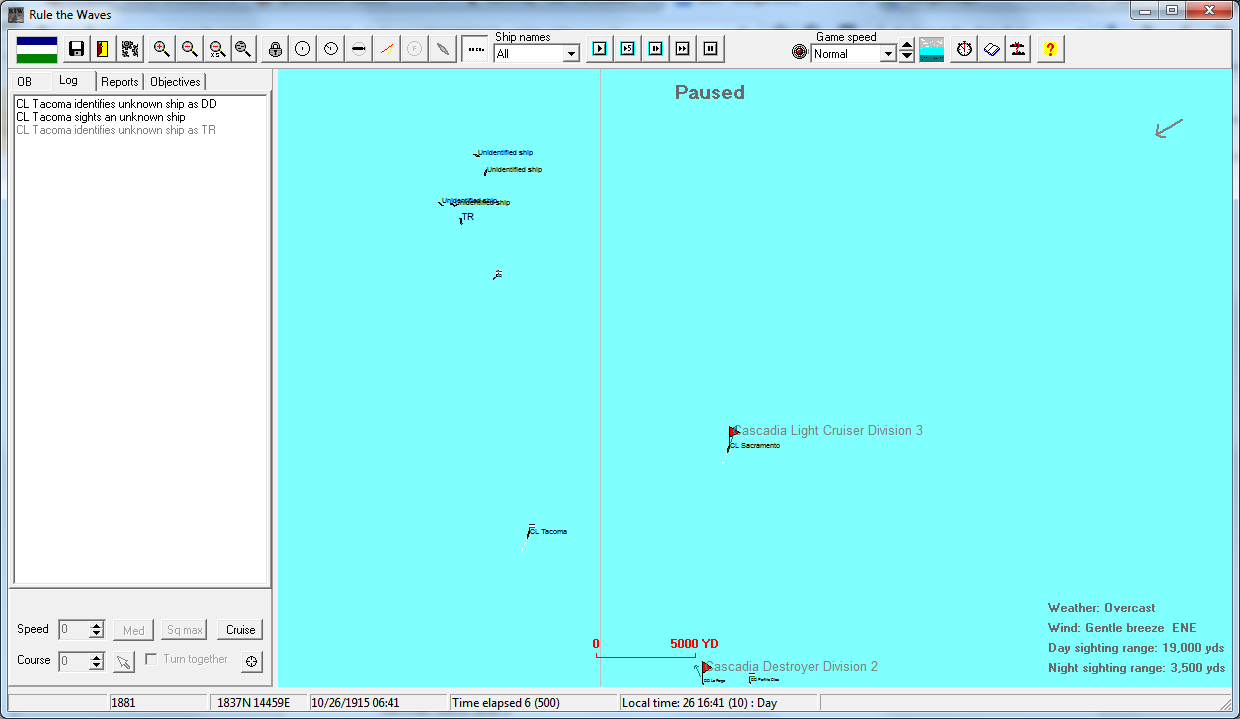
The enemy transports were quickly overwhelmed by the Warrior and her escorts.
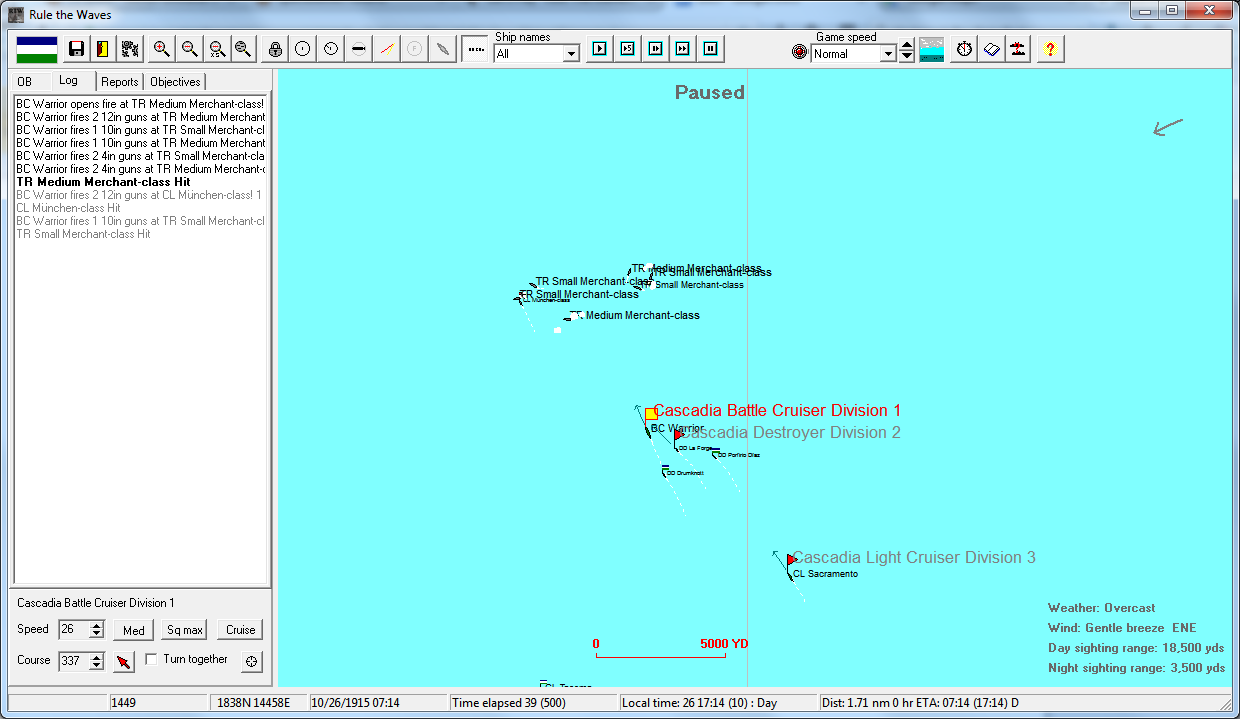
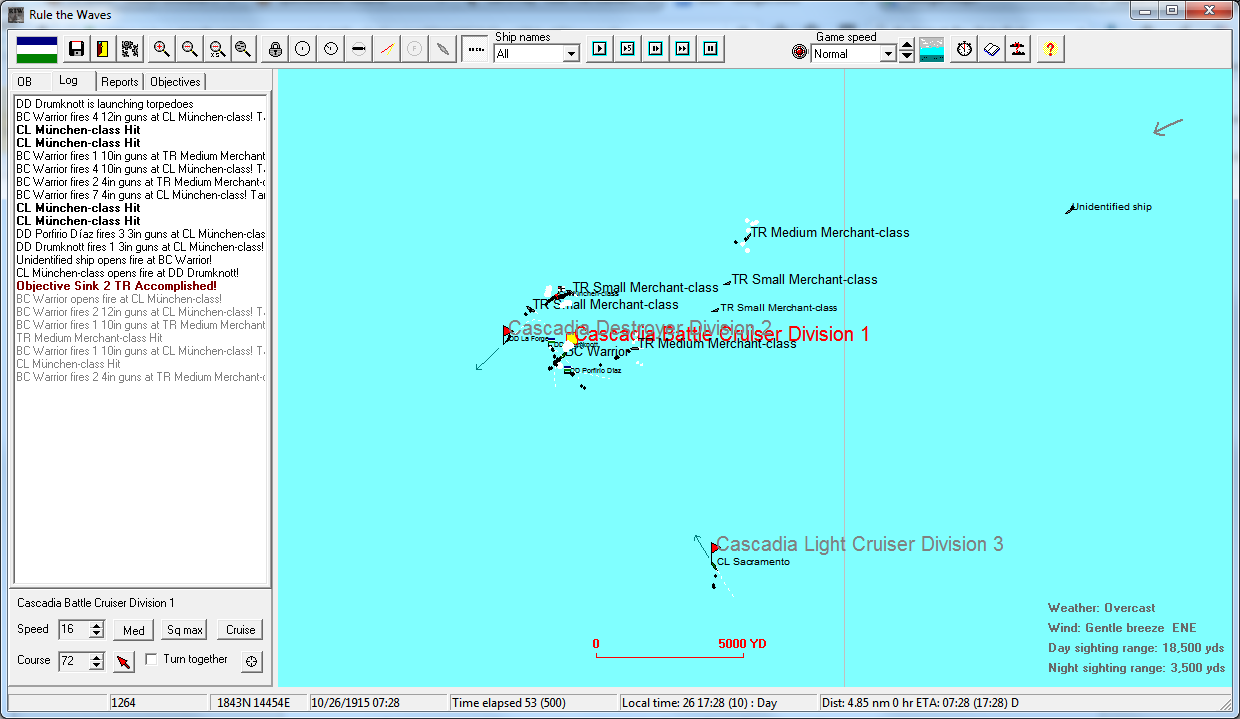
The German battlecruiser Prinz Eitel Friedrich was spotted to the northeast. Late from departing Saipan due to a submarine scare, she was too late to save the convoy but still a grave threat to the older, less-heavily armed Warrior.
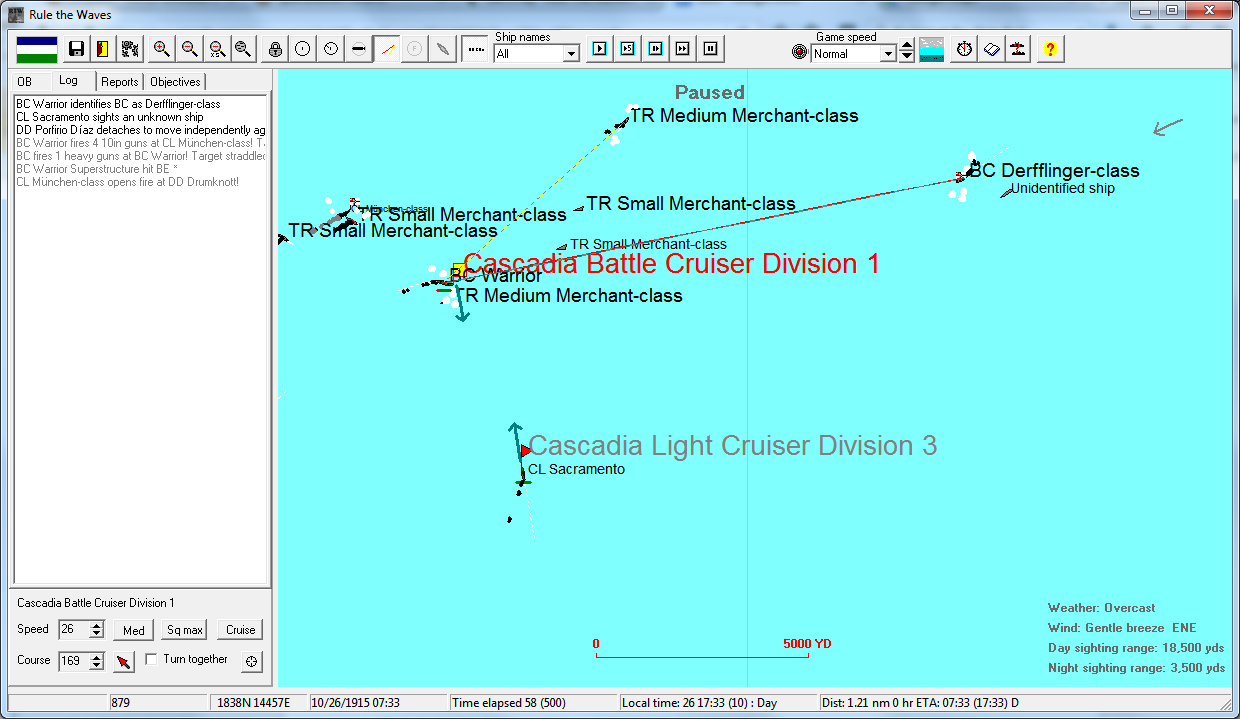
A short exchange of shells happened as the Warrior withdrew south with her escorts. The destroyers Drumknott and La Forge were severely damaged by the end of the battle.
During the fighting, the German cruiser Hela was hit by a torpedo and sunk.
Had the Prinz Eitel Friedrich been given more daylight to work with, the action would likely have turned against the Warrior. But night fell before they could land any significant hits on the prototype battlecruiser of the world. Warrior withdrew in victory.
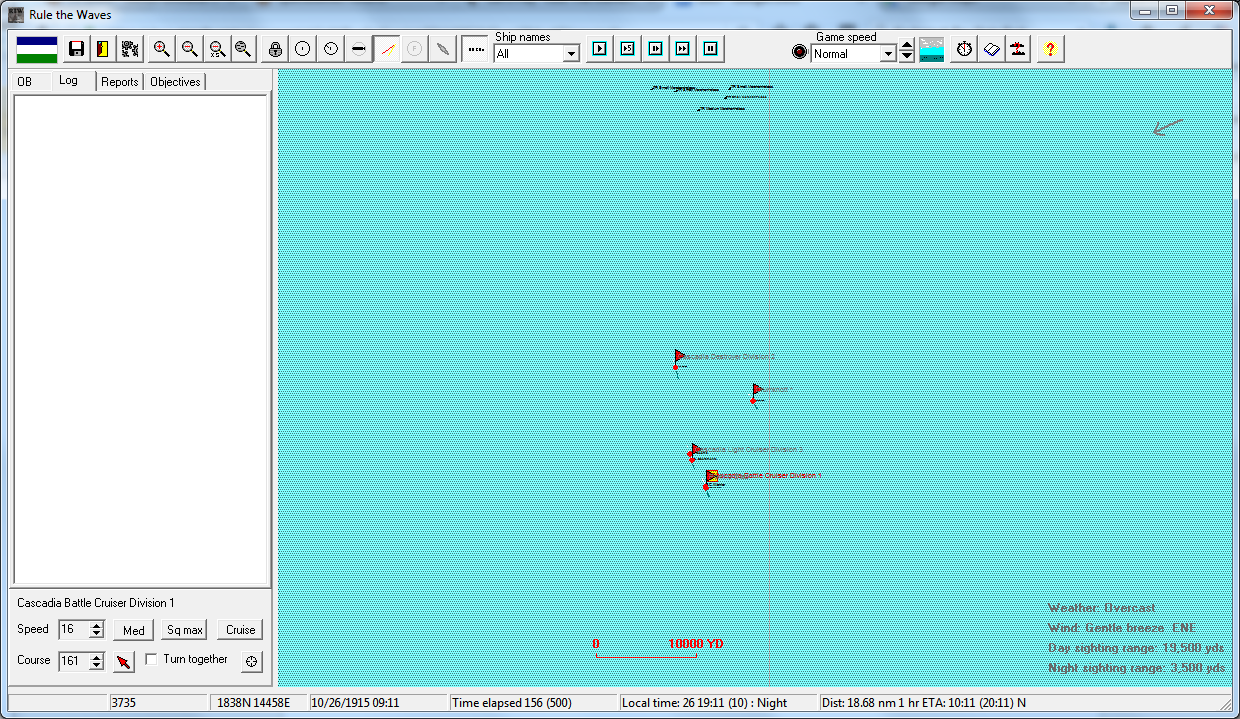
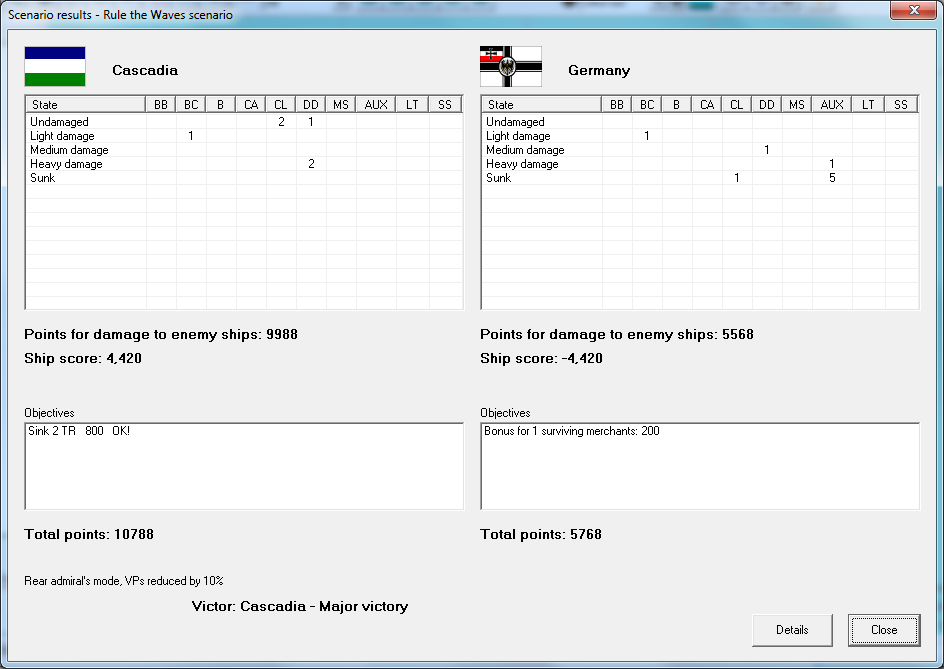
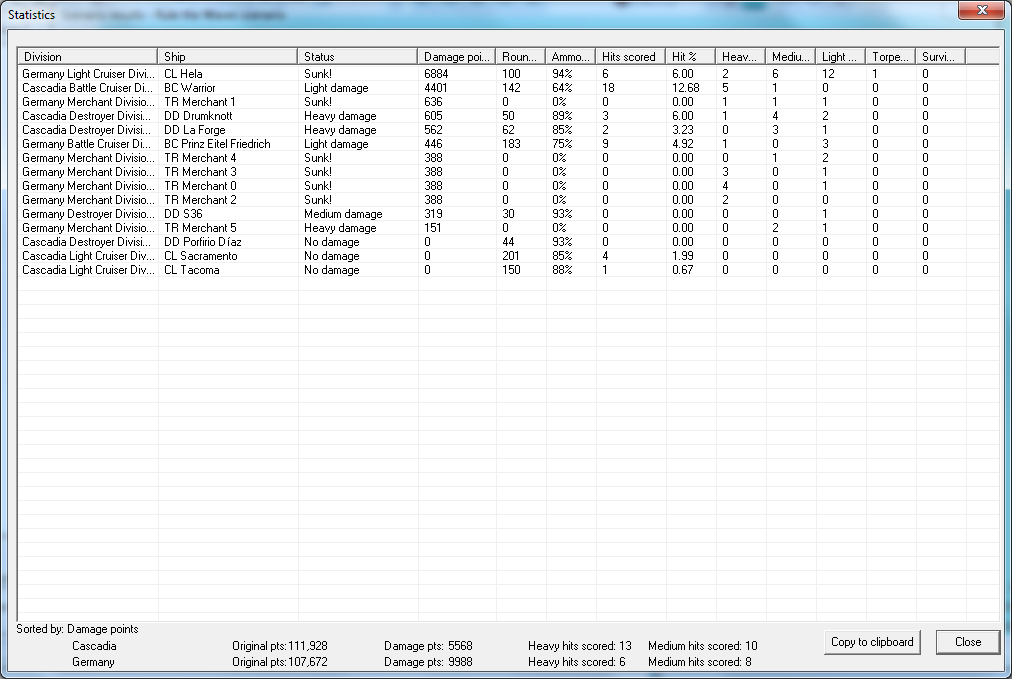
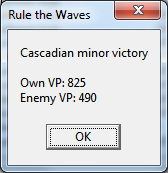
Meanwhile some cracks showed in the alliance with Britain. Despite expectations, the Royal Navy had not yet consolidated an entirely effective blockade of Germany, which was receiving further supply by buying grain from Soviet Russia and even France. Admiral Garrett wired to London with inquiries as to what was holding back British efforts. The response that the British lacked the ships to properly establish a blockade due to the needs of the Indian Ocean seemed ludicrous.
Ludicrous, that is, until the Admiral received the following British request. The British were understandably reluctant to rely entirely on Cascadian protection for their colonies. Not when Lakeland was publicly vowing invasions of German colonial possessions, invasions demanding that the bulk of the Cascadian fleet remain in the Pacific to suppress the German battlecruisers from opposing the invasions being planned. The British were instead insisting that the Cascadian battle fleet join Home Fleet in the North Sea. This would effectively bottle up the German fleet in the North Sea and enable a proper blockade to be enforced.
It also flew directly in the face of Lakeland's strategy, as Lakeland wanted the fleet kept in the Southeast Asian-Central Pacific waters to support invasions of Sumatra, the Bismarcks, and the Marianas. He had protested even the partial deployment of a couple of the Constitution-class battleships to join the British Home Fleet.
For the Admiral, he now had to decide whether to give in and accept the British requests, or keep the fleet in position to support the President's invasions.
Garrett House
West Portland, Oregon
30 October 1915
Rachel had noticed the foul mood of her husband in the prior months. He was not new to facing public scorn - the Socialists had always vilified him as a militarist and imperialist - but the insults from the press over the defeated raid on the Bismarcks had stung personally. Added to that were the accusations of lethargy in deploying the fleet before the war broke out.
"The Socialists attack me for provoking conflicts with Germany," Admiral Garrett groused angrily. "Now the Conservatives attack me for not provoking conflicts." He thumped a copy of the day's Oreganian. "They still rave about the deployment of the fleet when the war broke out. These fools would have provoked the war had they been given their way. We would have lost the moral edge we now enjoy over Germany. Their invasion of Mozambique paints them as the aggressor without doubt."
"I know dear." Rachel breathed a sigh. That she could breathe easily was not to be taken for granted. Her health finally seemed to be recovering.
"The war has not gone superbly, true. Fortune has not been on our side yet." The Admiral thumped the table with his fingers. "But time is on our side. Time. Germany will be strangled by blockade as soon as the British get their act together and can maintain it."
"I understand."
Something in her voice broke through his frustration. He looked at her intently. "Darling?"
"I had hoped that maybe this war would be like the one in 1903," she said quietly. "That it would end quickly. And then you could retire…"
"Ah." He nodded. "I can understand that wish. But we can't keep going to war with Germany every five years, love. Sooner or later, we must put an end to this cycle. Germany must be brought to heel."
She nodded quietly. It was clear his answer did not satisfy her.
The Admiral put a hand on her arm. "I know you're disappointed, Rachel. I promise you, the Naval Secretary will receive my letter of resignation as soon as the war is over. I swear it to you, love. Let me attend to my duty and this will be over."
Before more could be said there was a sound of wood clashing with wood coming from the hall. Two smaller forms, none higher than four feet, moved through the door. Gabriela was immediately recognized, wearing her long and dark hair in a ponytail the way she always did, dressed in shirt and trousers taken from her brothers' old things. Her compatriot, with a slightly more bronze complexion, had similar attire on. Isabela Talaverda, daughter of a Senator from Lower California, was the one friend Gabriela always spent time with.
The Admiral was beginning to realize it was because the young lady was the only girl in the capital's schools that could match Gabbie's endless supply of energy, and endless need to expunge it in ways young ladies usually did not.
Dueling with wooden swords in the halls being one particularly-unwelcome method.
"You will stop right this instant!", Rachel shouted. A clack of wood on wood nearly interrupted her in that order. But there were no further noises as the two girls stopped their duel and looked to Rachel with a mixture of surprise, worry, and defiance. "I cannot believe your parents think is acceptable behavior in the house, Isabela!"
Gabbie's friend squirmed a little in response. No, they quite clearly didn't.
"And Gabriela! You should be studying! Both of you!"
"It's Saturday, mama," Gabbie protested. "We did our work for the weekend already."
"And so that is that? You will not do extra?" Rachel shook her head. Her frustration was evident. "How can you expect to get ahead just by doing what is expected? You must go beyond expectations. Your sister is in university because of that."
Gabbie was clearly uncomfortable at that remark. Isabela had the look of someone who knew they were no longer central to the argument at hand.
There was enough stress in the family life already given the war. The Admiral motioned to the door. "Why don't you head to your room, Gabbie? Surely there are books your friend will find interesting?"
Neither were clearly interested in that. But while only eleven now, they could see the offer being given to them and accepted it. They ceased the argument and left toward the stairs.
"How can she be so unlike her sister?", Rachel sighed. "I had such high hopes for her too."
"I'm sure she'll come around," the Admiral stated. Although he had no way of knowing how accurate or inaccurate that statement would prove.
In East Africa, the brilliant German general Paul von Lettow-Vorbeck continued to stymie British operations in Tanganyika. The loss of the border skirmishes the prior month had been to allow Lettow-Vorbeck to assemble the Askari fighters under his command into a more coherent force. With his combined unit of German and local troops, Paul von Lettow-Vorbeck launched several successful attacks on British forces in northern Tanganyika, recovering several interior towns and villages by overwhelming isolated garrisons.
The British commanders in Kenya called for reinforcements from other colonies.
Meanwhile, German troops continued to advance successfully in Mozambique, taking advantage of the ongoing rebellion in splitting the Anglo-Portuguese forces. By month's end, the German forces were nearly to Pemba. In light of the threat, the British appealed to the government in South Africa to provide an army to counter-attack Germany. The South African response to the war was ambivalent - their price tag was that the British government let them seize Namibia from Germany and get Lisbon to give them concessions in Mozambique. Nevertheless, a South African army under Jan Smuts was organized to join the fighting in Mozambique.
November 1915
The yard expansion projects ordered the prior year finished.
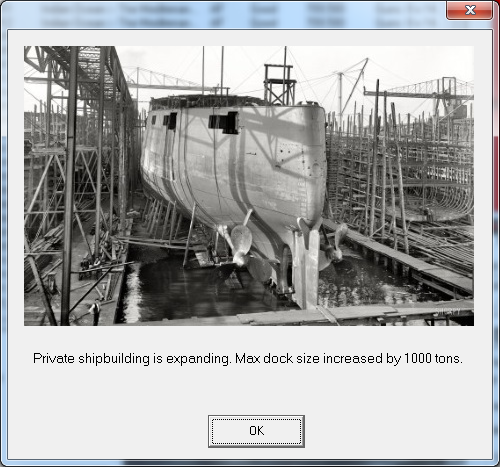
British design planners provided concepts for improved damage control and subdivision layouts to Cascadian experts. New plans for Triple Bottoms were a direct result of this exchange.
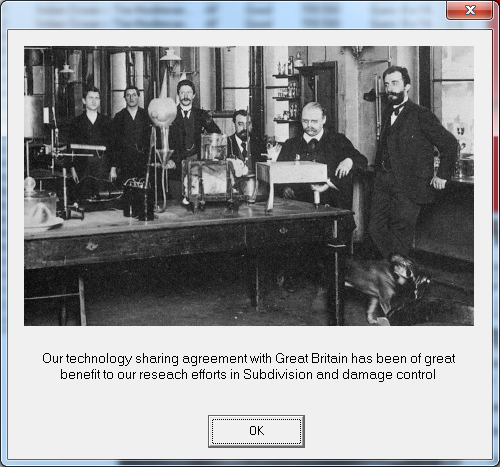
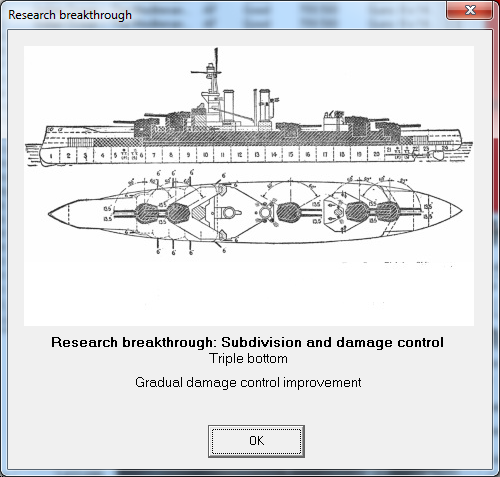
Reilly & Colette's Armory Works division reported to Naval Artillery that they had a working model for a new 16" naval gun of greater quality than had initially be considered possible. The news was welcome in the Admiralty, already working on a new battleship design with the scheduled 1916-17 completion of the Gallant-class battlecruisers.
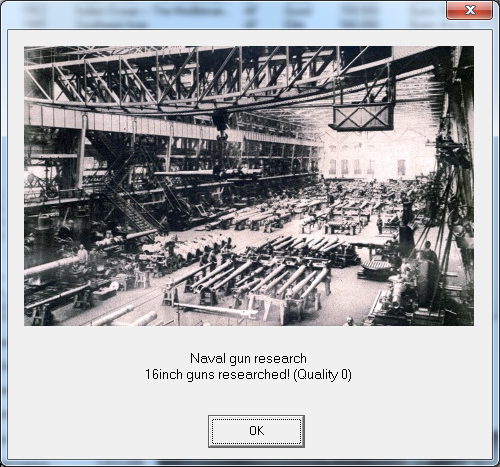
The raiding campaigns continued, with a slight edge for Germany given its greater fleet of raiding cruisers. The Cascadian submersibles claimed three sinkings for the loss of another sub. German subs claimed 2 sinkings with no losses. The Las Vegas claimed two more sinkings in the waters of the East Indies, matched by the German cruisers Hertha and Amazone (Not interned as believed) continuing their established raider careers. The Victoria Louisa claimed another ship near New Caledonia in the South Pacific.
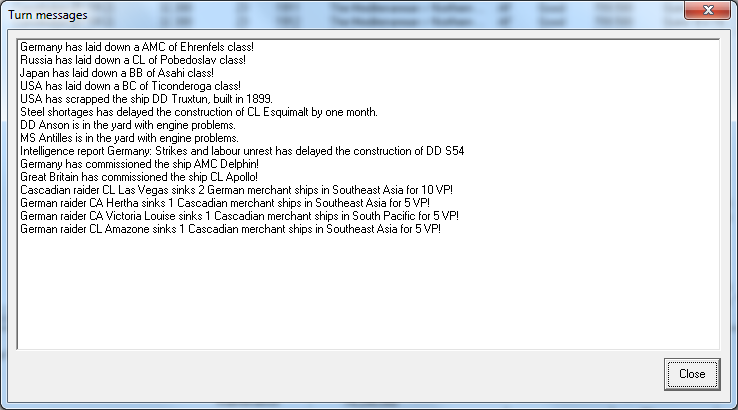
A light engagement in the Straits of Malacca saw the German destroyer S16 heavily damaged by British gunfire.
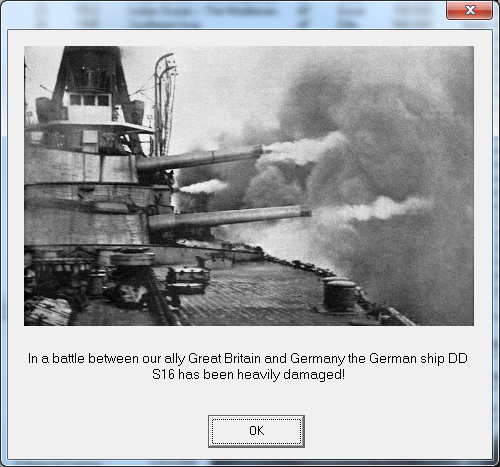
And the seas off China were the site of another small naval fight.
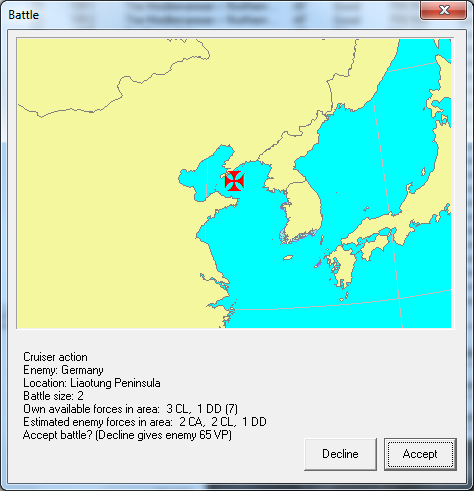
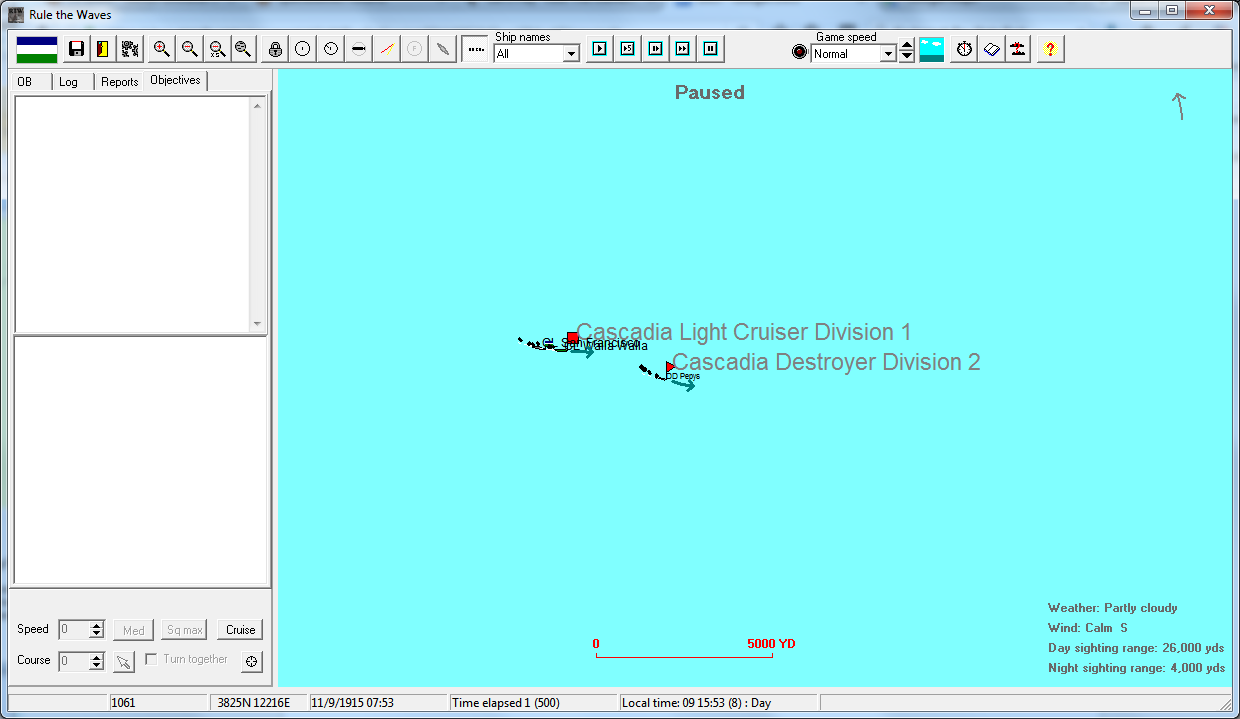
Meanwhile, on the 9th of November, the German cruiser Ariadne was spotted near the Liaotung Peninsula by the Cascadian China Squadron. The San Francisco and Walla Walla spotted the vessel at 1555 local time.
A chase began as twilight approached. The Ariadne was identified as Gazelle-class at 1620, a half hour before twilight. The German ship continued to flee, looking to escape after the fall of night made visibility beyond 3,000 yards impossible.
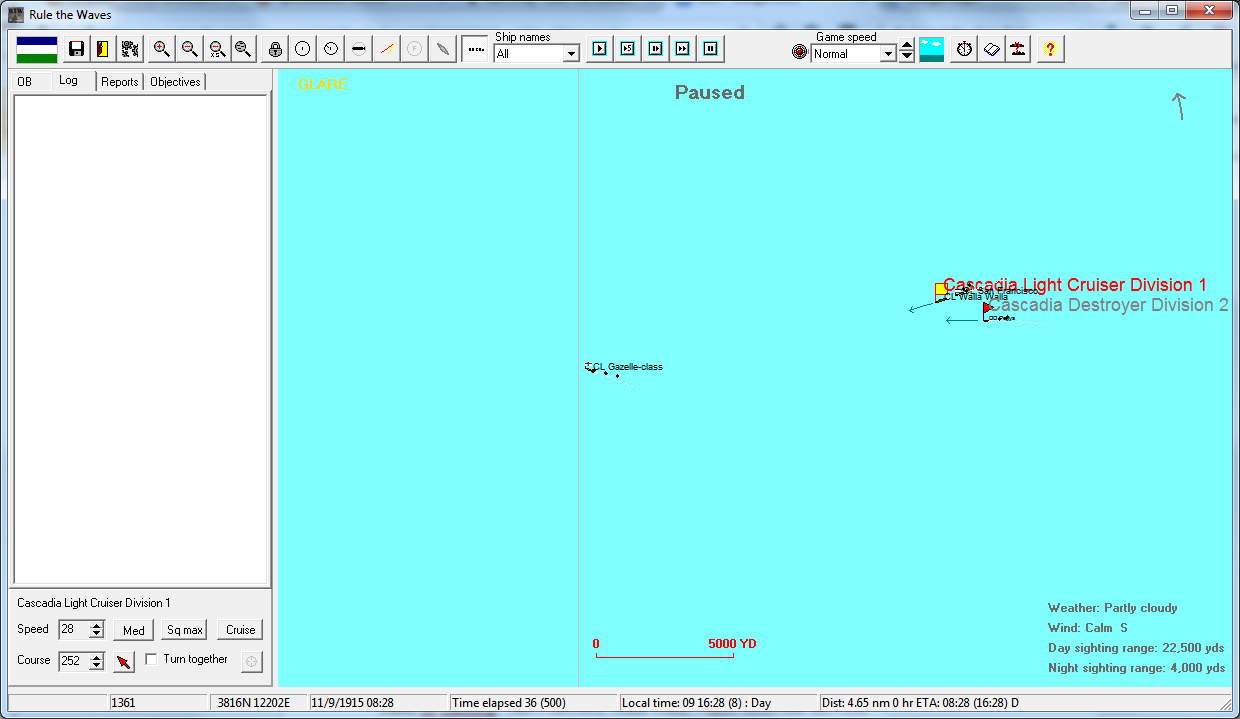
At 1708, after over an hour of chasing and shooting, the Walla Walla drew close enough to land five hits on the German cruiser.
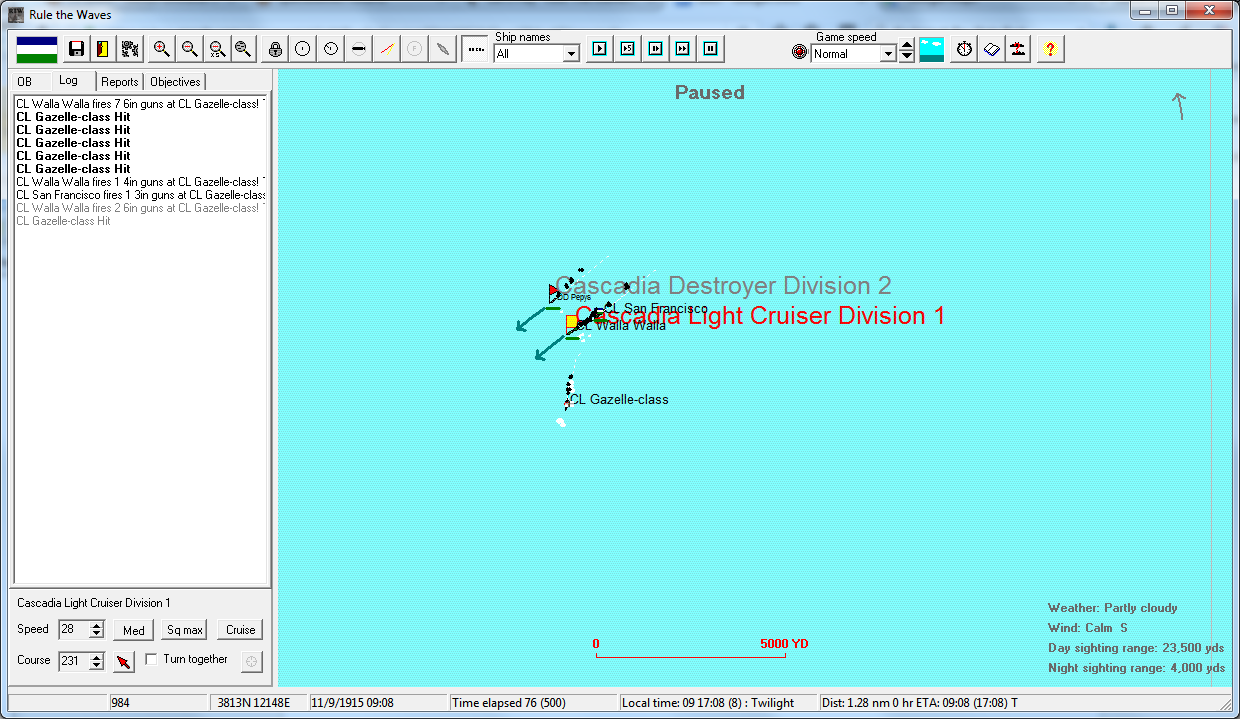
A minute later each cruiser landed three more shells on the doomed German ship, to be followed up by another thirteen hits together two minutes later. This brutal pummelling was too much for the old protected cruiser, which started sinking at 1715.
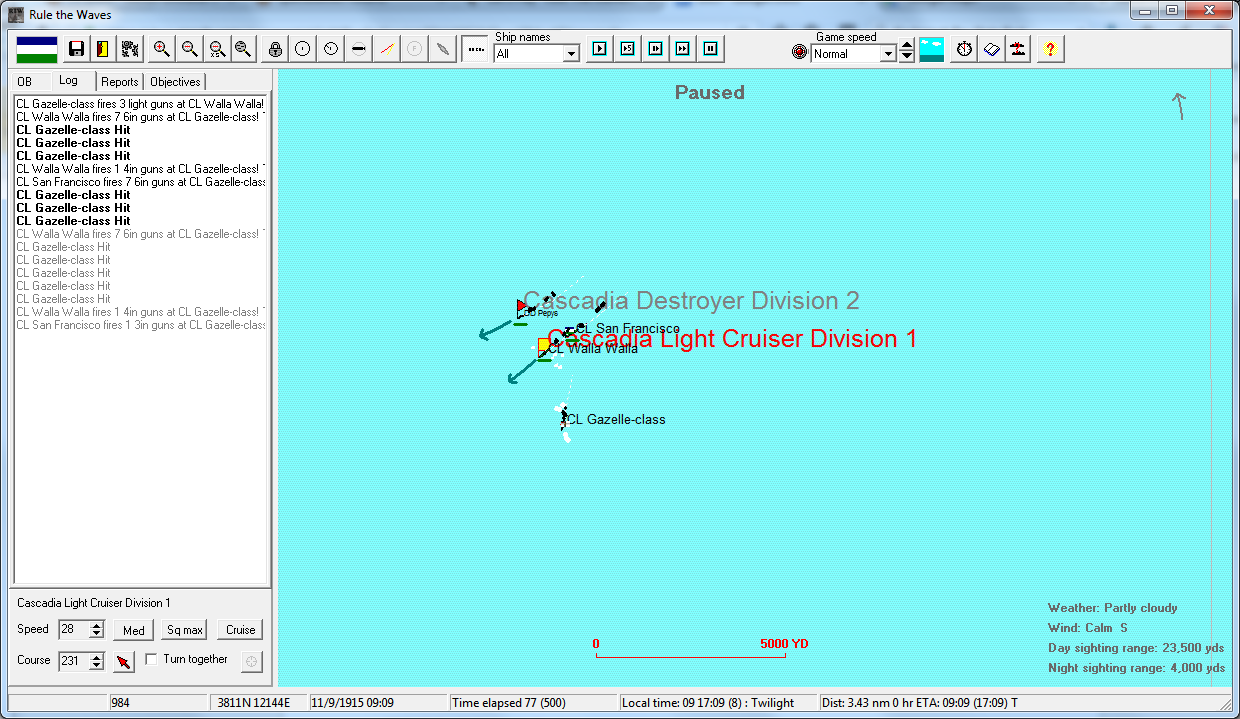
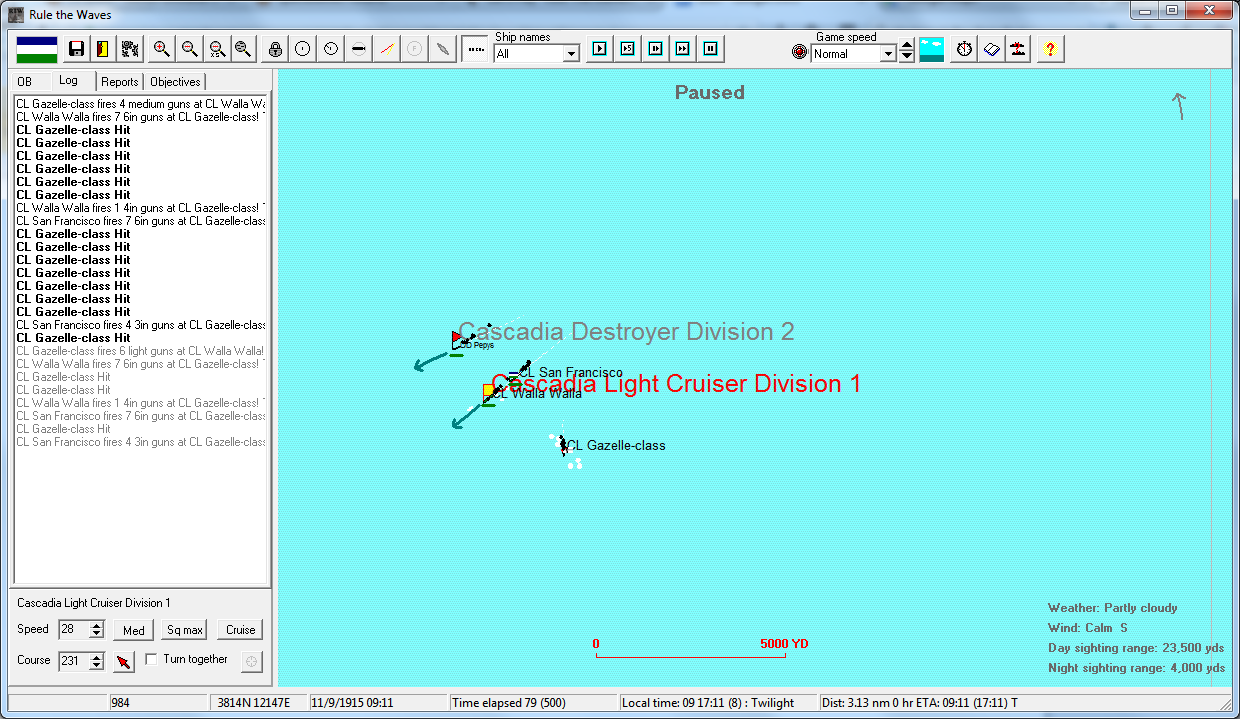
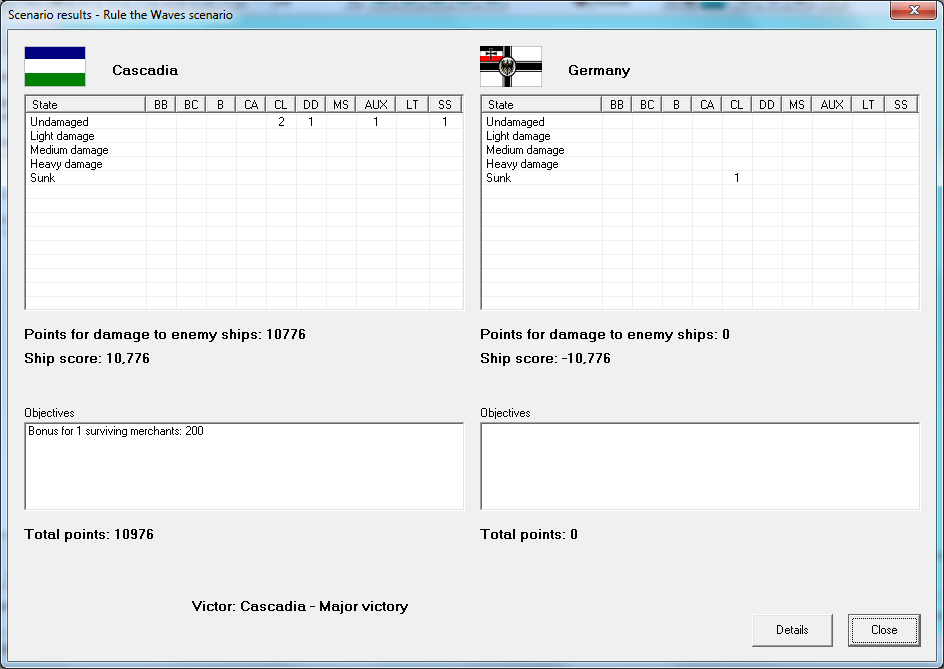
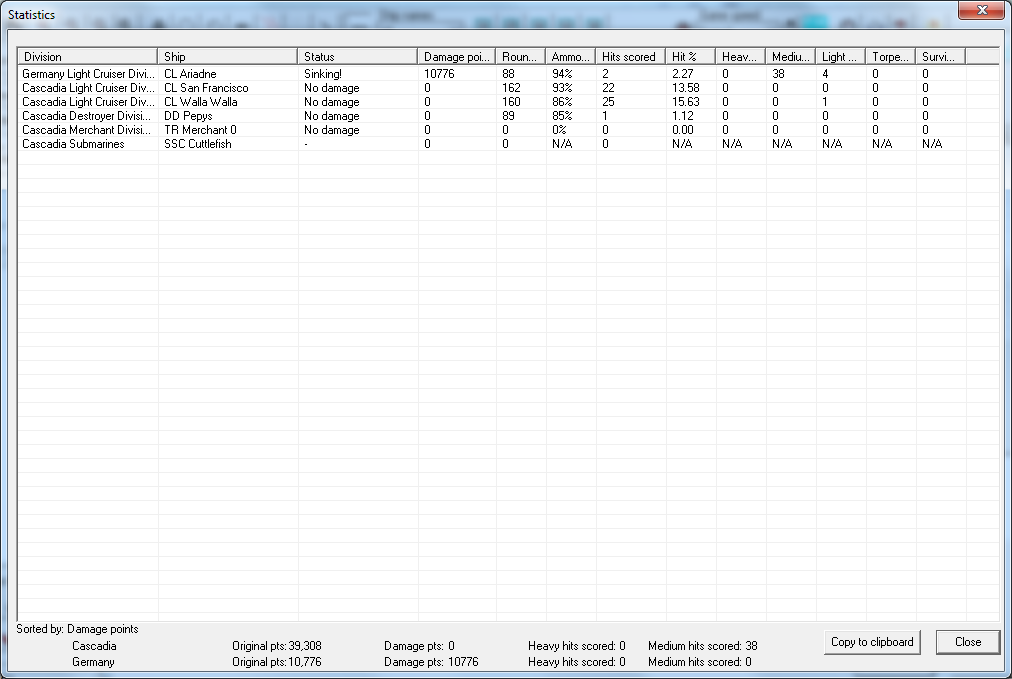
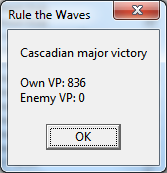
A steel shortage resulted in a delay of one month for the construction of the Esquimalt.
Esquimalt delayed due to steel shortage
The German invasion of Mozambique reached a fateful point. The German colonial forces outmaneuvered Portuguese and arriving British forces and besieged Pemba. The British, continually flustered by the direction of the conflict, put out an immediate request for Cascadian troops to assist in the campaign. The fall of Pemba would make supplying troops in northern Mozambique nearly impossible, costing Portugal the northern half of their colony.
Meanwhile Lettow-Vorbeck continued to frustrate the British invasion of Tanganyika. He inflicted a significant defeat upon the British at Arusha, threatening British supply lines into the interior. When concentrated British forces finally came upon him toward the end of the month, the German commander and his Askari troops avoided the trap and slipped away with few casualties.
Von Lettow-Vorbeck's successes, wired back to Europe via neutral Belgium, were electrifying the German populace. Despite the hardships of the ongoing Anglo-Cascadian anti-shipping campaign, the German people remained loyal to the war effort. They seemed to be winning this time and their successes in the Pacific were boosting national trust in the Navy. For the moment, it was the German Navy, not the Army, that was the nation's premiere service.
December 1915
On December 5th, Pemba fell to German troops.
Two days later, Paul von Lettow-Vorbeck encircled and forced the surrender of a significant force of British colonial troops near Babati. German morale reached a feverish peak, as their arms seemed to be successful across the globe.
In light of their battlefield successes, the Germans proposed a peace treaty to the British and Cascadians. It called for the cession of northern Mozambique to Germany, limitations on Cascadian naval strength operating in the Philippines, and the cession of the eastern Samoa islands to Germany for a South Pacific naval station, as well as reparations for the losses to German shipping.
The prospect of peace seemed higher than expected. The fall of Pemba and the surrender at Babati toppled Asquith from the Prime Minister's chair with a vote of no confidence. The Conservatives, under Bonar Law, offered a National Coalition government to the Liberals, but their terms were considered unacceptable for the scope of the situation. David Lloyd George put together a new Government and managed to win House approval for it and to continue the war. Even the Conservatives voted with his Government against a peace vote by dissident Liberals and Labour Party MPs.
Britain was resolved to fight alone if she had to. But she did not. In Portland the Socialists were quick to support the German peace offer, as they were already opposed to Cascadia's "imperialist ambitions" in Asia. But the discontent with the war was still very low and patriotic fervor at a high. Lakeland insisted on rejecting the peace offer personally, but acquiesced to a Cabinet vote insisted on by Burgess. Burgess feared letting Lakeland control too much of the war effort due to remembering his behavior in the prior war.
In the Cabinet, several secretaries supported the idea of asking the Germans to negotiate the terms down, but to accept in principle a reduction of Cascadia's naval presence in the Philippines which, they pointed out, was usually not high even in peacetime as it was.
Naval Secretary Santiago thought he saw the winds blowing toward submission and called in Admiral Garrett to brief the Cabinet. The Admiral was quick to dismiss claims that the Navy was losing the war. Responding to a remark from Interior Secretary DeWitt about the war "being against us", he stated, "These past few months, the tides have been against us, that is true. But war is not a constant tide. I remember when the Confederates seemed to be holding against us in the early 80s, Mister Secretary. Time still told against them, and ultimately the slavocracy of the South was extinguished. There is plenty of hope for the future of the effort. The Navy is growing stronger with every passing day. The war is not a lost cause. It is certainly not being lost to the extent that the German peace offer is reasonable. It is, sirs, an insult, and the honor of the Navy and of our Republic insists that we answer it with steel."
In the end, the Cabinet voted unanimously to continue the war.
Senator Flagg attempted to bring the Senate into a vote to compel the Government to begin peace negotiations, but he failed by a large margin. The Socialists in the House fared little better in their efforts to compel the Government.
And thus the war continued.
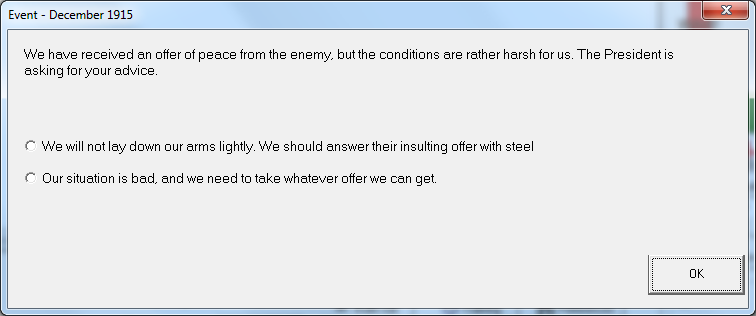
The Admiralty was informed that metallurgists for the Navy had completed testing of a new, improved homogenous armor for warships.
Naval Ordnance gave a glowing report on progress for new depth charge explosives, which would improve national efforts to deal with the German U-boats.
Experience in the war helped naval communications experts complete a system of new, advanced naval signals, including greater use of wireless radio communication.
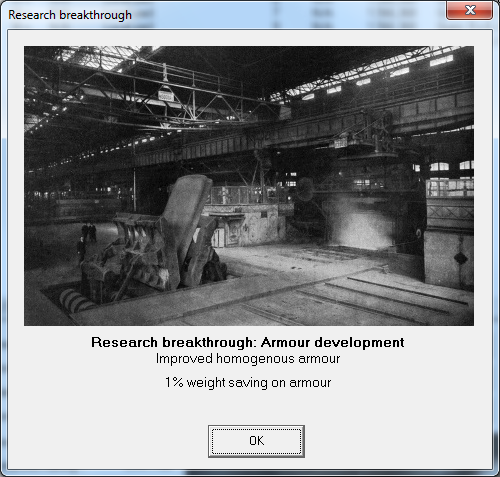
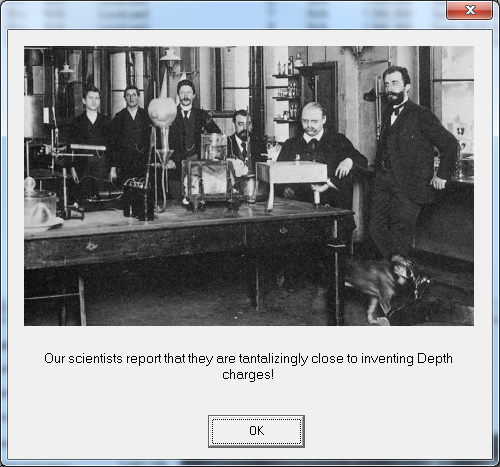
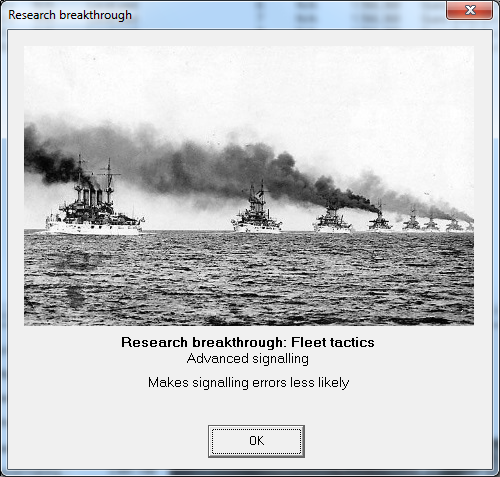
Cascadian submersibles again outscored the German U-boats, sinking 5 to their 2, but losing a sub in the process.
A German submersible operating out of Guam scored a success during a reconnaissance mission on Chuuk. The Cascadian minesweeper Argonaut was sunk in a gunnery duel with the U-Boat.
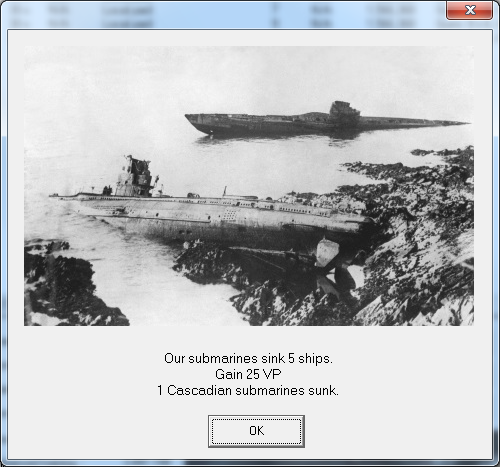
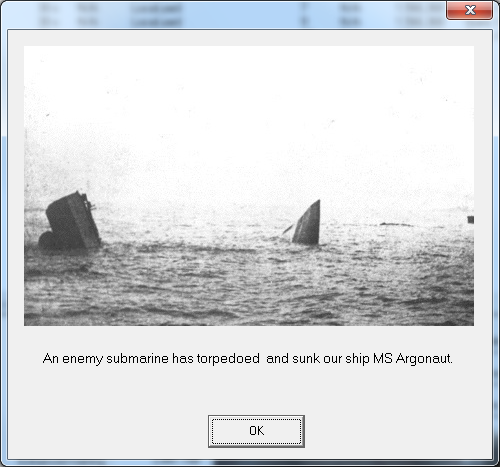
The German cruisers Hertha and Victoria Louise continued to terrify Cascadian merchant ships and insurance providers. Hertha claimed three ships in the Central Pacific and Victoria Louise claimed three while dodging patrols between Hawai'i and North America.
The Cascadian government ultimately filed a protest in Mexico City, accusing the Mexican Empire of providing supplies for the German raider. The Mexicans hotly denied the allegation.
Meanwhile the Las Vegas continued her efforts in the East Indies, claiming two German ships before the year ended. And while on patrol off China, the Stockton caught and sunk a German merchant attempting to slip out of Shanghai.
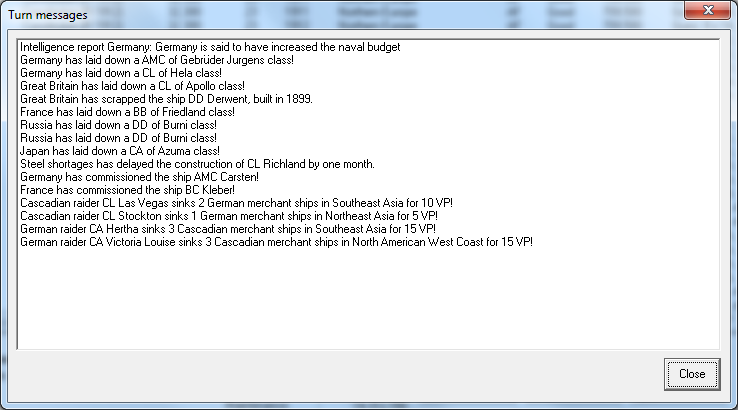
Cascadian naval ships assigned to the British blockade of Germany proposed a coastal raid on German targets. The raid was declined.
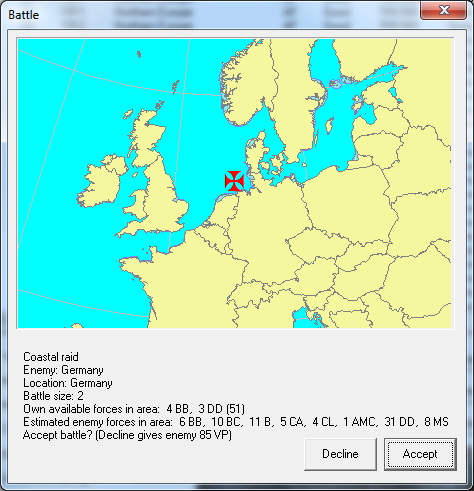
On the 9th of December, the CRS Bakersfield encountered the German cruiser Stuttgart near Samoa and sank her after a gun battle and a direct torpedo hit.
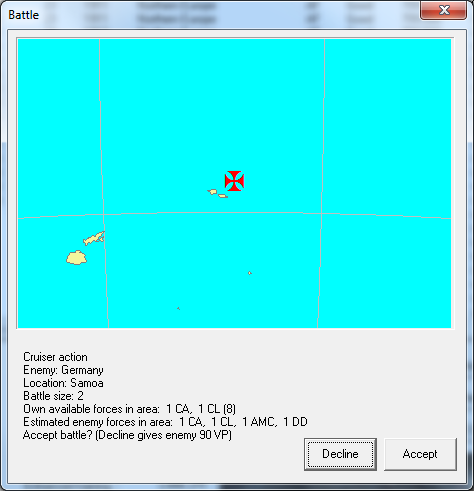
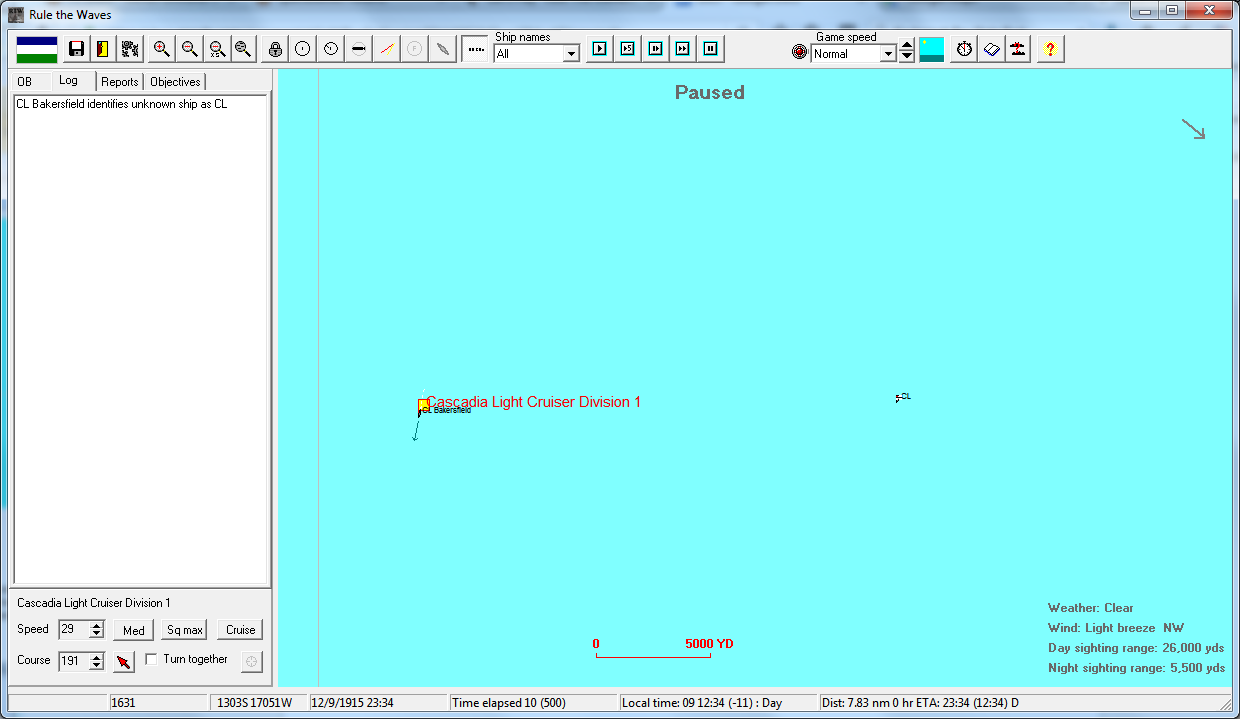
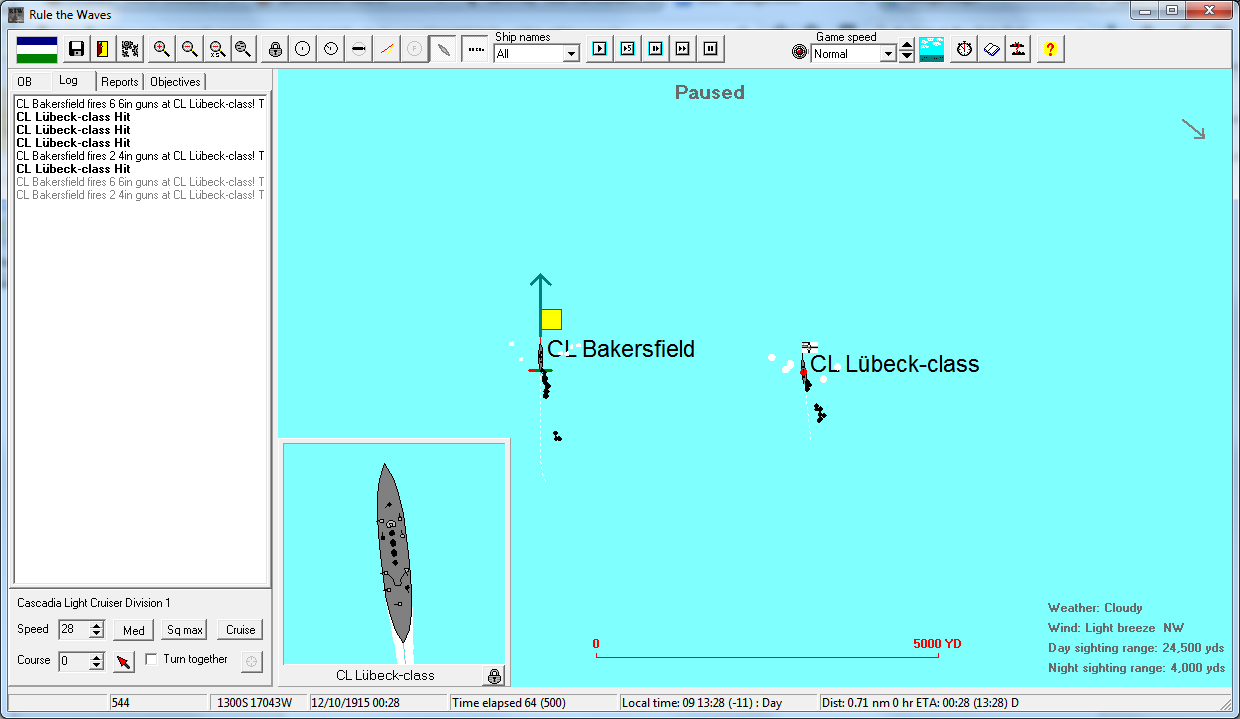
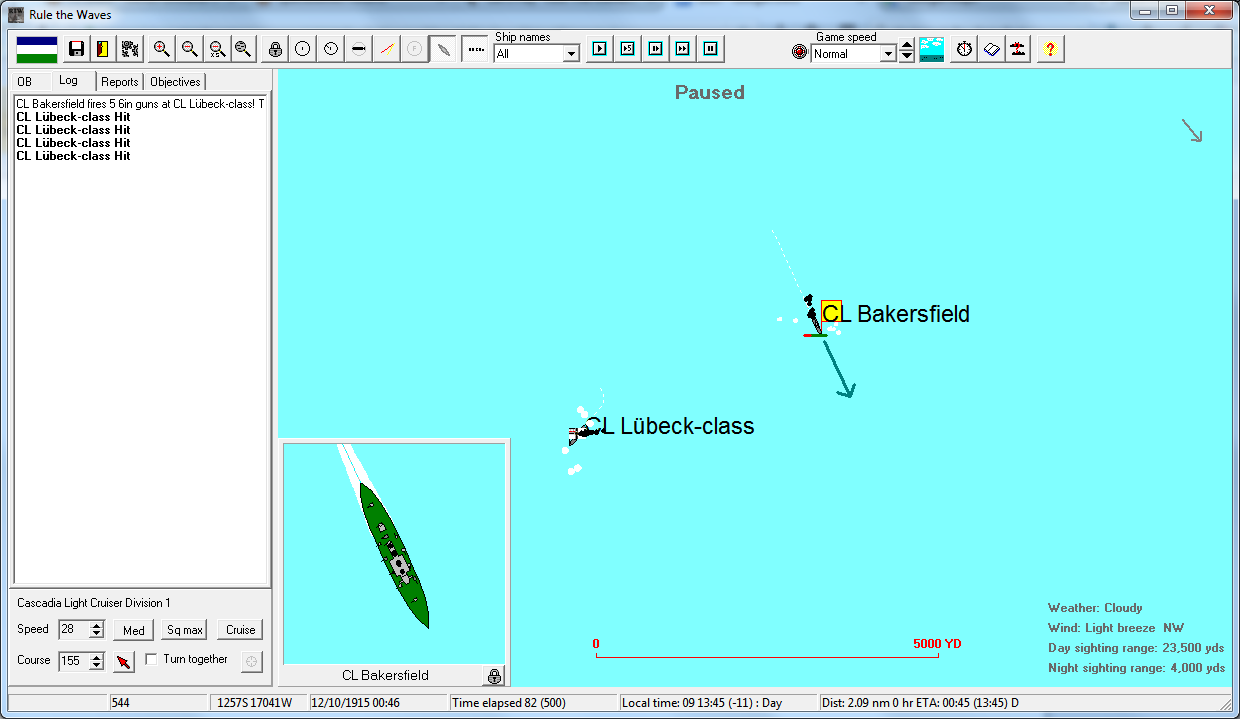
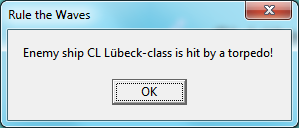
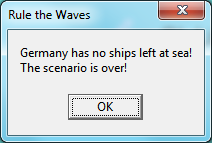
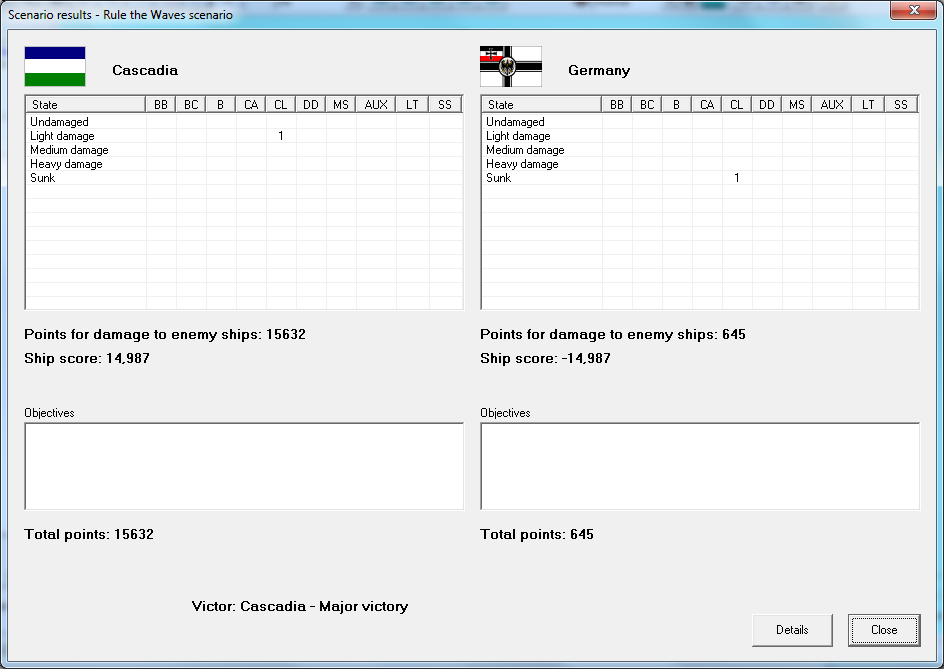
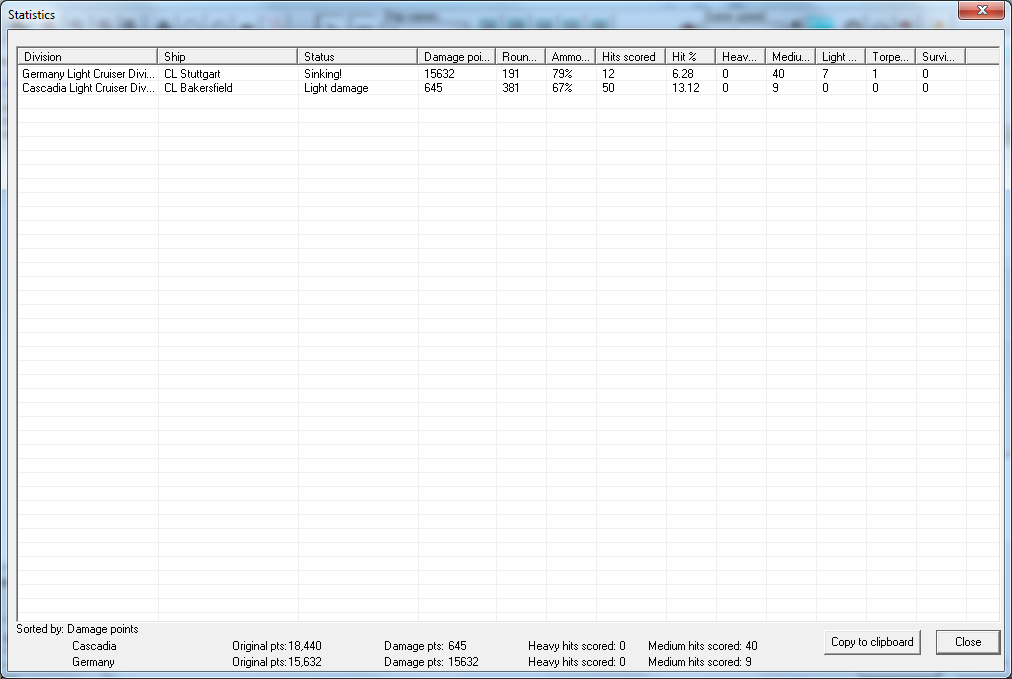
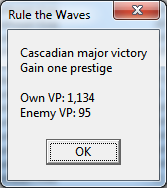
Steel shortages again afflicted naval construction efforts, delaying the Richland.
After the rejection of the German peace offer, Admiral Garrett met one-on-one with President Lakeland. He pointed to the situation, the difficulty in getting the Army to agree to risk the high casualties of an amphibious invasion in the Pacific, and argued that the only way to get Germany to surrender those colonies was to make them give them up in a peace treaty. The best way to accomplish this was not by invasion but by blockading Germany alongside the British. "Cascadian possession of the German Pacific Islands and Sumatra can only be obtained decisively by a German submission in the war, and that means a blockade."
After hours of arguing and plying maps, the President acquiesced to the Admiral's strategy.
The bulk of the Cascadian fleet was ordered to England.
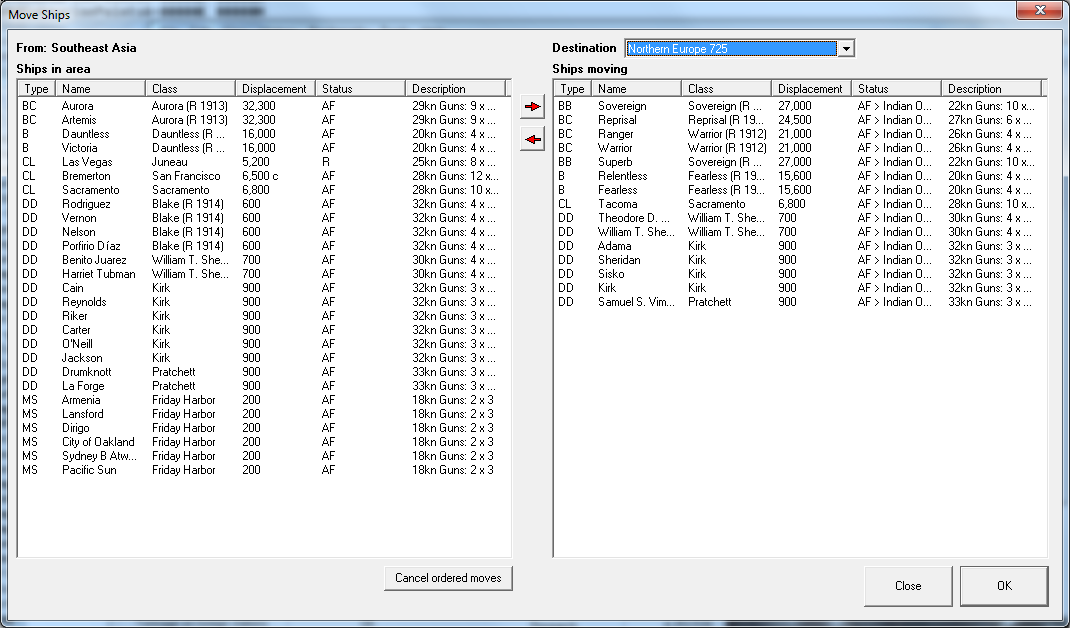
July 1915
The Warrior's condensor broke down as the ship attempted to leave Tsingtao. The battlecruiser was forced to return and undergo repairs.

All but one of the Blake-class destroyers finished their reconstructions.
With the onset of the war, the joint tactical studies between the Cascadian Navy and the Royal Navy continued, providing improvements to the fleets' tactical capabilities.

The submersible fleets continued their raiding. Six German ships were lost to Cascadian subs and the Germans managed three sinkings of Cascadian merchant ships.

The Juneau caught and sunk a German merchant in the eastern Pacific.
The Amazone's raiding career was reported to have ended with internment in French Indochina after exhausting fuel chasing British merchantmen into Hong Kong. This would later prove incorrect.

Juneau sinks 1 in NAWC
German raider Amazone interned for lack of fuel
The Royal Navy conducted a bombardment of Dar-es-Salaam.


On July 22nd the Reprisal, freshly-repaired, intercepted the German cruiser Nymphe roughly 140 nautical miles east of Singapore. The German ship was sighted at 1605 local and the order was given to engage.

Twenty minutes of chase later the class of the enemy was identified - Gazelle-class, a protected cruiser - and the Reprisal continued to engage. She scored her first direct hit at 1639.

Numerous hits would be scored over the next hour. At 1702 the rudder of the Nymphe was damaged by a 5" shell from Reprisal. By the time twilight had fallen, the Nymphe was doomed. She sank to the bottom of the ocean at 1807.






August 1915
The Cascadian submersible campaign received reinforcement with the commissioning of three new medium-range submersibles, the Mako, Hammerhead, and Barracuda.

The last Blake-class DD finished reconstruction and returned to fleet service.
Grant finished reconstructed

UK research helps light forces and torp warfare
Naval Artillery reported that Reilly & Colette had finished work on an improved 13" gun.

Cascadian submersibles sank 4 German merchants in the month while losing 2 of their number to German defenses. The Germans' U-boats scored 2 Cascadian kills.
The Las Vegas sank a German merchant north of New Guinea. The German cruisers Hertha and Medusa terrorized the sea lanes between Cascadia and Hawai'i, sinking 3 ships altogether in the month, while a merchant carrying rubber from the Belgian Congo was lost to the Victoria Louisa on her way to checking in on Cameroon, besieged by the British colonial forces operating out of Nigeria.



CRS John Q. Adams
South of the Kenai Peninsula, Alaskan Waters
August 1915
Commander Peter Wallace (a distant cousin to the commander of the 1st Battle Squadron and occasionally confused for said cousin) watched the heavy storm-tossed sea with frustration. A German raiding cruiser had been spotted hours ago off of Afognak Island. The CRS Salem and her escorting ships, including his own destroyer, were chasing the offending cruiser toward what looked to be one of the windiest summer storms he'd seen in the North Pacific.

The chase had started at 0925. It was now approaching 1110. The enemy cruiser had been riddled with several shell hits but seemed to be steaming on strong. Salem still smoldered from the fire that had been set to her earlier by an enemy hit. Undoubtedly Captain Altmark was just as eager as he was to get to grips with the enemy and send them down. If they could catch them before the storm worsened…
There was a burst of flame from the damaged enemy cruiser. They were firing on their pursuers again. Wallace watched with binoculars, waiting to see if anything on the enemy was yet hit by the fire coming down on them.
There was a flash of sudden light. A thunderous roar rippled across the sea. Startled, Wallace turned his head in time…

...to see what was left of the CRS Salem begin slipping into the Alaskan sea.

"God Almighty," he swore. The Germans must have caused a flash fire in the turret or magazine...
Then another thought came. With Altenmark dead or out of communication, he was in command of the force.
He knew immediately that he had to try and finish off the enemy cruiser. It couldn't be allowed to escape. "All ahead, flank!", he shouted. "Chase her down!"
"But the storm…"
"Dammit, man, we must catch her!", Wallace screamed.
And chase her they did, but their speed advantage was nullified by the stormy sea. Try as he might, Wallace couldn't overtake the damaged enemy ship. And the storm grew fiercer and fiercer. Just after 1400 they entered the storm proper and visibility dropped to almost nothing.
"We won't hit anything in this, sir!", Lt. Commander Gosnell insisted.

But he kept the chase on. For another hour. Two. But the storm was too fierce. Spent and frustrated, Wallace realized he could endanger his own ships if he continued.
When the German cruiser disappeared into the heaviest part of the storm at 1600, he knew the chase was over.



The Navy ordered four new submersibles to make good on war-time losses.

September 1915
During engagements in the war, the Royal Navy found that their fuzes for naval ordnance were not up to desired standards. They requested a license to manufacture superior Cascadian fuzes. At Admiral Garrett's behest, the Naval Office agreed to the terms of the license purchase.

The Admiralty was informed that work was completed on a new triple torpedo mount for future ship designs.

The submersible campaign continued on both sides. Cascadian subs claimed 4 German ships, losing one of their number during the month. The Germans only managed to sink 1 Cascadian merchantman in the Indian Ocean while losing one of the submersibles assigned to the Pacific to Cascadian anti-submersible patrols.
The cruiser Hertha claimed two Cascadian merchants en route to China in the waters off of Japan.
The losses to the German merchant marine since the start of the war sent a shock through the German economy, causing a painful increase in prices for numerous items, including food.


German raiding cruisers withdrew from a potential engagement off of Victoria Island.


The Cascadian fleet was also on the movie in the Central Pacific.


The Aurora and Artemis, with escorting destroyers, attempted a raid on Kavieng on New Ireland. After spending the night seeking targets in the limited visibility, they spotted German ships with the coming of dawn, first contact being at 0745.
Two enemy battlecruisers, the Thetis and the Prinz Eitel Friedrich of the Derfflinger, led a small force of escorts and engaged the Aurora and Artemis west of Kavieng.

The initial exchange of fire led to an early German success when a shell destroyed one of Aurora's main turrets at 0759. With one turret out, she still managed a return hit on the Prinz Eitel Friedrich a few minutes later.

The Artemis soon became the focus of the German ships. She was hit again and a fire began to rage on the vessel, only being extinguished toward the end of the hour. The two Cascadian battlecruisers meanwhile inflicted their own hits on the Prinz Eitel Friedrich, damaging that ship extensively and knocking out two of her turrets.

The German ships decided that they'd fought long enough and, with extensive damage on the Prinz Eitel Friedrich, retired into the waters of Kavieng, behind the suspected minefield that the Cascadian cruisers didn't dare enter (Translation: the game will not let you enter the blue circle. Which actually makes this coastal raid mission virtually impossible to win because the bombardment target assigned to Kavieng is literally beside the port and thus in the middle of a 40,000+ yards wide exclusion zone created by the suspected minefield, so only the largest and longest range guns on a clear day have a hope of hitting the damn thing).

Even while withdrawing, the Germans were still delivering solid hits to the Cascadian ships. At 1006, damage from German shells knocked out electrical power on Artemis, leaving the Cascadian battlecruiser flooding and crippled. It took over an hour for the Artemis' damage control teams and engineering crew to get main power restored to the ship. The battered Cascadian battlecruisers withdrew, conscious of their exposed position. During their withdrawal, a bulkhead on the Artemis failed and the ship was threatened with further flooding. Thankfully the damage control teams, exhausted as they were, got the flooding under control.
The Admiralty was humiliated by the battle. While neither ship was sunk, they would require time in the repair yard at Chuuk before being combat capable again, and the German press was quick to laud their Pacific squadrons for their firm repulse of the Cascadian raid. The failure of naval intelligence to identify the extent of the German minefield and the impossibility of hitting any useful German targets without braving said minefield was a further blow to Cascadian prestige and morale. Several newspapers criticized Admiral Garrett personally for approving the raid and for not having the fleet in place at the start of the war to hit the Bismarcks before the German minelayers had finished their work.



With the loss of the Salem, the Navy laid another Vancouver-class cruiser, the Esquimalt, to replace the loss.

After months of preparation, the British forces in Kenya invaded Tanganyika, looking to take the pressure off of the Anglo-Portuguese forces fighting both German colonial troops and Mozambiquan rebels in northern Mozambique.
Several early skirmishes saw British successes that opened the interior of the colony to them. But there was no pullback from Mozambique as expected, and the Germans were holding firm on the vital coastline of the colony after the defeat of a British amphibious attack on the northern port of Tanga.
October 1915
Cascadian Naval Intelligence reported a slight victory in recovering blueprints on the work being done in German yards on the cruiser Niobe.

The German submersible campaign proved the more effective in October. They claimed three Cascadian ships across the globe without a single loss while the Cascadian submersible fleet failed to engage any target effectively. The Las Vegas sank two German ships in the East Indies, but those losses were countered by Cascadian losses to the cruisers Hertha and Gefion.

Convoy attack of Saipan - Warrior leads La Forge,Diaz, Drumknott, Tacoma, Sacramento against convoy on October 26 1635 local

Near the end of the month, the Warrior led a force of destroyers and new scout cruisers against a German supply convoy heading toward Saipan. Contact was made at 1710 on the 26th of October.

The enemy transports were quickly overwhelmed by the Warrior and her escorts.


The German battlecruiser Prinz Eitel Friedrich was spotted to the northeast. Late from departing Saipan due to a submarine scare, she was too late to save the convoy but still a grave threat to the older, less-heavily armed Warrior.

A short exchange of shells happened as the Warrior withdrew south with her escorts. The destroyers Drumknott and La Forge were severely damaged by the end of the battle.
During the fighting, the German cruiser Hela was hit by a torpedo and sunk.
Had the Prinz Eitel Friedrich been given more daylight to work with, the action would likely have turned against the Warrior. But night fell before they could land any significant hits on the prototype battlecruiser of the world. Warrior withdrew in victory.




Meanwhile some cracks showed in the alliance with Britain. Despite expectations, the Royal Navy had not yet consolidated an entirely effective blockade of Germany, which was receiving further supply by buying grain from Soviet Russia and even France. Admiral Garrett wired to London with inquiries as to what was holding back British efforts. The response that the British lacked the ships to properly establish a blockade due to the needs of the Indian Ocean seemed ludicrous.
Ludicrous, that is, until the Admiral received the following British request. The British were understandably reluctant to rely entirely on Cascadian protection for their colonies. Not when Lakeland was publicly vowing invasions of German colonial possessions, invasions demanding that the bulk of the Cascadian fleet remain in the Pacific to suppress the German battlecruisers from opposing the invasions being planned. The British were instead insisting that the Cascadian battle fleet join Home Fleet in the North Sea. This would effectively bottle up the German fleet in the North Sea and enable a proper blockade to be enforced.
It also flew directly in the face of Lakeland's strategy, as Lakeland wanted the fleet kept in the Southeast Asian-Central Pacific waters to support invasions of Sumatra, the Bismarcks, and the Marianas. He had protested even the partial deployment of a couple of the Constitution-class battleships to join the British Home Fleet.
For the Admiral, he now had to decide whether to give in and accept the British requests, or keep the fleet in position to support the President's invasions.
Garrett House
West Portland, Oregon
30 October 1915
Rachel had noticed the foul mood of her husband in the prior months. He was not new to facing public scorn - the Socialists had always vilified him as a militarist and imperialist - but the insults from the press over the defeated raid on the Bismarcks had stung personally. Added to that were the accusations of lethargy in deploying the fleet before the war broke out.
"The Socialists attack me for provoking conflicts with Germany," Admiral Garrett groused angrily. "Now the Conservatives attack me for not provoking conflicts." He thumped a copy of the day's Oreganian. "They still rave about the deployment of the fleet when the war broke out. These fools would have provoked the war had they been given their way. We would have lost the moral edge we now enjoy over Germany. Their invasion of Mozambique paints them as the aggressor without doubt."
"I know dear." Rachel breathed a sigh. That she could breathe easily was not to be taken for granted. Her health finally seemed to be recovering.
"The war has not gone superbly, true. Fortune has not been on our side yet." The Admiral thumped the table with his fingers. "But time is on our side. Time. Germany will be strangled by blockade as soon as the British get their act together and can maintain it."
"I understand."
Something in her voice broke through his frustration. He looked at her intently. "Darling?"
"I had hoped that maybe this war would be like the one in 1903," she said quietly. "That it would end quickly. And then you could retire…"
"Ah." He nodded. "I can understand that wish. But we can't keep going to war with Germany every five years, love. Sooner or later, we must put an end to this cycle. Germany must be brought to heel."
She nodded quietly. It was clear his answer did not satisfy her.
The Admiral put a hand on her arm. "I know you're disappointed, Rachel. I promise you, the Naval Secretary will receive my letter of resignation as soon as the war is over. I swear it to you, love. Let me attend to my duty and this will be over."
Before more could be said there was a sound of wood clashing with wood coming from the hall. Two smaller forms, none higher than four feet, moved through the door. Gabriela was immediately recognized, wearing her long and dark hair in a ponytail the way she always did, dressed in shirt and trousers taken from her brothers' old things. Her compatriot, with a slightly more bronze complexion, had similar attire on. Isabela Talaverda, daughter of a Senator from Lower California, was the one friend Gabriela always spent time with.
The Admiral was beginning to realize it was because the young lady was the only girl in the capital's schools that could match Gabbie's endless supply of energy, and endless need to expunge it in ways young ladies usually did not.
Dueling with wooden swords in the halls being one particularly-unwelcome method.
"You will stop right this instant!", Rachel shouted. A clack of wood on wood nearly interrupted her in that order. But there were no further noises as the two girls stopped their duel and looked to Rachel with a mixture of surprise, worry, and defiance. "I cannot believe your parents think is acceptable behavior in the house, Isabela!"
Gabbie's friend squirmed a little in response. No, they quite clearly didn't.
"And Gabriela! You should be studying! Both of you!"
"It's Saturday, mama," Gabbie protested. "We did our work for the weekend already."
"And so that is that? You will not do extra?" Rachel shook her head. Her frustration was evident. "How can you expect to get ahead just by doing what is expected? You must go beyond expectations. Your sister is in university because of that."
Gabbie was clearly uncomfortable at that remark. Isabela had the look of someone who knew they were no longer central to the argument at hand.
There was enough stress in the family life already given the war. The Admiral motioned to the door. "Why don't you head to your room, Gabbie? Surely there are books your friend will find interesting?"
Neither were clearly interested in that. But while only eleven now, they could see the offer being given to them and accepted it. They ceased the argument and left toward the stairs.
"How can she be so unlike her sister?", Rachel sighed. "I had such high hopes for her too."
"I'm sure she'll come around," the Admiral stated. Although he had no way of knowing how accurate or inaccurate that statement would prove.
In East Africa, the brilliant German general Paul von Lettow-Vorbeck continued to stymie British operations in Tanganyika. The loss of the border skirmishes the prior month had been to allow Lettow-Vorbeck to assemble the Askari fighters under his command into a more coherent force. With his combined unit of German and local troops, Paul von Lettow-Vorbeck launched several successful attacks on British forces in northern Tanganyika, recovering several interior towns and villages by overwhelming isolated garrisons.
The British commanders in Kenya called for reinforcements from other colonies.
Meanwhile, German troops continued to advance successfully in Mozambique, taking advantage of the ongoing rebellion in splitting the Anglo-Portuguese forces. By month's end, the German forces were nearly to Pemba. In light of the threat, the British appealed to the government in South Africa to provide an army to counter-attack Germany. The South African response to the war was ambivalent - their price tag was that the British government let them seize Namibia from Germany and get Lisbon to give them concessions in Mozambique. Nevertheless, a South African army under Jan Smuts was organized to join the fighting in Mozambique.
November 1915
The yard expansion projects ordered the prior year finished.

British design planners provided concepts for improved damage control and subdivision layouts to Cascadian experts. New plans for Triple Bottoms were a direct result of this exchange.


Reilly & Colette's Armory Works division reported to Naval Artillery that they had a working model for a new 16" naval gun of greater quality than had initially be considered possible. The news was welcome in the Admiralty, already working on a new battleship design with the scheduled 1916-17 completion of the Gallant-class battlecruisers.

The raiding campaigns continued, with a slight edge for Germany given its greater fleet of raiding cruisers. The Cascadian submersibles claimed three sinkings for the loss of another sub. German subs claimed 2 sinkings with no losses. The Las Vegas claimed two more sinkings in the waters of the East Indies, matched by the German cruisers Hertha and Amazone (Not interned as believed) continuing their established raider careers. The Victoria Louisa claimed another ship near New Caledonia in the South Pacific.

A light engagement in the Straits of Malacca saw the German destroyer S16 heavily damaged by British gunfire.

And the seas off China were the site of another small naval fight.


Meanwhile, on the 9th of November, the German cruiser Ariadne was spotted near the Liaotung Peninsula by the Cascadian China Squadron. The San Francisco and Walla Walla spotted the vessel at 1555 local time.
A chase began as twilight approached. The Ariadne was identified as Gazelle-class at 1620, a half hour before twilight. The German ship continued to flee, looking to escape after the fall of night made visibility beyond 3,000 yards impossible.

At 1708, after over an hour of chasing and shooting, the Walla Walla drew close enough to land five hits on the German cruiser.

A minute later each cruiser landed three more shells on the doomed German ship, to be followed up by another thirteen hits together two minutes later. This brutal pummelling was too much for the old protected cruiser, which started sinking at 1715.





A steel shortage resulted in a delay of one month for the construction of the Esquimalt.
Esquimalt delayed due to steel shortage
The German invasion of Mozambique reached a fateful point. The German colonial forces outmaneuvered Portuguese and arriving British forces and besieged Pemba. The British, continually flustered by the direction of the conflict, put out an immediate request for Cascadian troops to assist in the campaign. The fall of Pemba would make supplying troops in northern Mozambique nearly impossible, costing Portugal the northern half of their colony.
Meanwhile Lettow-Vorbeck continued to frustrate the British invasion of Tanganyika. He inflicted a significant defeat upon the British at Arusha, threatening British supply lines into the interior. When concentrated British forces finally came upon him toward the end of the month, the German commander and his Askari troops avoided the trap and slipped away with few casualties.
Von Lettow-Vorbeck's successes, wired back to Europe via neutral Belgium, were electrifying the German populace. Despite the hardships of the ongoing Anglo-Cascadian anti-shipping campaign, the German people remained loyal to the war effort. They seemed to be winning this time and their successes in the Pacific were boosting national trust in the Navy. For the moment, it was the German Navy, not the Army, that was the nation's premiere service.
December 1915
On December 5th, Pemba fell to German troops.
Two days later, Paul von Lettow-Vorbeck encircled and forced the surrender of a significant force of British colonial troops near Babati. German morale reached a feverish peak, as their arms seemed to be successful across the globe.
In light of their battlefield successes, the Germans proposed a peace treaty to the British and Cascadians. It called for the cession of northern Mozambique to Germany, limitations on Cascadian naval strength operating in the Philippines, and the cession of the eastern Samoa islands to Germany for a South Pacific naval station, as well as reparations for the losses to German shipping.
The prospect of peace seemed higher than expected. The fall of Pemba and the surrender at Babati toppled Asquith from the Prime Minister's chair with a vote of no confidence. The Conservatives, under Bonar Law, offered a National Coalition government to the Liberals, but their terms were considered unacceptable for the scope of the situation. David Lloyd George put together a new Government and managed to win House approval for it and to continue the war. Even the Conservatives voted with his Government against a peace vote by dissident Liberals and Labour Party MPs.
Britain was resolved to fight alone if she had to. But she did not. In Portland the Socialists were quick to support the German peace offer, as they were already opposed to Cascadia's "imperialist ambitions" in Asia. But the discontent with the war was still very low and patriotic fervor at a high. Lakeland insisted on rejecting the peace offer personally, but acquiesced to a Cabinet vote insisted on by Burgess. Burgess feared letting Lakeland control too much of the war effort due to remembering his behavior in the prior war.
In the Cabinet, several secretaries supported the idea of asking the Germans to negotiate the terms down, but to accept in principle a reduction of Cascadia's naval presence in the Philippines which, they pointed out, was usually not high even in peacetime as it was.
Naval Secretary Santiago thought he saw the winds blowing toward submission and called in Admiral Garrett to brief the Cabinet. The Admiral was quick to dismiss claims that the Navy was losing the war. Responding to a remark from Interior Secretary DeWitt about the war "being against us", he stated, "These past few months, the tides have been against us, that is true. But war is not a constant tide. I remember when the Confederates seemed to be holding against us in the early 80s, Mister Secretary. Time still told against them, and ultimately the slavocracy of the South was extinguished. There is plenty of hope for the future of the effort. The Navy is growing stronger with every passing day. The war is not a lost cause. It is certainly not being lost to the extent that the German peace offer is reasonable. It is, sirs, an insult, and the honor of the Navy and of our Republic insists that we answer it with steel."
In the end, the Cabinet voted unanimously to continue the war.
Senator Flagg attempted to bring the Senate into a vote to compel the Government to begin peace negotiations, but he failed by a large margin. The Socialists in the House fared little better in their efforts to compel the Government.
And thus the war continued.

The Admiralty was informed that metallurgists for the Navy had completed testing of a new, improved homogenous armor for warships.
Naval Ordnance gave a glowing report on progress for new depth charge explosives, which would improve national efforts to deal with the German U-boats.
Experience in the war helped naval communications experts complete a system of new, advanced naval signals, including greater use of wireless radio communication.



Cascadian submersibles again outscored the German U-boats, sinking 5 to their 2, but losing a sub in the process.
A German submersible operating out of Guam scored a success during a reconnaissance mission on Chuuk. The Cascadian minesweeper Argonaut was sunk in a gunnery duel with the U-Boat.


The German cruisers Hertha and Victoria Louise continued to terrify Cascadian merchant ships and insurance providers. Hertha claimed three ships in the Central Pacific and Victoria Louise claimed three while dodging patrols between Hawai'i and North America.
The Cascadian government ultimately filed a protest in Mexico City, accusing the Mexican Empire of providing supplies for the German raider. The Mexicans hotly denied the allegation.
Meanwhile the Las Vegas continued her efforts in the East Indies, claiming two German ships before the year ended. And while on patrol off China, the Stockton caught and sunk a German merchant attempting to slip out of Shanghai.

Cascadian naval ships assigned to the British blockade of Germany proposed a coastal raid on German targets. The raid was declined.

On the 9th of December, the CRS Bakersfield encountered the German cruiser Stuttgart near Samoa and sank her after a gun battle and a direct torpedo hit.









Steel shortages again afflicted naval construction efforts, delaying the Richland.
After the rejection of the German peace offer, Admiral Garrett met one-on-one with President Lakeland. He pointed to the situation, the difficulty in getting the Army to agree to risk the high casualties of an amphibious invasion in the Pacific, and argued that the only way to get Germany to surrender those colonies was to make them give them up in a peace treaty. The best way to accomplish this was not by invasion but by blockading Germany alongside the British. "Cascadian possession of the German Pacific Islands and Sumatra can only be obtained decisively by a German submission in the war, and that means a blockade."
After hours of arguing and plying maps, the President acquiesced to the Admiral's strategy.
The bulk of the Cascadian fleet was ordered to England.

”A Radical is a man with both feet planted firmly in the air.” – Franklin Delano Roosevelt
"No folly is more costly than the folly of intolerant idealism." - Sir Winston L. S. Churchill, Princips Britannia
American Conservatism is about the exercise of personal responsibility without state interference in the lives of the citizenry..... unless, of course, it involves using the bludgeon of state power to suppress things Conservatives do not like.
DONALD J. TRUMP IS A SEDITIOUS TRAITOR AND MUST BE IMPEACHED
"No folly is more costly than the folly of intolerant idealism." - Sir Winston L. S. Churchill, Princips Britannia
American Conservatism is about the exercise of personal responsibility without state interference in the lives of the citizenry..... unless, of course, it involves using the bludgeon of state power to suppress things Conservatives do not like.
DONALD J. TRUMP IS A SEDITIOUS TRAITOR AND MUST BE IMPEACHED
Re: Let's Play "Rule The Waves" w/ Steve's Custom Country "Cascadia"
January 1916
Naval Ordnance reported the successful testing of depth charges. The Admiralty immediately signed contracts to produce the charges for distribution to the fleet.
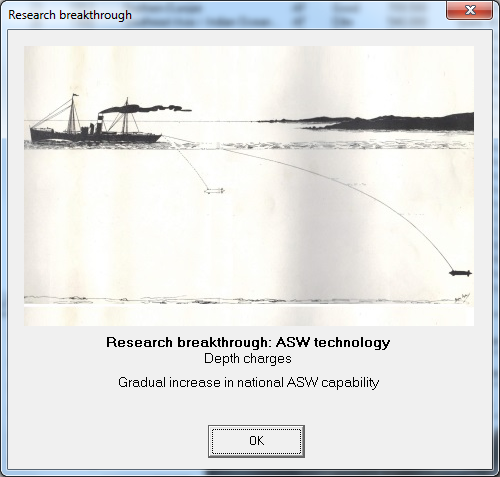
The German U-boats had the better month, sinking three Cascadian ships to the Cascadian subs' score of 1 German ship sunk. Both forces lost one sub.
The Cascadian surface raiders had the more successful month. Juneau sank a German merchant in the Indian Ocean and Las Vegas continued to rack up her score with 2 more sinkings in the East Indies. The German cruiser Gefion caught and sank a Cascadian merchant en route to Australia several hundred miles off of New Caledonia.
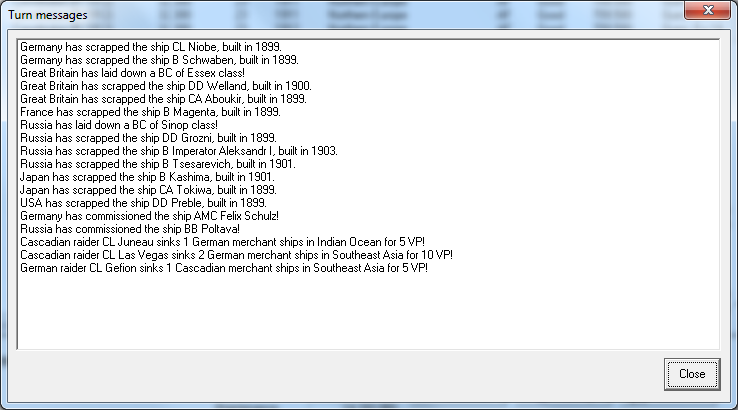
A small-scale naval skirmish in the North Sea saw a German minesweeper damaged by Royal Navy ships.
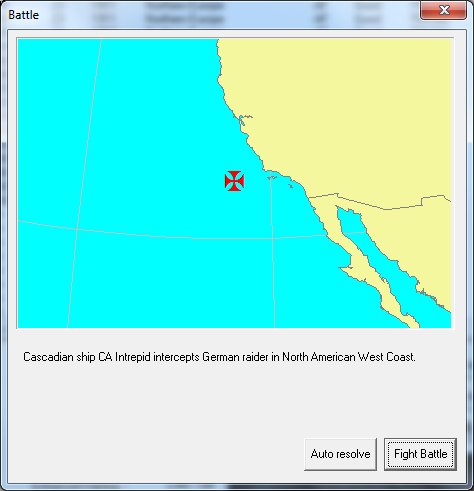
The armored cruiser Intrepid caught the Amazone off of California on the 21st of the month, finding her some time after dawn at 0830 local. A chase lasted for nearly two hours before the old armored cruiser's gunfire disabled the raider. At about 1100 the Amazone was sinking to the bottom of the Pacific.
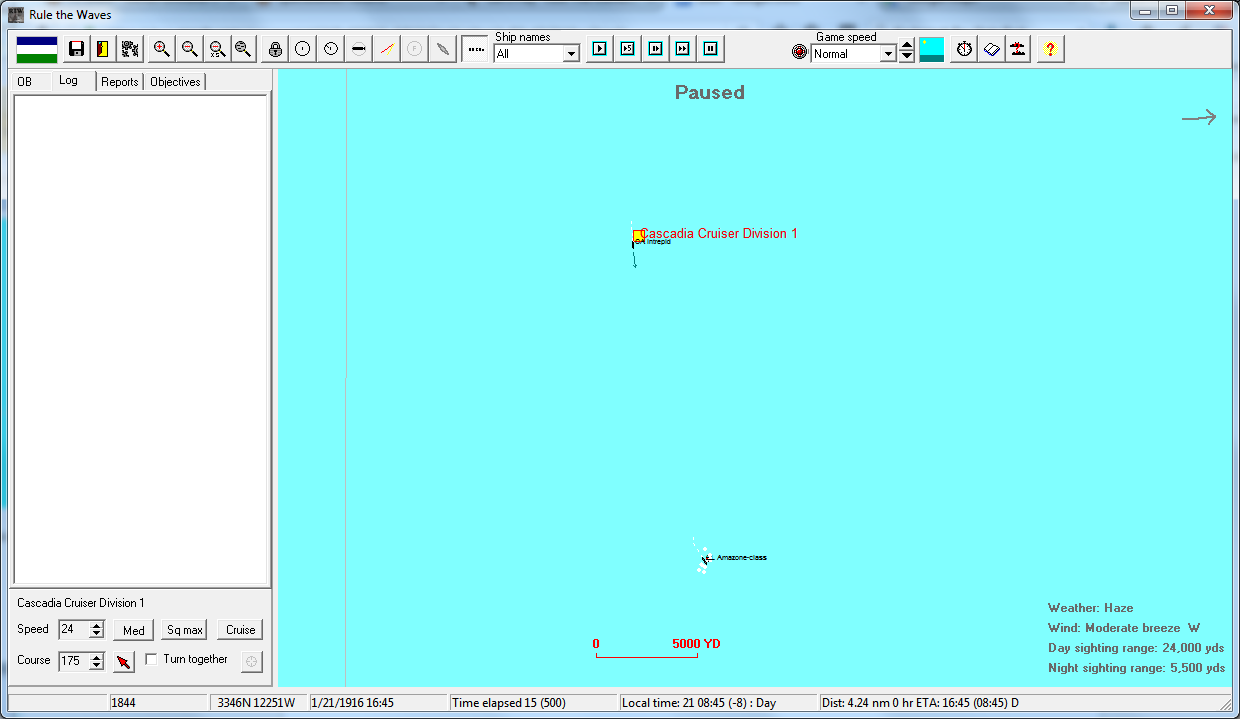
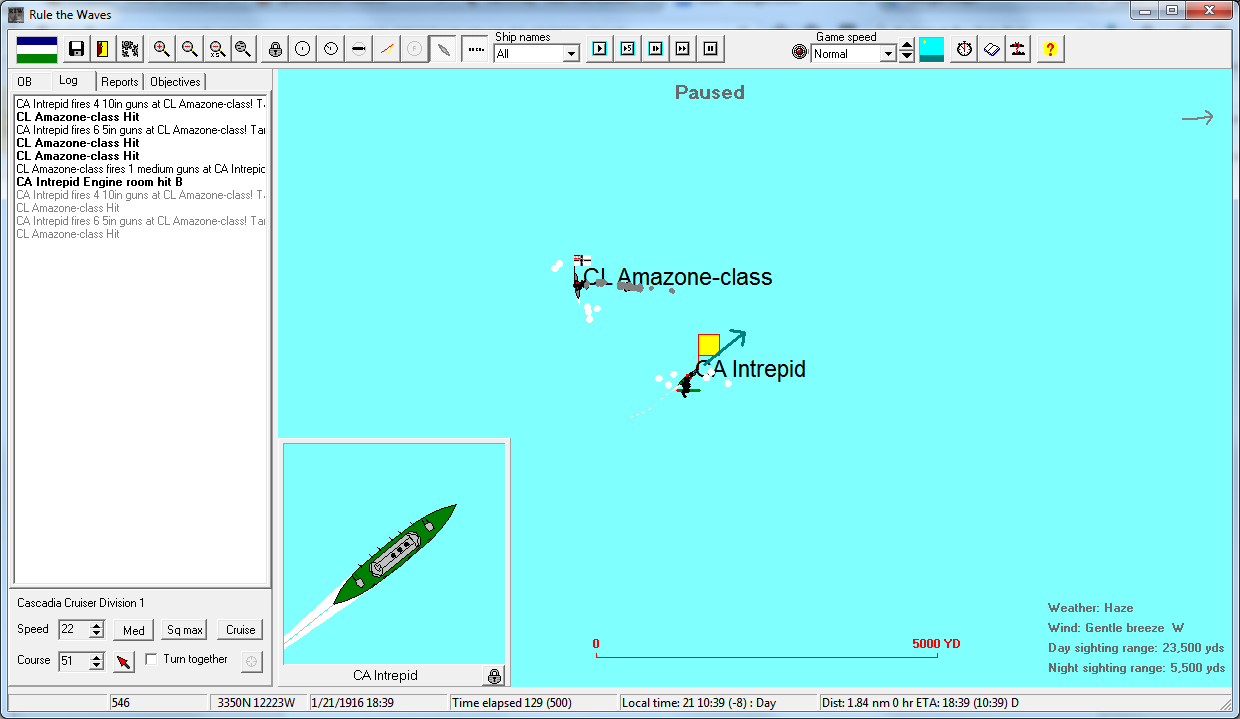
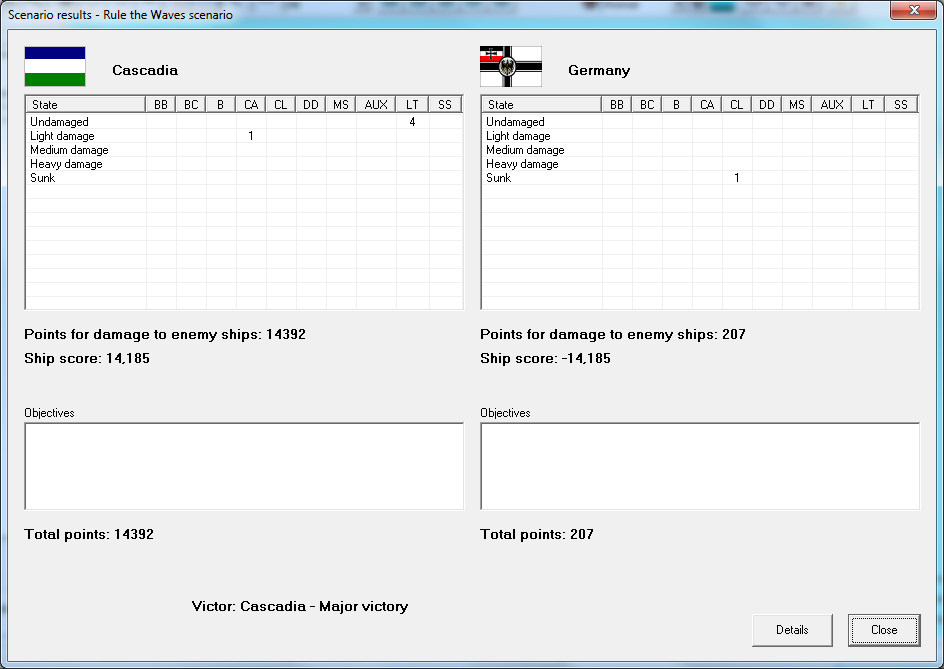
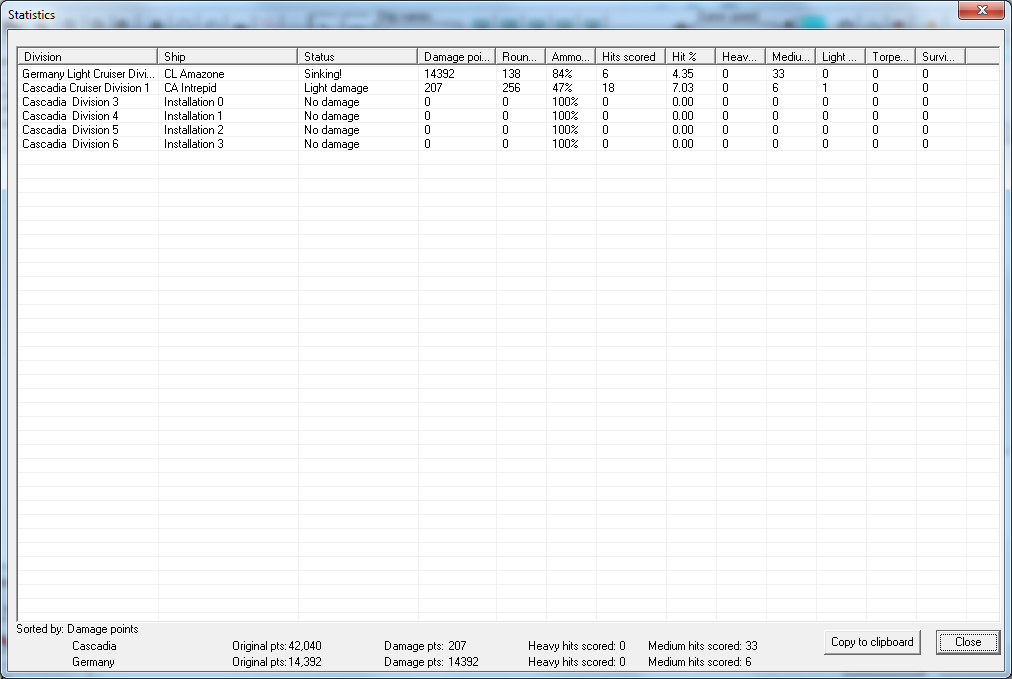
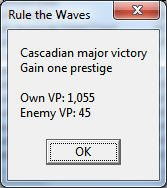
February 1916
The Cascadian fleet received a much-desired reinforcement with the commissioning of the battlecruisers Gallant and Courageous.
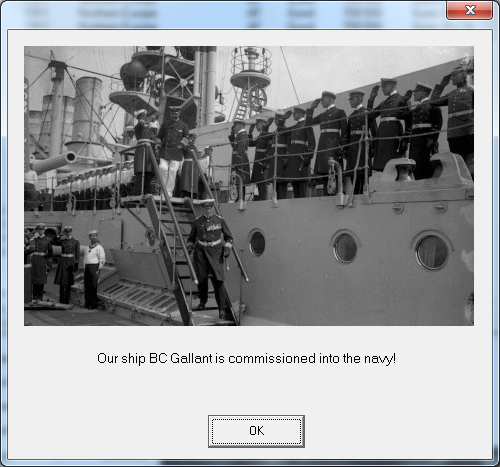
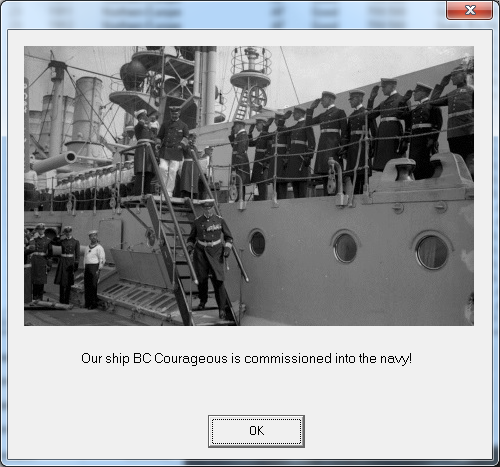
British experts continued to assist Cascadian designers with new subdivision schemes.
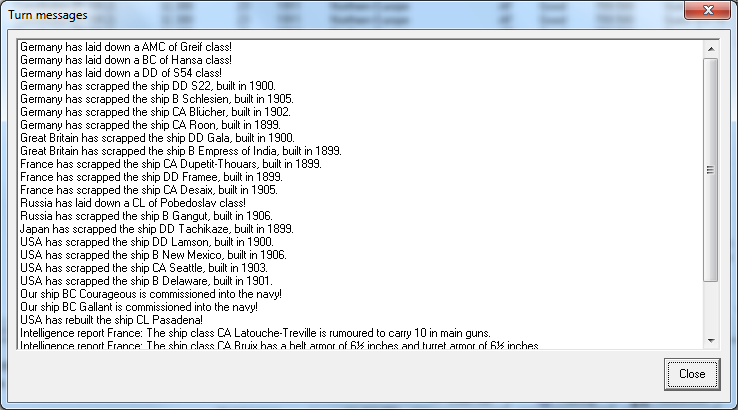
Preliminary designs for 1100t destroyers were offered to the Navy. Admiral Garrett turned them down for the time being - Cascadia's destroyer fleet was already of sufficient size, and he believed even larger destroyer designs would soon be completed.
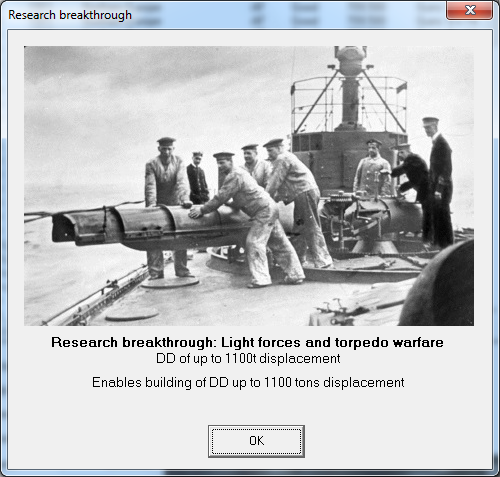
The war continued to enhance Cascadian fleet tactics.
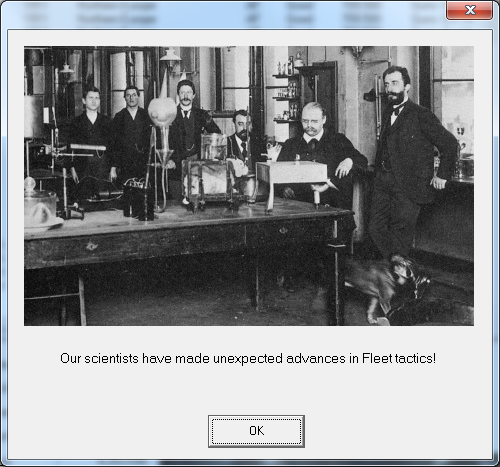
The Juneau scored the only kill for the Cascadian raiders in the month, sinking another German in the Indian Ocean. The German cruiser Gefion continued her raids out of the Bismarcks, attacking Cascadian ships en route to Australia and New Zealand. The German cruiser Medusa added to the count by catching and sinking a Cascadian merchant that had departed Amsterdam, provoking protest from Dutch authorities after reports indicated the Cascadian ship was sunk in Dutch territorial waters.

Another request to raid the German coast was denied by Portland. The bulk of the fleet was not yet in British home waters and no actions against the defended German coasts would be heavily contemplated until the entire fleet was on station.
North European coastal raid declined
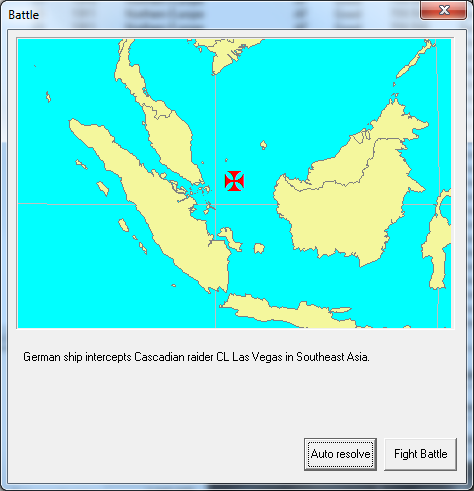
The German armored cruiser Furst Bismarck intercepted the Las Vegas on the 8th, catching her east of Singapore. The Las Vegas turned east and northeast to make for shelter in British Borneo, as a course to Singapore would be too dangerous for the cruiser given the positioning of the Furst Bismarck. Although the ship lost some power half an hour into the chase due to the age of the engines, she managed to stay ahead and lost visual contact at 1528. The Las Vegas returned to Manila for re-coaling.
March 1915
Efforts to develop inclined armor were undermined by a fundamental difference of opinion between two key armorers on the research team.
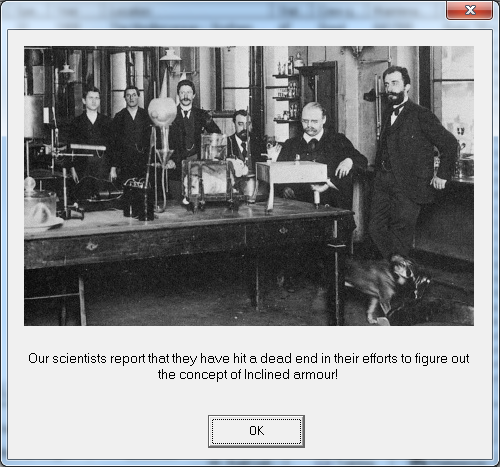
The month saw each side's submersible force sink 2 ships.
The German raiders Gefion and Gazelle each claimed a Cascadian vessel.
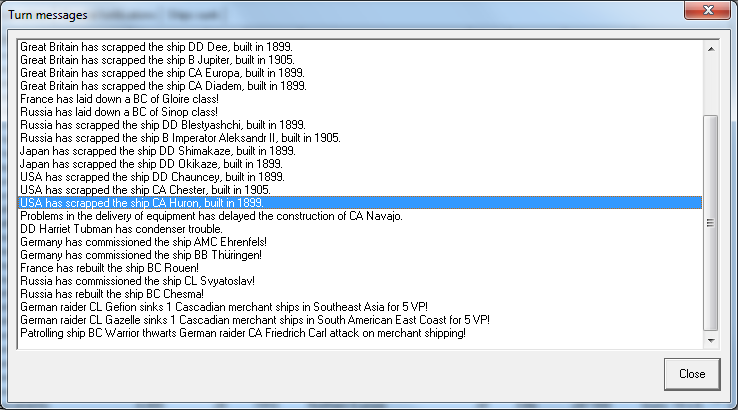
A naval skirmish between the German fleet and the Royal Navy saw the destroyer G40 damaged.
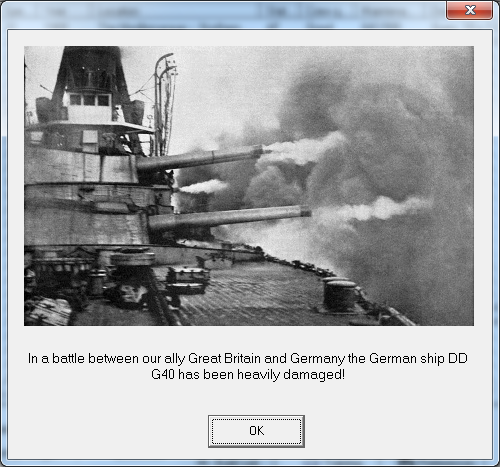
Admiral Garrett turned down another request for a coastal raid on Germany.
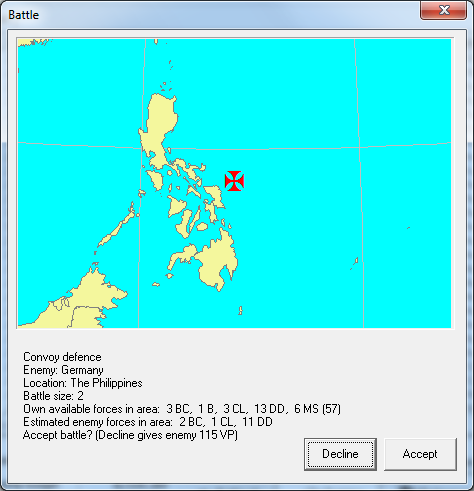
An inconclusive skirmish occurred near the Philippines toward the end of the month. On the 29th, the Diaz, Rodriguez, and Vernon encountered German destroyers out of Saipan that had spotted their convoy. The former two ships were damaged in a brief exchange of fire before the enemy retreated to the north. They shadowed the convoy but did not re-engage. Night fell and visual contact was lost.
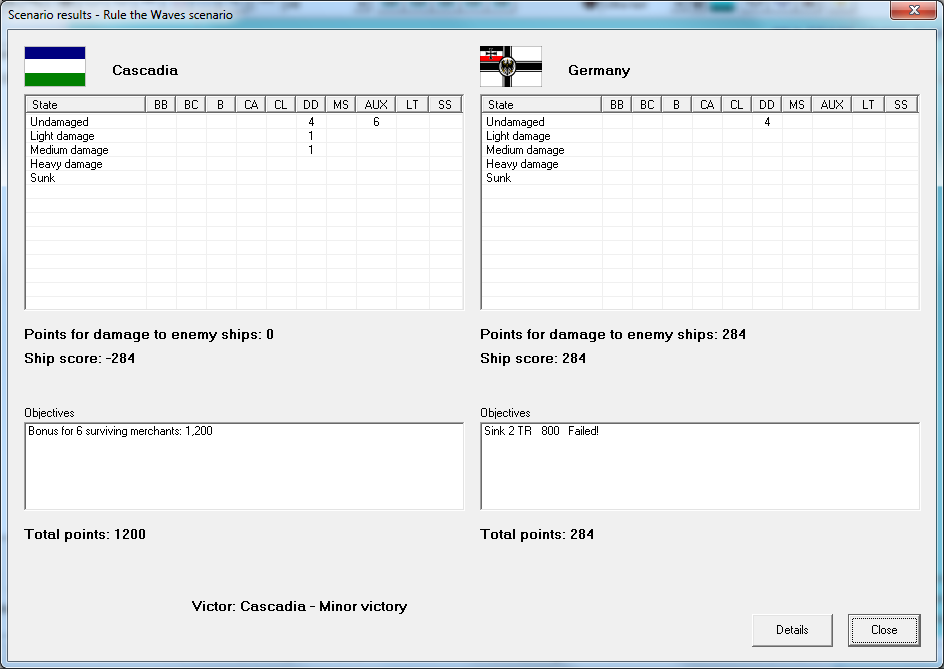
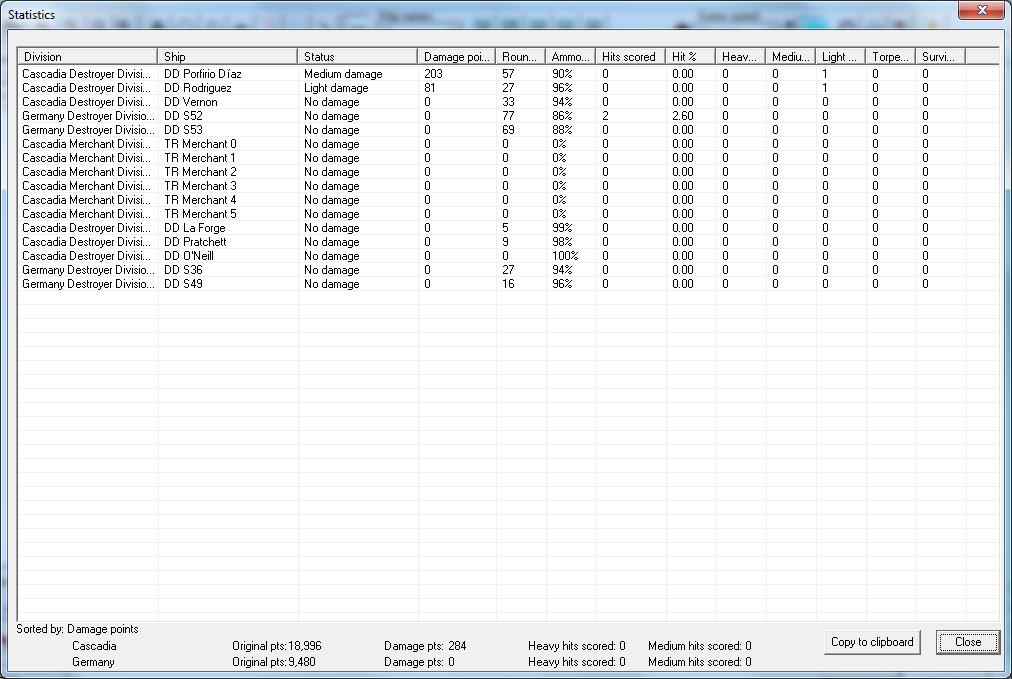
The Navajo's construction had to be halted due to a shortage in electrical wiring.
With the battlecruisers commissioned and the budget space freed up, Admiral Garrett ordered the laying of Cascadia's first battleship since the Constitution-class ships of the beginning of the decade. This new "super-sovereign" battleship was rated at a colossal 40,000T displacement and given the appropriate name Titan. It was armed with 10 of the new 16" naval rifles, arranged in two triple turrets at the A and Y positions with two super-firing double turrets at B and X. Eight double 5" turrets along the sides were joined by 20 4" deck guns as secondary firepower. The armor belt was a Navy-leading 14" thick with 3" deck armor due to increasing concern with plunging fire. The turrets were protected by even thicker armor. The engine plant would provide a design speed of 23 knots.
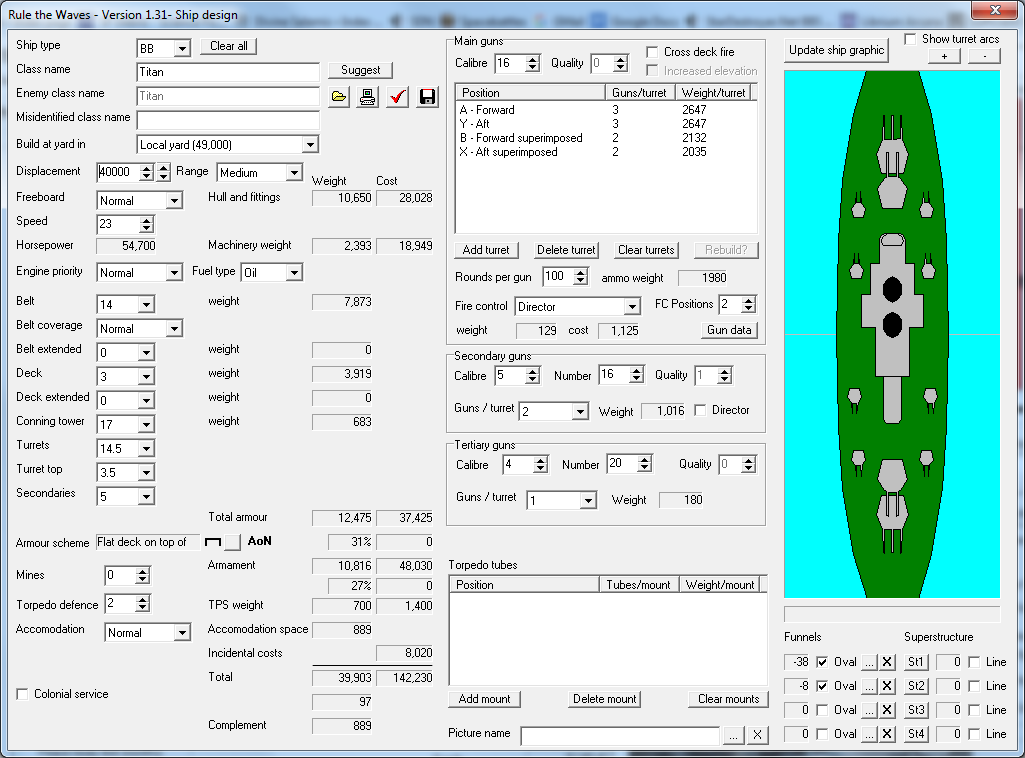
The Titan was laid at a new slipway at Reilly & Colette's yard in Bremerton. Burleigh & Armstrong received the contract to build another submersible, the Shark.
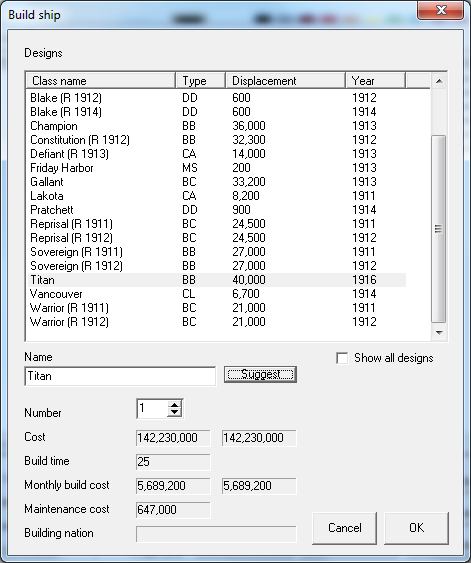
April 1916
Admiral Garrett received the pleasing news that smaller director firing units had been developed. These directors allowed both the installation of secondary director firing gear in capital ships, for their secondary batteries, and the installation of director gear into scout cruisers and destroyers.
The Naval Ordnance office reported that the munitions industry had successfully put into place new manufacturing practices to improve the quality of AP shells.
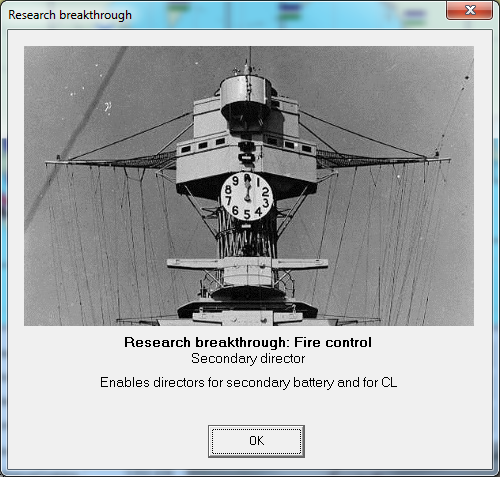

The German U-boats sank two Cascadian merchant ships west of Ireland during the course of the month.
The Juneau was forced to put into dock due to mechanical problems.

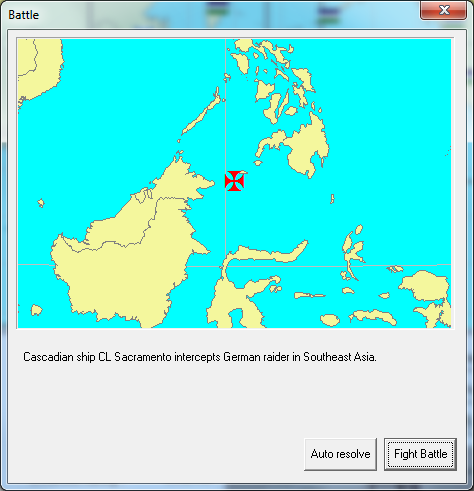
The Sacramento intercepted the Gefion in the Sulu Islands and sank her after a 90 minute battle.
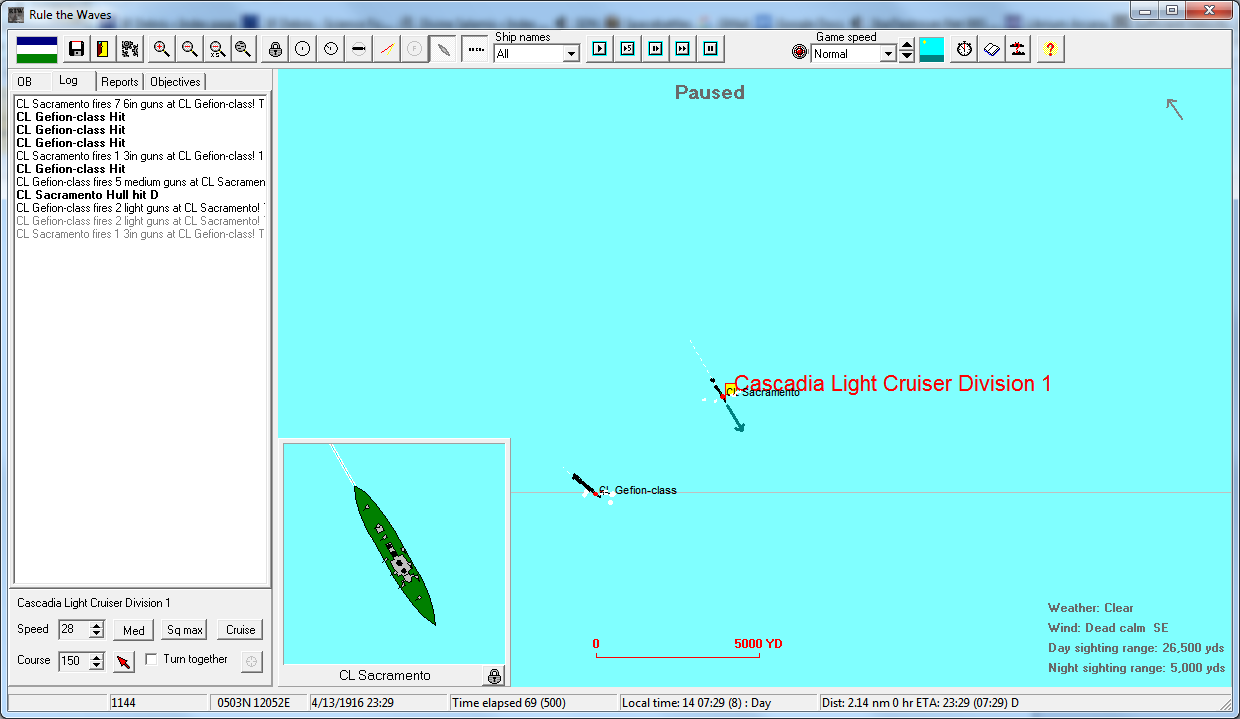
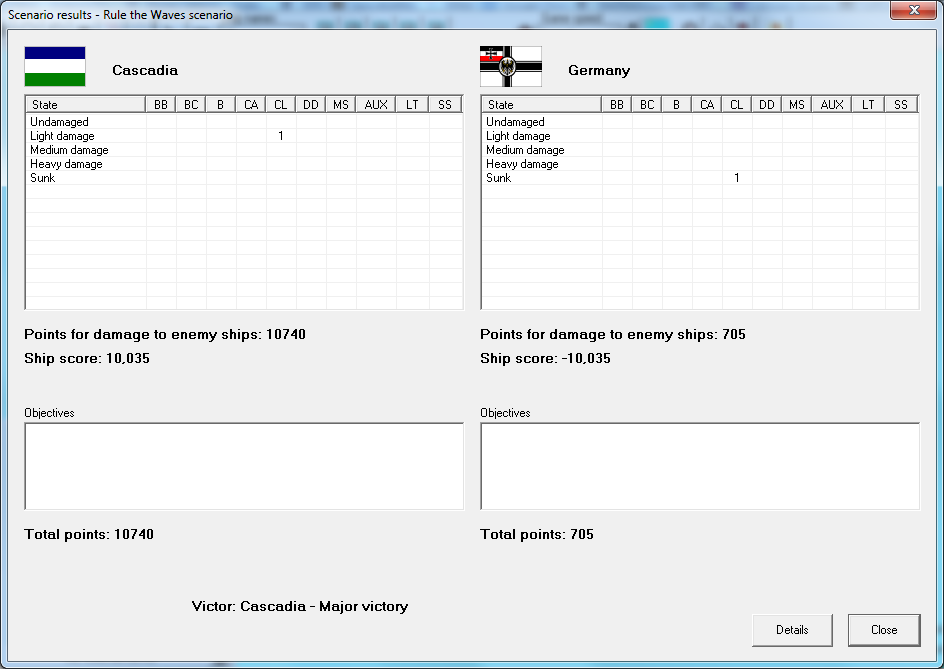
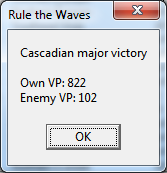
May 1916
The fleet's combat capability had become elevated due to the heightened training ordered at the start of the war.
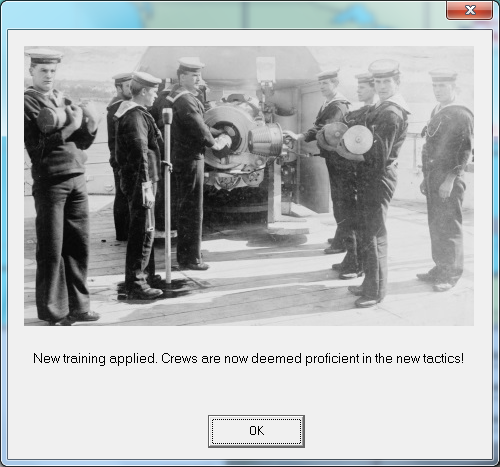
The Gallant and Courageous' crews had finished their working up period and were ready to deploy. They were immediately ordered to Manila.
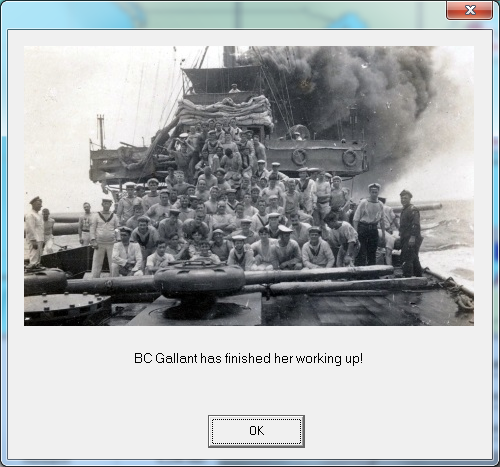
The Defiant was forced to put into port with a condensor problem.
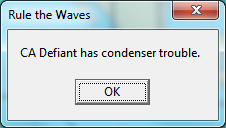
The Cascadian Army, looking to deploy to assist the British in driving the Germans from East Africa, asked for a diversion of funding. The Cascadian Government rejected this at Admiral Garrett's insistence - President Lakeland was fearful of spurring anti-war sentiment with army call-ups and the Cabinet was swayed by Admiral Garrett's argument that the war would be won or lost at sea.
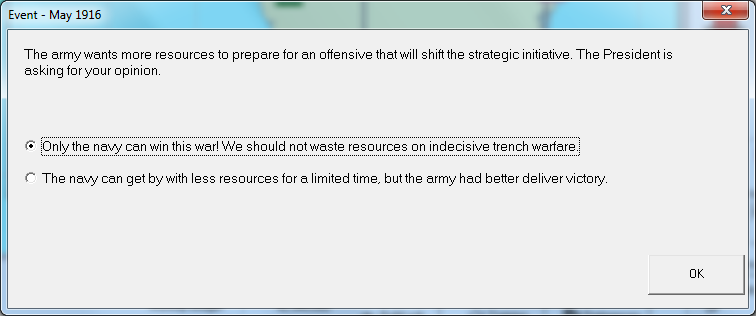
An analysis of the Germans' fleet operations so far provided insights of use to further improving Cascadian fleet tactics.
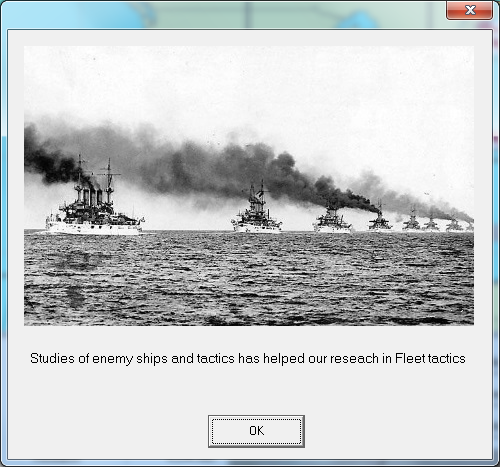
Naval construction experts published a study on the use of slender hull girders for future naval construction, improving the load-bearing efficiency of hulls. Meanwhile the increased firepower of larger naval guns promised truly stupendous ranges, in excess of 20,000 yards, with new elevation gear for gun turrets.
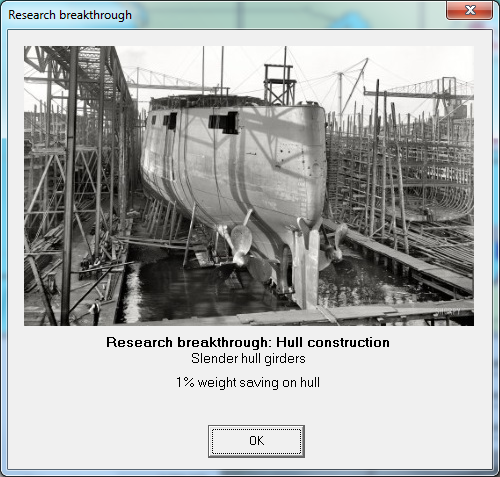
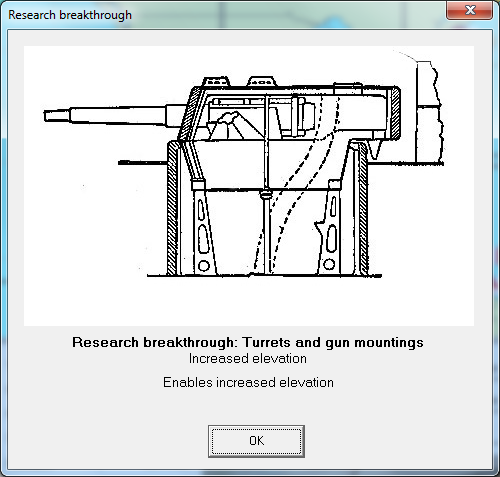
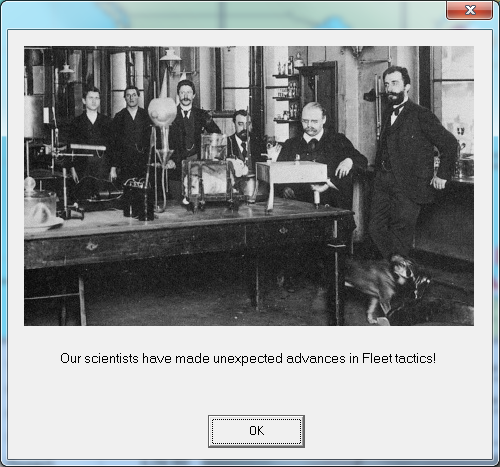
The Narwhal, operating in the North Sea out of British ports, torpedoed a German battleship on maneuvers off of Jutland.
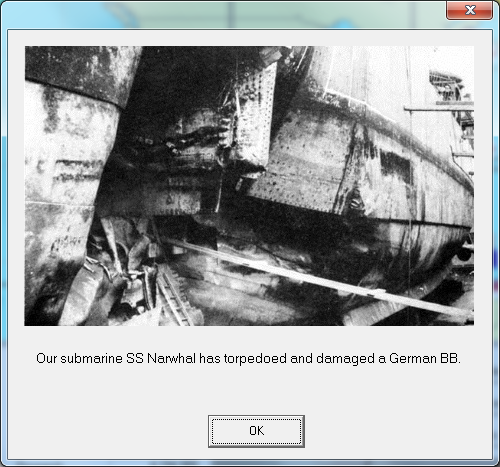
A Cascadian sub was lost on patrol in the Central Pacific.
German U-Boats claimed 3 more Cascadian merchants, furthering discontent with the war among the Cascadian shipping industry and the supporting insurance providers.
The Armenia successfully cleared a minefield that German ships had laid near Singapore, improving communications with the British base. This was deemed vital to prevent a potential cross-strait invasion of Malaya by German colonial forces in Sumatra.
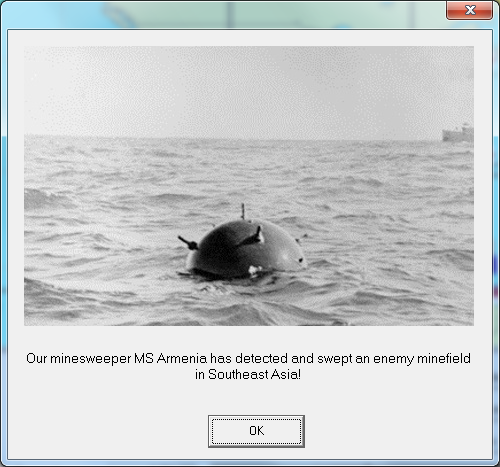
The Las Vegas sank two German ships in the East Indies.
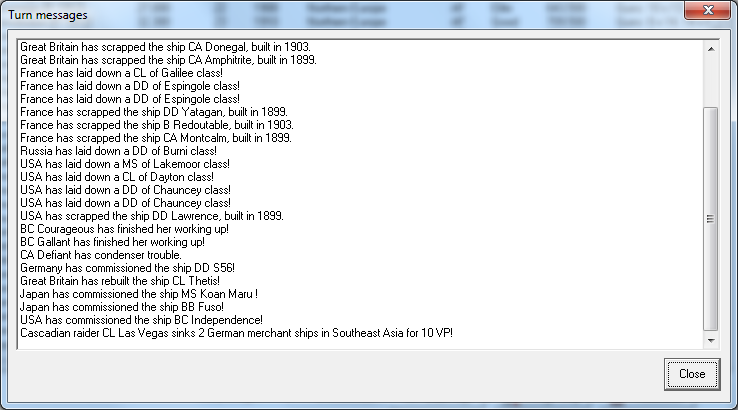
In an engagement in the Dogger Bank, the British battlecruiser Invincible was blown up by Admiral Hipper's battlecruisers. The loss to the Royal Navy included the aggressive British flag officer Admiral Sir David Beatty, who was killed in the explosion.
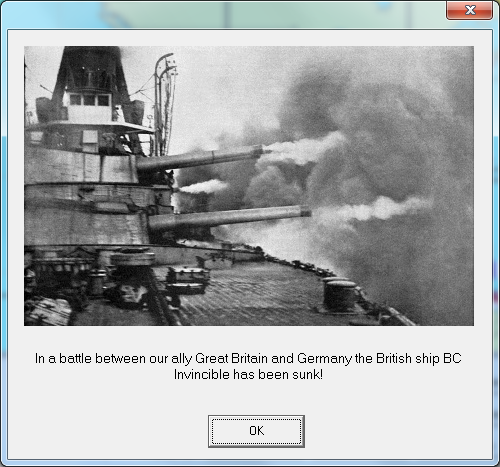
With the bulk of the Cascadian fleet in Scapa Flow and other British ports, Admiral Garrett wired to Admiral MacCallister that he was prepared to allow for limited coastal raiding on the German forces.
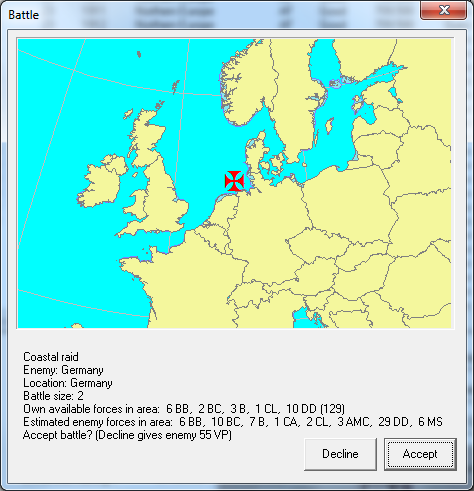
The cruiser Tacoma set out later in the month, arriving in the combat area before noon on the 20th. She proceeded to go on a rampage, sinking two merchant ships, a minesweeper, a destroyer, and the cruiser Bremen. She exchanged some fire with a coastal artillery battery in Schleswig before finally withdrawing to return to England.
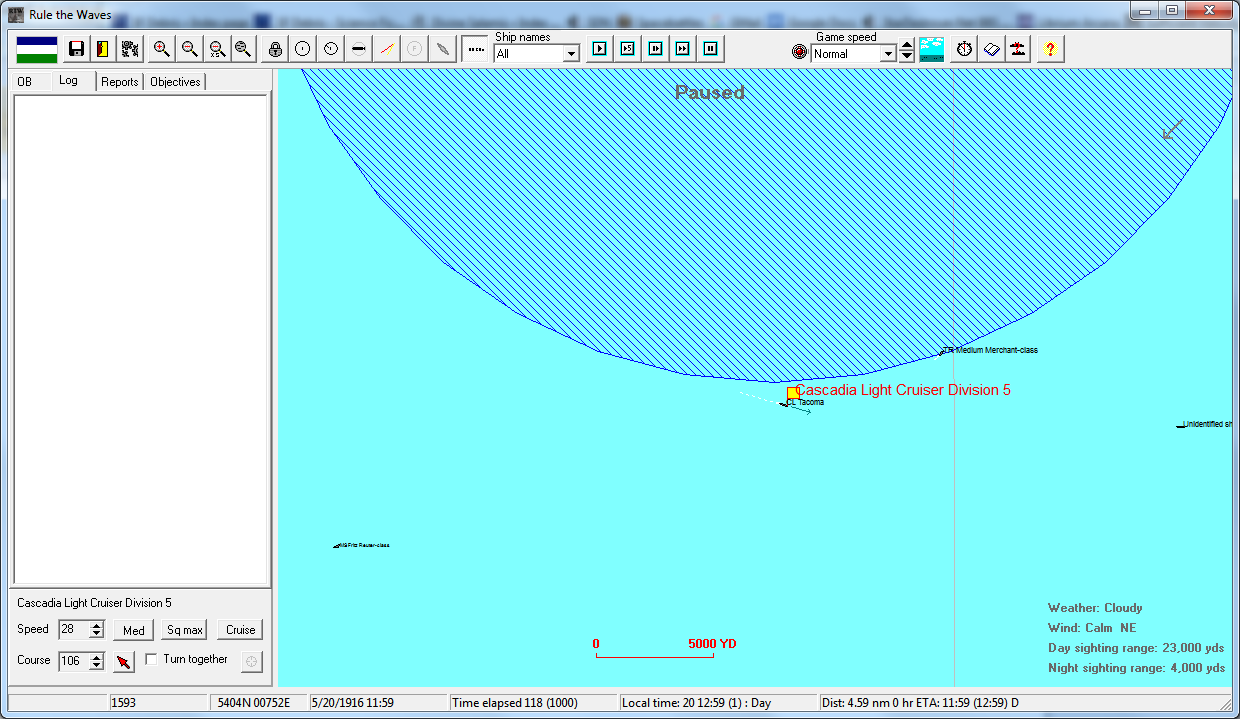
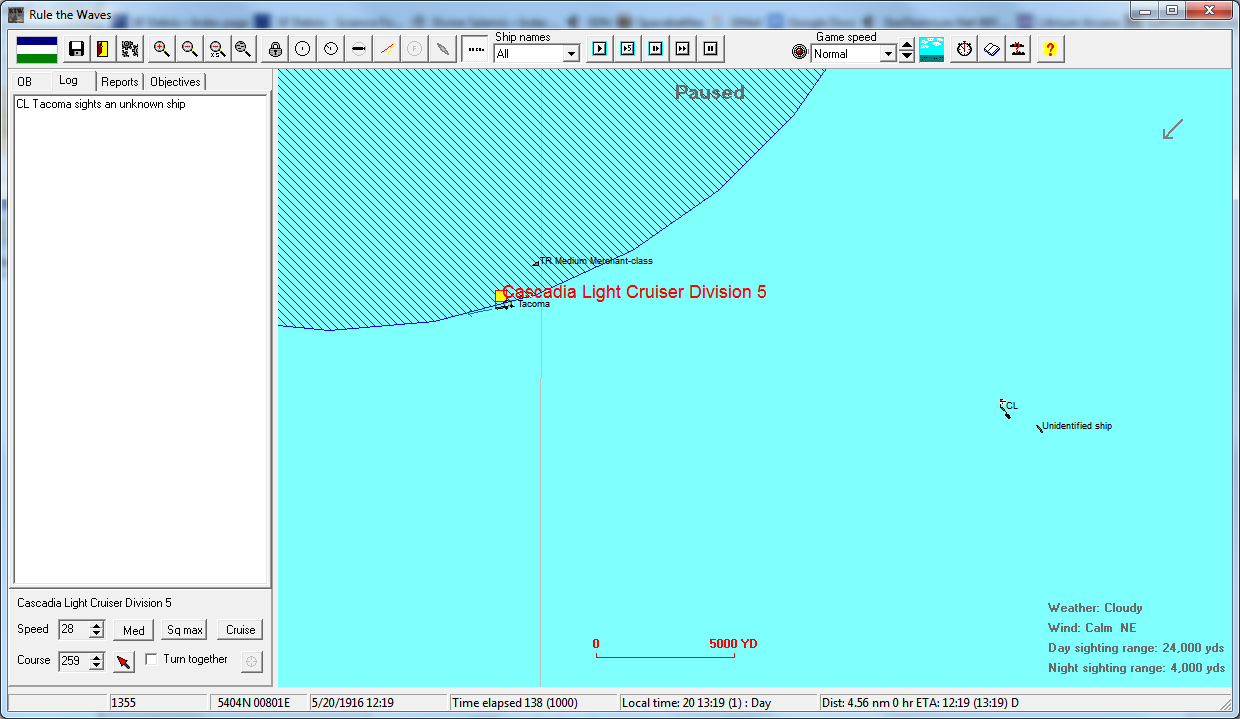
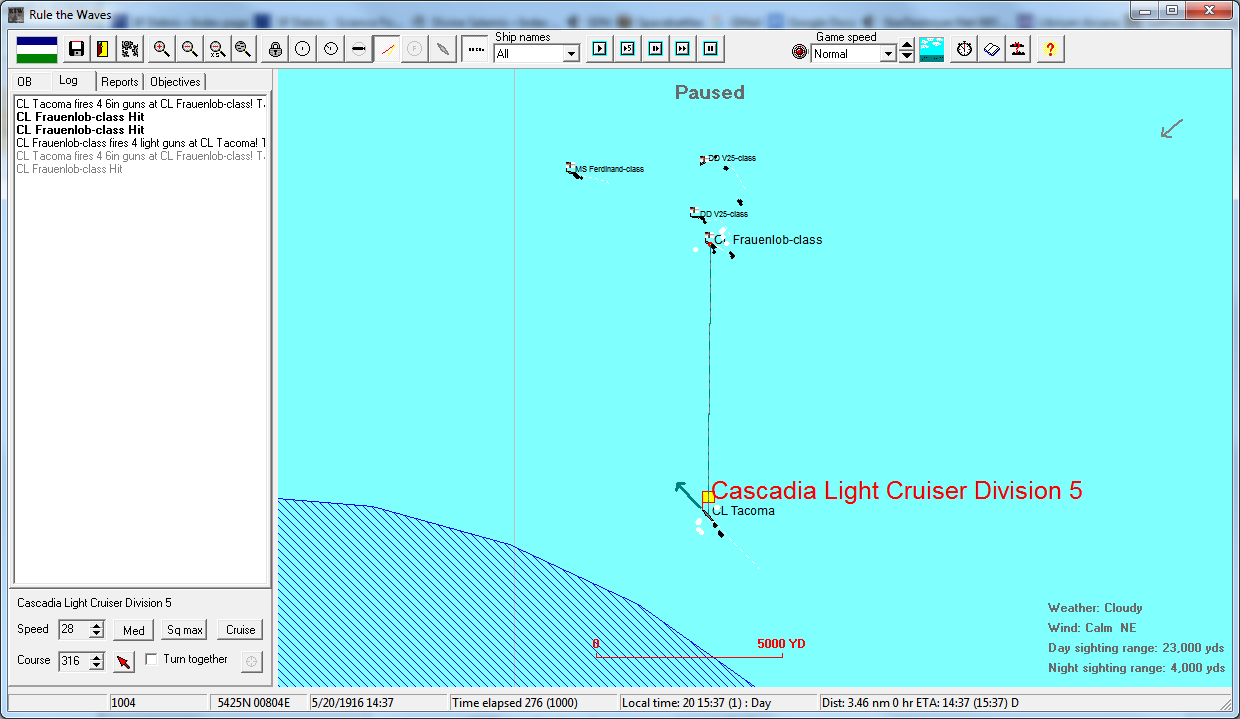
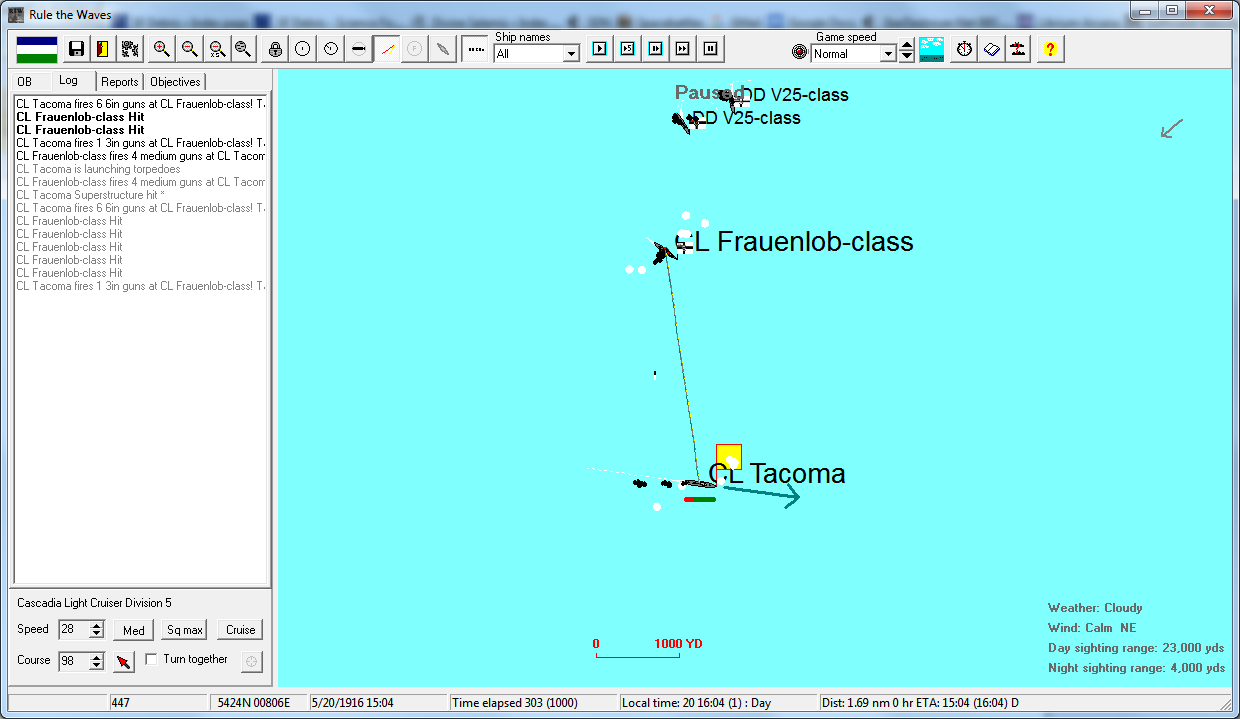
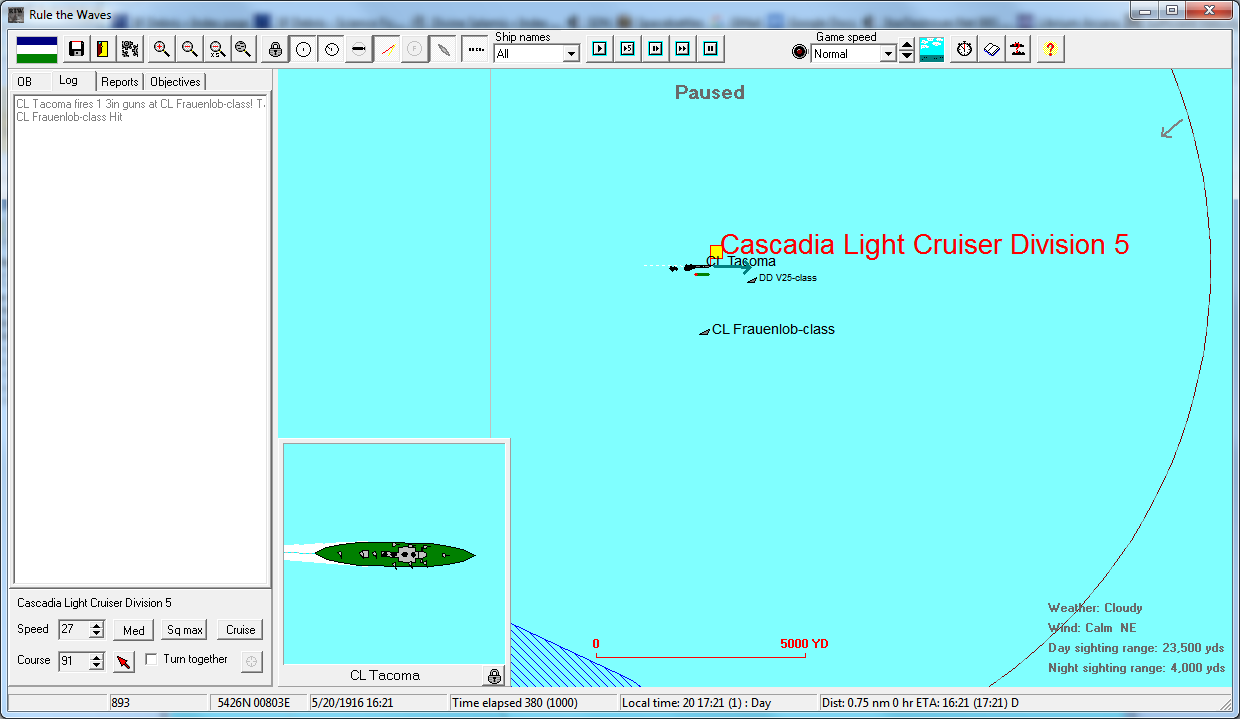
The success of the raid prompted cheers from Royal Navy commanders and British newspapers. Still serving as First Lord of the Admiralty, Winston Churchill urged Admiral MacCallister to send even larger forces for similar raids. "Let the Kaiser and the German Empire know that upon the sea, the British and Cascadian nations know no equals."
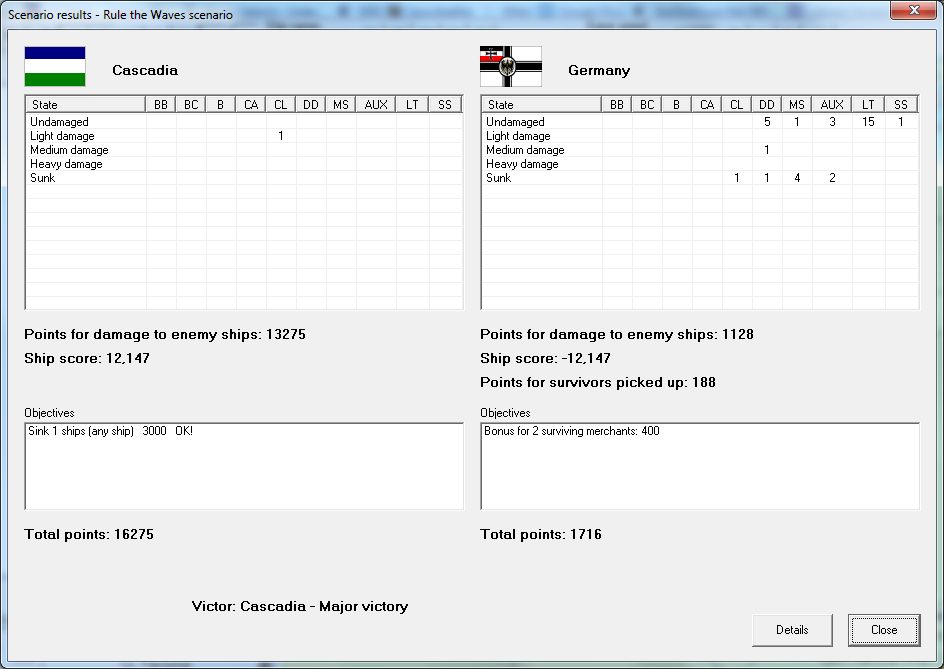
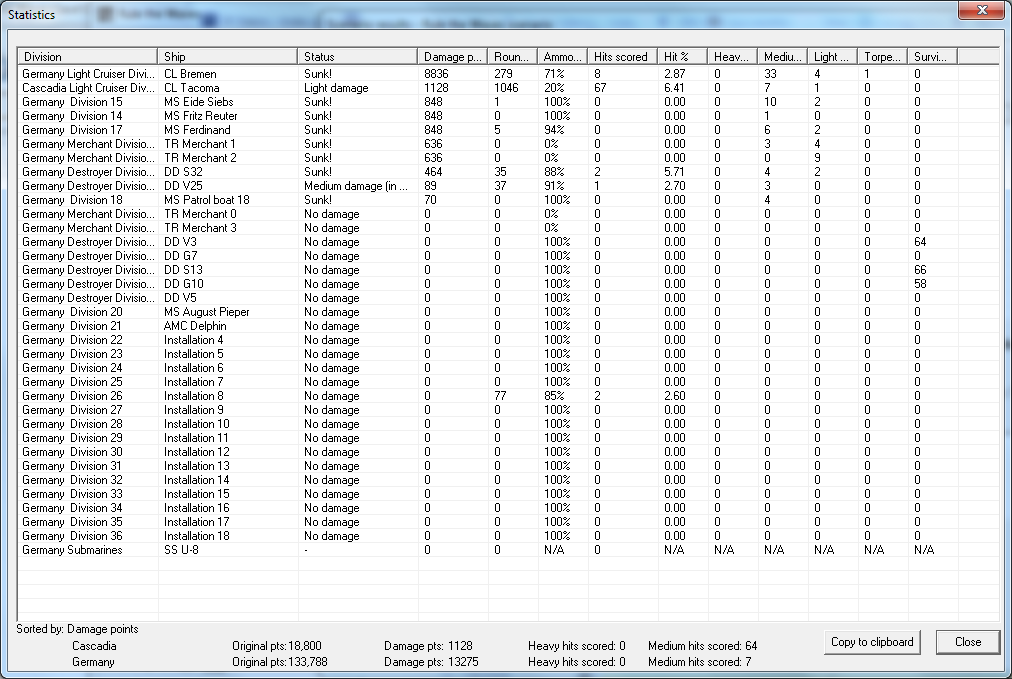
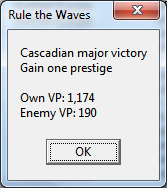
June 1916
The new cruiser Vancouver was commissioned.
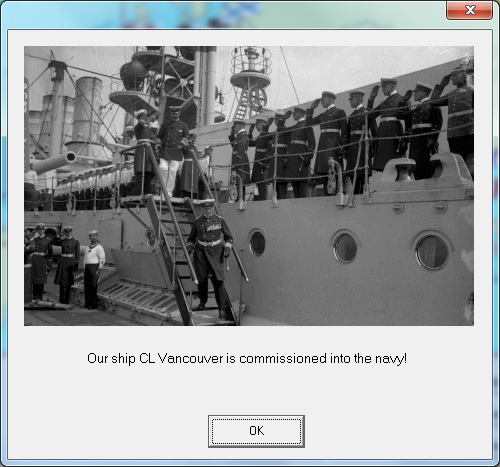
Naval Intelligence recovered the designs for the new American battlecruiser Bonhomme Richard.
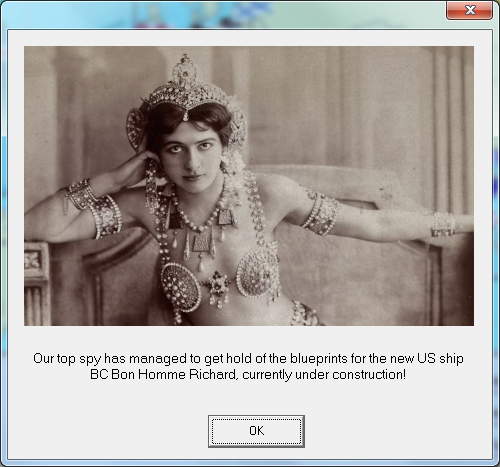
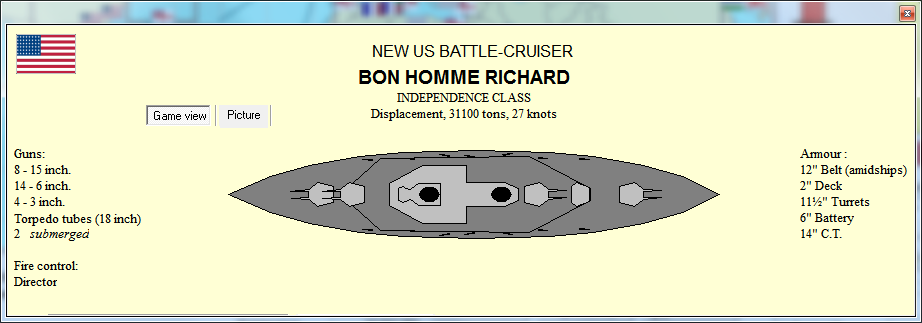
Cascadian ordnance experts provided vital assistance to the British in improving their AP shell production and capability.
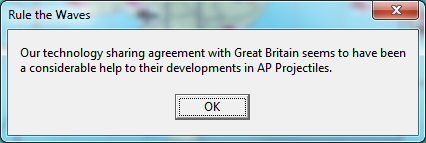
The Narwhal sank a German armed merchant cruiser in the North Sea.
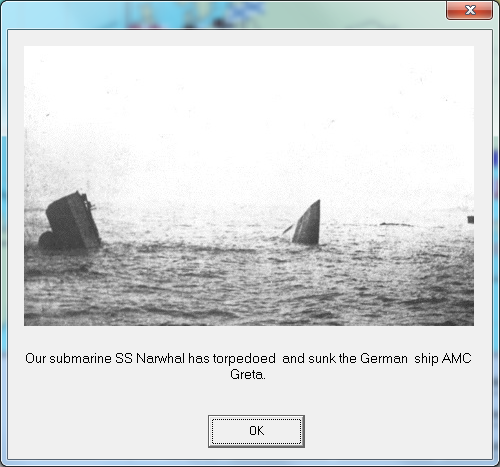
Cascadian submersibles claimed three German merchants while losing two of their own number. The ongoing losses were especially harsh to the older coastal submersible fleet. The Germans managed one sinking.
Subs sink 3, 2 subs lost
German subs sink 1
The Las Vegas continued her raiding career with three more kills.
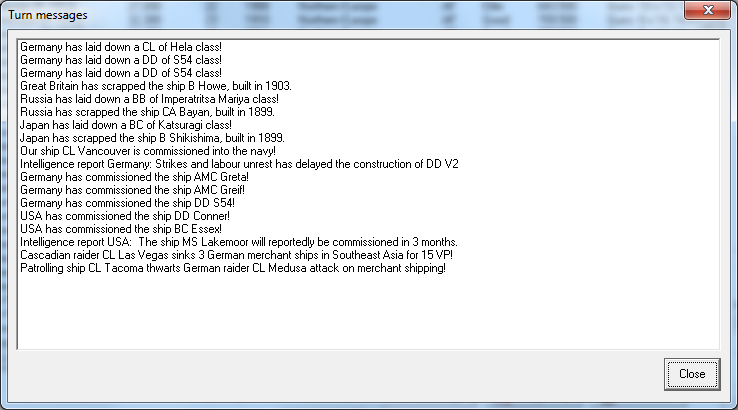
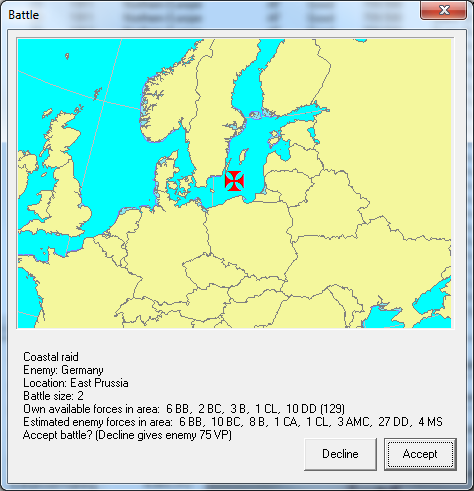
Despite severe winds and light rain, the Cascadian Navy conducted an even larger raid into the Baltic. The Reprisal and Warrior, with the destroyers Adama and Kirk, dared the storm to assault the ports of East Prussia.
Due to the weather, however, visibility was poor and few targets were found. The Kirk suffered damage from the gale winds. Only after five hours was a coastal battery near Danzig engaged and destroyed.
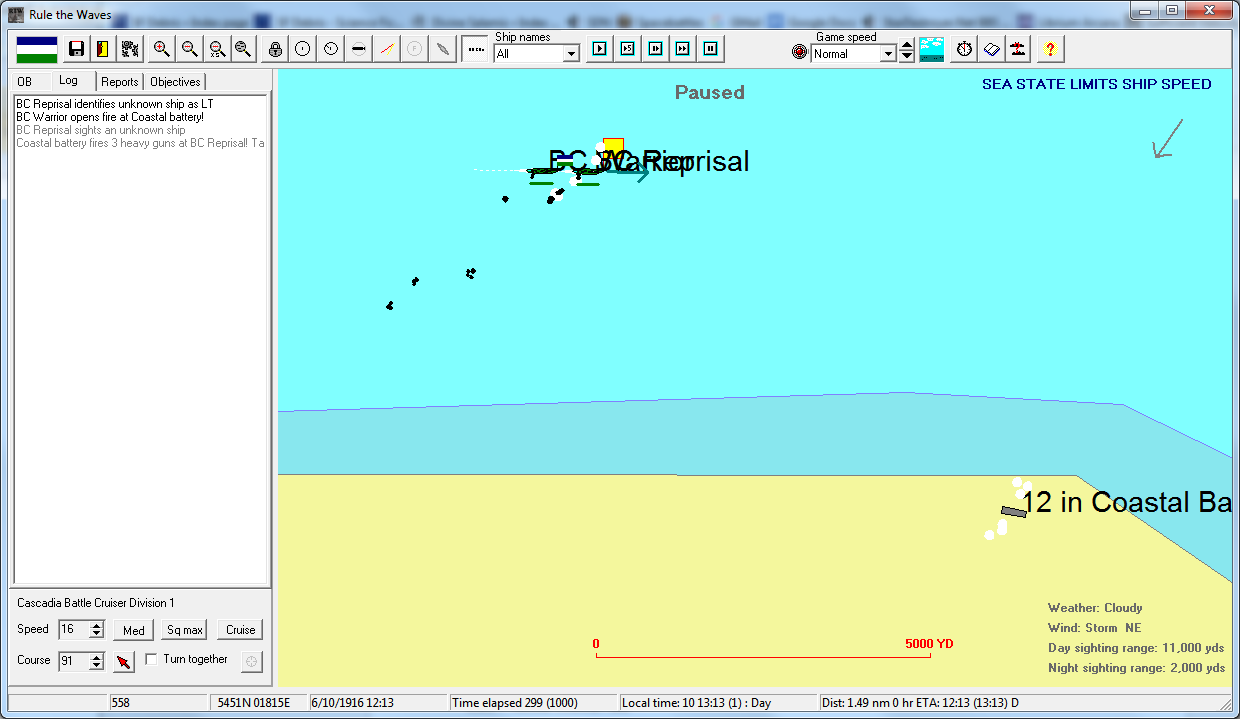
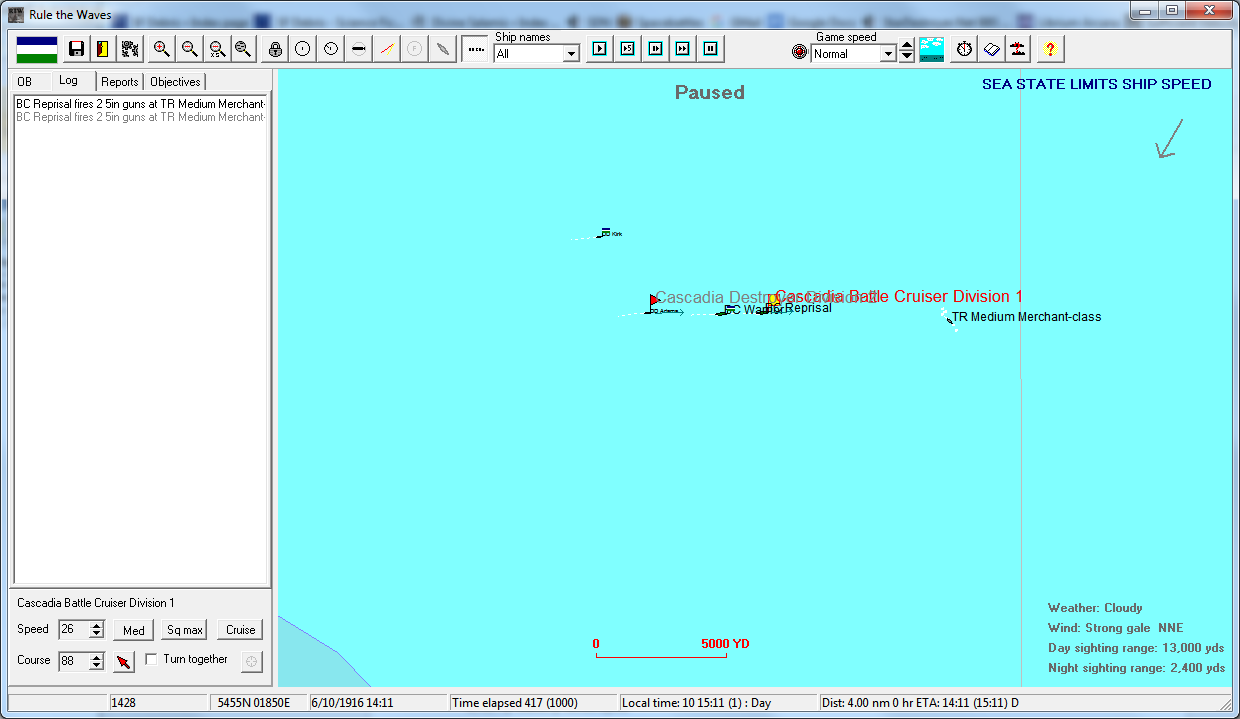
Over an hour later, enemy battlecruisers were finally spotted. In the exchange of fire, several shells hit one of the enemy Derfflinger-class ships. But the weather impeded the engagement.
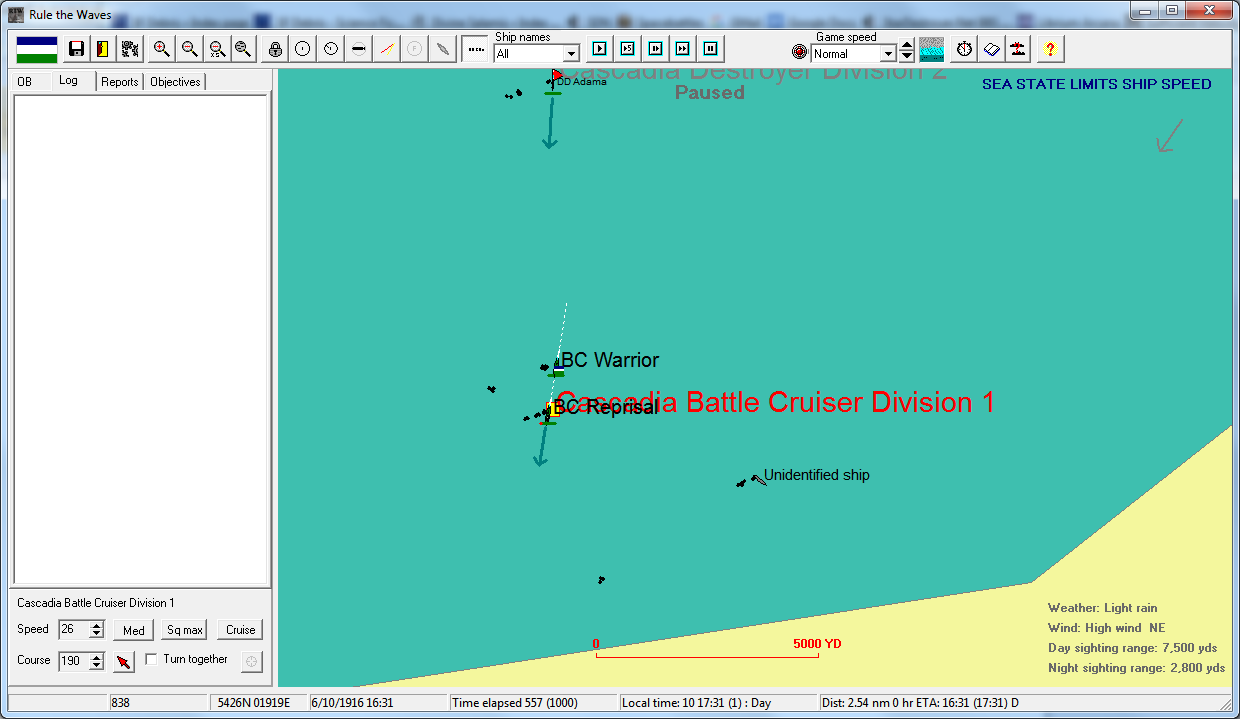
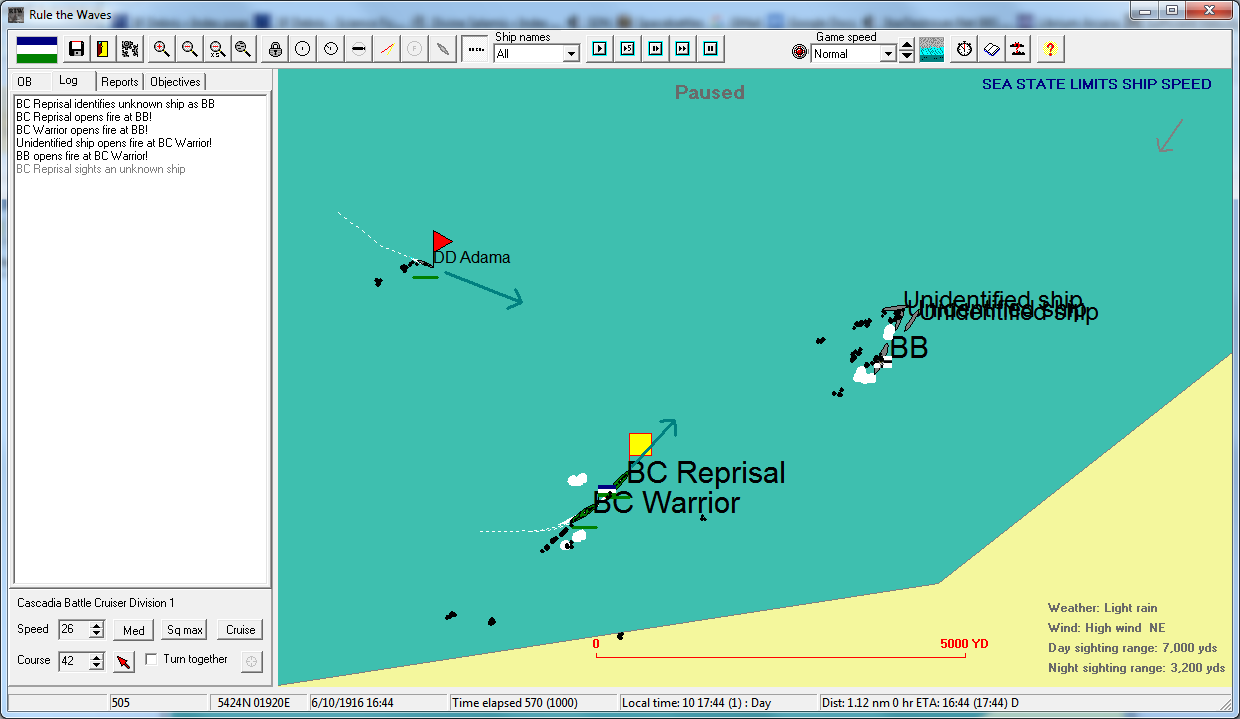
Nevertheless the action was continued until 1848, when an enemy torpedo struck the Repulse. With the battlecruiser flooding, the attack was broken off.
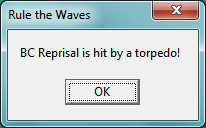
The flooding was thankfully gotten under control in 11 minutes, allowing Repulse to safely retreat back to the Skagerrak and on to the repair yards in Britain.
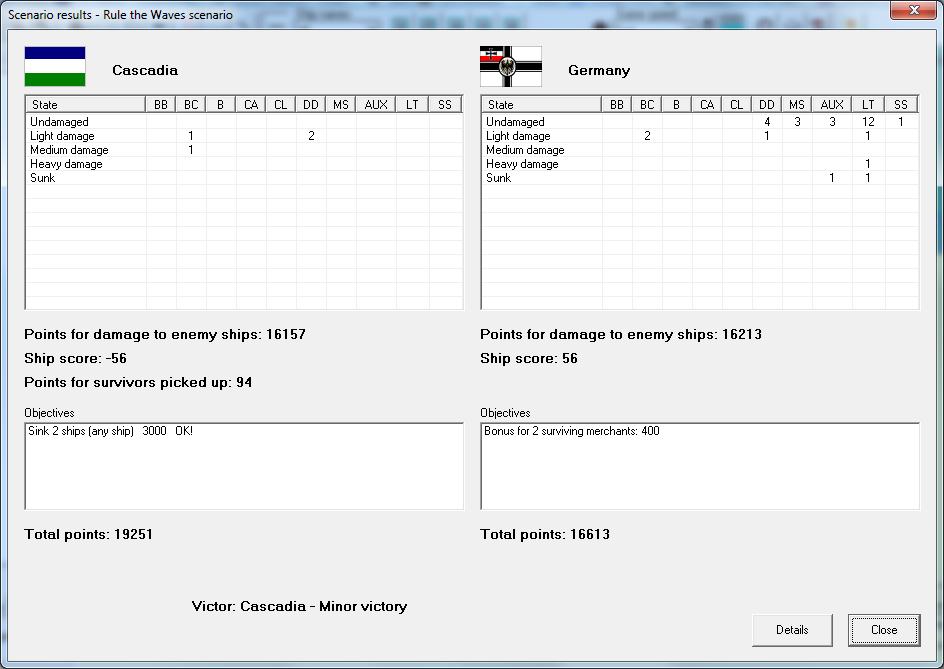
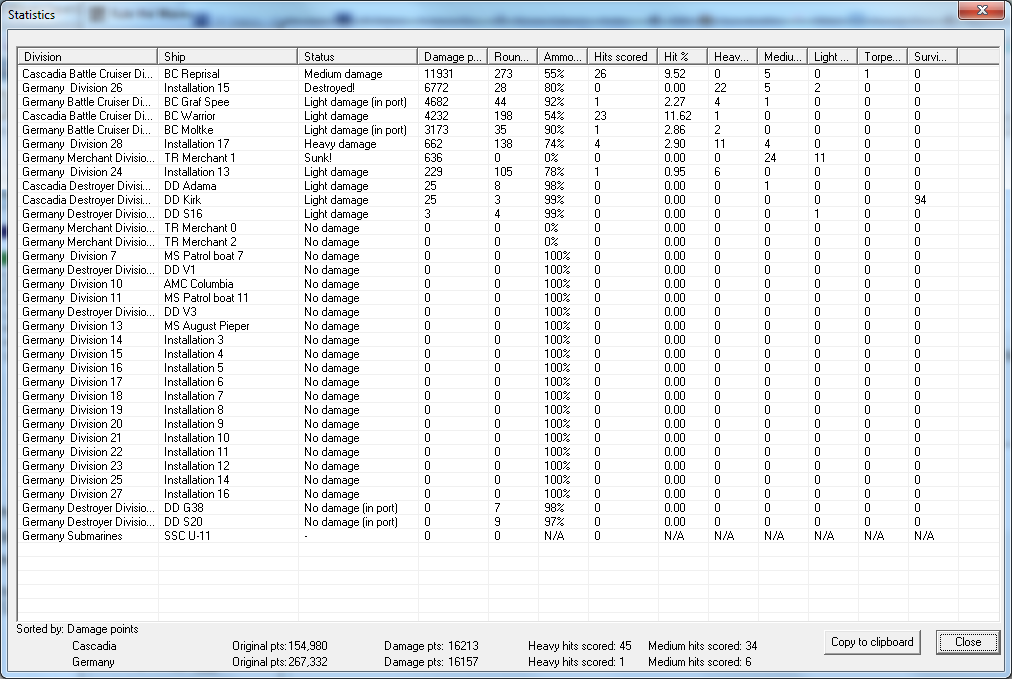
A second Titan-class ship was laid, named the Goliath.
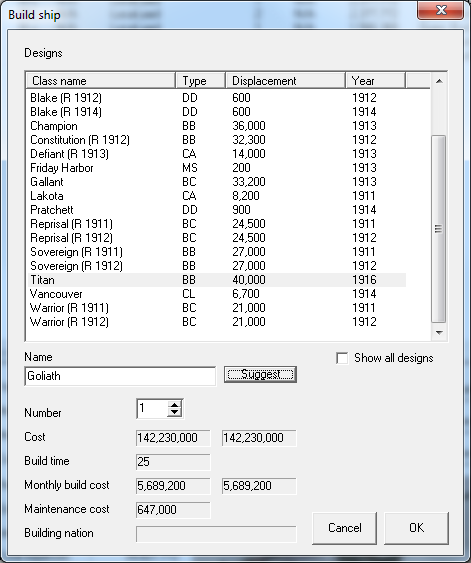
The Gallant and Courageous arrived at their new station. With the two newest battlecruisers to match Germany's older ones, the Aurora and Artemis were ordered to join the Expeditionary Fleet in British waters.
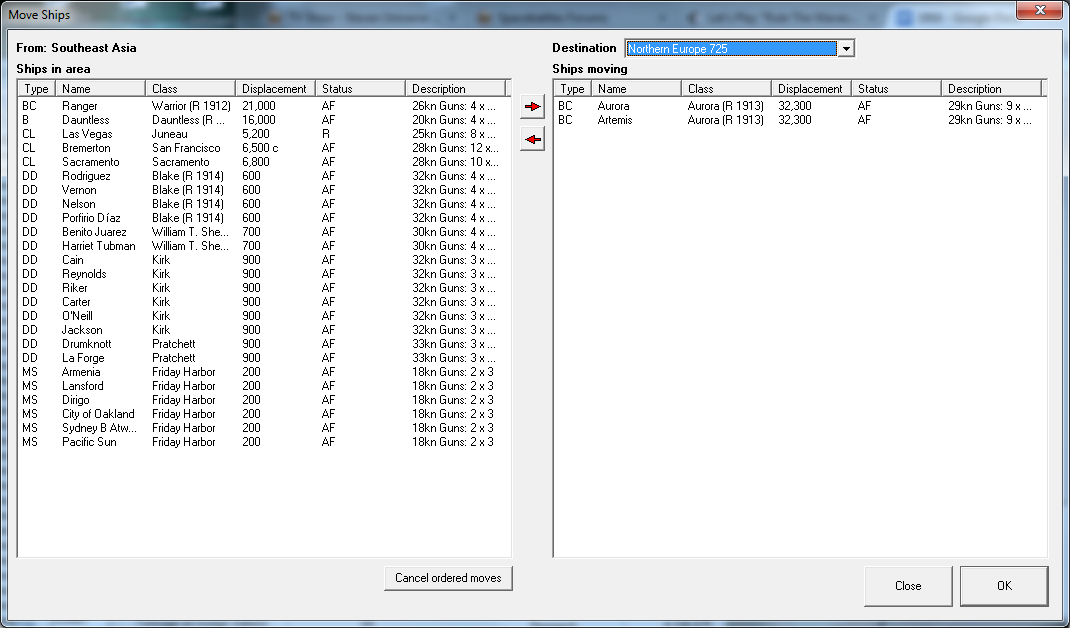
In Germany there was a growing feeling of unease. The Allied blockade was becoming stronger by the day and British diplomatic pressure was slowly closing off the neutrals as avenues for German trade. There were only so many goods that could be shipped out via Holland or Austria-Hungary. France was imposing heavy tariffs on German goods entering French territory and demanding top dollar for French sources of grain. More and more of the German food supply was becoming dependent upon trade with Soviet Russia.
This situation was fine to Vladimir Lenin. He had finally emerged triumphant over Kerensky, driving him out of the Soviet leadership, and the German goods, gold, and credit that was being traded for Russian grain was helping Lenin's own cause of completing the Revolution of 1910. It also provided him the means to apply more resources to preparations.
For both Berlin and Moscow were watching closely the events in Austria-Hungary. The conflict of words between Prime Minister Tisza of Hungary and the heir apparent, Archduke Franz Ferdinand, was taking an ominous tinge with the clear indications that Emperor Franz Josef was in his final days. Tisza threatened that any effort to demand Hungary submit to Ferdinand's desired reforms would backfire and may even lead to a Hungarian declaration of independence. Austria was also providing grain and foodstuffs to Germany - any disruptions to that supply could worsen Germany's internal food and economic situation.
Naval Ordnance reported the successful testing of depth charges. The Admiralty immediately signed contracts to produce the charges for distribution to the fleet.

The German U-boats had the better month, sinking three Cascadian ships to the Cascadian subs' score of 1 German ship sunk. Both forces lost one sub.
The Cascadian surface raiders had the more successful month. Juneau sank a German merchant in the Indian Ocean and Las Vegas continued to rack up her score with 2 more sinkings in the East Indies. The German cruiser Gefion caught and sank a Cascadian merchant en route to Australia several hundred miles off of New Caledonia.

A small-scale naval skirmish in the North Sea saw a German minesweeper damaged by Royal Navy ships.

The armored cruiser Intrepid caught the Amazone off of California on the 21st of the month, finding her some time after dawn at 0830 local. A chase lasted for nearly two hours before the old armored cruiser's gunfire disabled the raider. At about 1100 the Amazone was sinking to the bottom of the Pacific.





February 1916
The Cascadian fleet received a much-desired reinforcement with the commissioning of the battlecruisers Gallant and Courageous.


British experts continued to assist Cascadian designers with new subdivision schemes.

Preliminary designs for 1100t destroyers were offered to the Navy. Admiral Garrett turned them down for the time being - Cascadia's destroyer fleet was already of sufficient size, and he believed even larger destroyer designs would soon be completed.

The war continued to enhance Cascadian fleet tactics.

The Juneau scored the only kill for the Cascadian raiders in the month, sinking another German in the Indian Ocean. The German cruiser Gefion continued her raids out of the Bismarcks, attacking Cascadian ships en route to Australia and New Zealand. The German cruiser Medusa added to the count by catching and sinking a Cascadian merchant that had departed Amsterdam, provoking protest from Dutch authorities after reports indicated the Cascadian ship was sunk in Dutch territorial waters.

Another request to raid the German coast was denied by Portland. The bulk of the fleet was not yet in British home waters and no actions against the defended German coasts would be heavily contemplated until the entire fleet was on station.
North European coastal raid declined

The German armored cruiser Furst Bismarck intercepted the Las Vegas on the 8th, catching her east of Singapore. The Las Vegas turned east and northeast to make for shelter in British Borneo, as a course to Singapore would be too dangerous for the cruiser given the positioning of the Furst Bismarck. Although the ship lost some power half an hour into the chase due to the age of the engines, she managed to stay ahead and lost visual contact at 1528. The Las Vegas returned to Manila for re-coaling.
March 1915
Efforts to develop inclined armor were undermined by a fundamental difference of opinion between two key armorers on the research team.

The month saw each side's submersible force sink 2 ships.
The German raiders Gefion and Gazelle each claimed a Cascadian vessel.

A naval skirmish between the German fleet and the Royal Navy saw the destroyer G40 damaged.

Admiral Garrett turned down another request for a coastal raid on Germany.

An inconclusive skirmish occurred near the Philippines toward the end of the month. On the 29th, the Diaz, Rodriguez, and Vernon encountered German destroyers out of Saipan that had spotted their convoy. The former two ships were damaged in a brief exchange of fire before the enemy retreated to the north. They shadowed the convoy but did not re-engage. Night fell and visual contact was lost.


The Navajo's construction had to be halted due to a shortage in electrical wiring.
With the battlecruisers commissioned and the budget space freed up, Admiral Garrett ordered the laying of Cascadia's first battleship since the Constitution-class ships of the beginning of the decade. This new "super-sovereign" battleship was rated at a colossal 40,000T displacement and given the appropriate name Titan. It was armed with 10 of the new 16" naval rifles, arranged in two triple turrets at the A and Y positions with two super-firing double turrets at B and X. Eight double 5" turrets along the sides were joined by 20 4" deck guns as secondary firepower. The armor belt was a Navy-leading 14" thick with 3" deck armor due to increasing concern with plunging fire. The turrets were protected by even thicker armor. The engine plant would provide a design speed of 23 knots.

The Titan was laid at a new slipway at Reilly & Colette's yard in Bremerton. Burleigh & Armstrong received the contract to build another submersible, the Shark.

April 1916
Admiral Garrett received the pleasing news that smaller director firing units had been developed. These directors allowed both the installation of secondary director firing gear in capital ships, for their secondary batteries, and the installation of director gear into scout cruisers and destroyers.
The Naval Ordnance office reported that the munitions industry had successfully put into place new manufacturing practices to improve the quality of AP shells.


The German U-boats sank two Cascadian merchant ships west of Ireland during the course of the month.
The Juneau was forced to put into dock due to mechanical problems.


The Sacramento intercepted the Gefion in the Sulu Islands and sank her after a 90 minute battle.



May 1916
The fleet's combat capability had become elevated due to the heightened training ordered at the start of the war.

The Gallant and Courageous' crews had finished their working up period and were ready to deploy. They were immediately ordered to Manila.

The Defiant was forced to put into port with a condensor problem.

The Cascadian Army, looking to deploy to assist the British in driving the Germans from East Africa, asked for a diversion of funding. The Cascadian Government rejected this at Admiral Garrett's insistence - President Lakeland was fearful of spurring anti-war sentiment with army call-ups and the Cabinet was swayed by Admiral Garrett's argument that the war would be won or lost at sea.

An analysis of the Germans' fleet operations so far provided insights of use to further improving Cascadian fleet tactics.

Naval construction experts published a study on the use of slender hull girders for future naval construction, improving the load-bearing efficiency of hulls. Meanwhile the increased firepower of larger naval guns promised truly stupendous ranges, in excess of 20,000 yards, with new elevation gear for gun turrets.



The Narwhal, operating in the North Sea out of British ports, torpedoed a German battleship on maneuvers off of Jutland.

A Cascadian sub was lost on patrol in the Central Pacific.
German U-Boats claimed 3 more Cascadian merchants, furthering discontent with the war among the Cascadian shipping industry and the supporting insurance providers.
The Armenia successfully cleared a minefield that German ships had laid near Singapore, improving communications with the British base. This was deemed vital to prevent a potential cross-strait invasion of Malaya by German colonial forces in Sumatra.

The Las Vegas sank two German ships in the East Indies.

In an engagement in the Dogger Bank, the British battlecruiser Invincible was blown up by Admiral Hipper's battlecruisers. The loss to the Royal Navy included the aggressive British flag officer Admiral Sir David Beatty, who was killed in the explosion.

With the bulk of the Cascadian fleet in Scapa Flow and other British ports, Admiral Garrett wired to Admiral MacCallister that he was prepared to allow for limited coastal raiding on the German forces.

The cruiser Tacoma set out later in the month, arriving in the combat area before noon on the 20th. She proceeded to go on a rampage, sinking two merchant ships, a minesweeper, a destroyer, and the cruiser Bremen. She exchanged some fire with a coastal artillery battery in Schleswig before finally withdrawing to return to England.





The success of the raid prompted cheers from Royal Navy commanders and British newspapers. Still serving as First Lord of the Admiralty, Winston Churchill urged Admiral MacCallister to send even larger forces for similar raids. "Let the Kaiser and the German Empire know that upon the sea, the British and Cascadian nations know no equals."



June 1916
The new cruiser Vancouver was commissioned.

Naval Intelligence recovered the designs for the new American battlecruiser Bonhomme Richard.


Cascadian ordnance experts provided vital assistance to the British in improving their AP shell production and capability.

The Narwhal sank a German armed merchant cruiser in the North Sea.

Cascadian submersibles claimed three German merchants while losing two of their own number. The ongoing losses were especially harsh to the older coastal submersible fleet. The Germans managed one sinking.
Subs sink 3, 2 subs lost
German subs sink 1
The Las Vegas continued her raiding career with three more kills.


Despite severe winds and light rain, the Cascadian Navy conducted an even larger raid into the Baltic. The Reprisal and Warrior, with the destroyers Adama and Kirk, dared the storm to assault the ports of East Prussia.
Due to the weather, however, visibility was poor and few targets were found. The Kirk suffered damage from the gale winds. Only after five hours was a coastal battery near Danzig engaged and destroyed.


Over an hour later, enemy battlecruisers were finally spotted. In the exchange of fire, several shells hit one of the enemy Derfflinger-class ships. But the weather impeded the engagement.


Nevertheless the action was continued until 1848, when an enemy torpedo struck the Repulse. With the battlecruiser flooding, the attack was broken off.

The flooding was thankfully gotten under control in 11 minutes, allowing Repulse to safely retreat back to the Skagerrak and on to the repair yards in Britain.


A second Titan-class ship was laid, named the Goliath.

The Gallant and Courageous arrived at their new station. With the two newest battlecruisers to match Germany's older ones, the Aurora and Artemis were ordered to join the Expeditionary Fleet in British waters.

In Germany there was a growing feeling of unease. The Allied blockade was becoming stronger by the day and British diplomatic pressure was slowly closing off the neutrals as avenues for German trade. There were only so many goods that could be shipped out via Holland or Austria-Hungary. France was imposing heavy tariffs on German goods entering French territory and demanding top dollar for French sources of grain. More and more of the German food supply was becoming dependent upon trade with Soviet Russia.
This situation was fine to Vladimir Lenin. He had finally emerged triumphant over Kerensky, driving him out of the Soviet leadership, and the German goods, gold, and credit that was being traded for Russian grain was helping Lenin's own cause of completing the Revolution of 1910. It also provided him the means to apply more resources to preparations.
For both Berlin and Moscow were watching closely the events in Austria-Hungary. The conflict of words between Prime Minister Tisza of Hungary and the heir apparent, Archduke Franz Ferdinand, was taking an ominous tinge with the clear indications that Emperor Franz Josef was in his final days. Tisza threatened that any effort to demand Hungary submit to Ferdinand's desired reforms would backfire and may even lead to a Hungarian declaration of independence. Austria was also providing grain and foodstuffs to Germany - any disruptions to that supply could worsen Germany's internal food and economic situation.
”A Radical is a man with both feet planted firmly in the air.” – Franklin Delano Roosevelt
"No folly is more costly than the folly of intolerant idealism." - Sir Winston L. S. Churchill, Princips Britannia
American Conservatism is about the exercise of personal responsibility without state interference in the lives of the citizenry..... unless, of course, it involves using the bludgeon of state power to suppress things Conservatives do not like.
DONALD J. TRUMP IS A SEDITIOUS TRAITOR AND MUST BE IMPEACHED
"No folly is more costly than the folly of intolerant idealism." - Sir Winston L. S. Churchill, Princips Britannia
American Conservatism is about the exercise of personal responsibility without state interference in the lives of the citizenry..... unless, of course, it involves using the bludgeon of state power to suppress things Conservatives do not like.
DONALD J. TRUMP IS A SEDITIOUS TRAITOR AND MUST BE IMPEACHED
- LaCroix
- Sith Acolyte
- Posts: 5193
- Joined: 2004-12-21 12:14pm
- Location: Sopron District, Hungary, Europe, Terra
Re: Let's Play "Rule The Waves" w/ Steve's Custom Country "Cascadia"
WWI, here we come...
A minute's thought suggests that the very idea of this is stupid. A more detailed examination raises the possibility that it might be an answer to the question "how could the Germans win the war after the US gets involved?" - Captain Seafort, in a thread proposing a 1942 'D-Day' in Quiberon Bay
I do archery skeet. With a Trebuchet.
I do archery skeet. With a Trebuchet.
Re: Let's Play "Rule The Waves" w/ Steve's Custom Country "Cascadia"
Technically we already had that, just about: Cascadia, France, and Japan vs. Germany and Russia.
”A Radical is a man with both feet planted firmly in the air.” – Franklin Delano Roosevelt
"No folly is more costly than the folly of intolerant idealism." - Sir Winston L. S. Churchill, Princips Britannia
American Conservatism is about the exercise of personal responsibility without state interference in the lives of the citizenry..... unless, of course, it involves using the bludgeon of state power to suppress things Conservatives do not like.
DONALD J. TRUMP IS A SEDITIOUS TRAITOR AND MUST BE IMPEACHED
"No folly is more costly than the folly of intolerant idealism." - Sir Winston L. S. Churchill, Princips Britannia
American Conservatism is about the exercise of personal responsibility without state interference in the lives of the citizenry..... unless, of course, it involves using the bludgeon of state power to suppress things Conservatives do not like.
DONALD J. TRUMP IS A SEDITIOUS TRAITOR AND MUST BE IMPEACHED
- U.P. Cinnabar
- Sith Marauder
- Posts: 3845
- Joined: 2016-02-05 08:11pm
- Location: Aboard the RCS Princess Cecile
Re: Let's Play "Rule The Waves" w/ Steve's Custom Country "Cascadia"
An Austro-Hungarian civil war would definitely shake things up...and, it just might add Italy to the mix.
"Beware the Beast, Man, for he is the Devil's pawn. Alone amongst God's primates, he kills for sport, for lust, for greed. Yea, he will murder his brother to possess his brother's land. Let him not breed in great numbers, for he will make a desert of his home and yours. Shun him, drive him back into his jungle lair, for he is the harbinger of Death.."
—29th Scroll, 6th Verse of Ape Law
"Indelible in the hippocampus is the laughter. The uproarious laughter between the two, and their having fun at my expense.”
---Doctor Christine Blasey-Ford
Re: Let's Play "Rule The Waves" w/ Steve's Custom Country "Cascadia"
Note that the game doesn't have this because A-H and Italy are basically non-active NPCs. The game doesn't factor in their naval construction or their politics.
Rather, I'm doing the Austro-Hungarian political problems to explain a certain issue I was having with the game's mechanics and to explain what happens starting in 1917.
Rather, I'm doing the Austro-Hungarian political problems to explain a certain issue I was having with the game's mechanics and to explain what happens starting in 1917.
”A Radical is a man with both feet planted firmly in the air.” – Franklin Delano Roosevelt
"No folly is more costly than the folly of intolerant idealism." - Sir Winston L. S. Churchill, Princips Britannia
American Conservatism is about the exercise of personal responsibility without state interference in the lives of the citizenry..... unless, of course, it involves using the bludgeon of state power to suppress things Conservatives do not like.
DONALD J. TRUMP IS A SEDITIOUS TRAITOR AND MUST BE IMPEACHED
"No folly is more costly than the folly of intolerant idealism." - Sir Winston L. S. Churchill, Princips Britannia
American Conservatism is about the exercise of personal responsibility without state interference in the lives of the citizenry..... unless, of course, it involves using the bludgeon of state power to suppress things Conservatives do not like.
DONALD J. TRUMP IS A SEDITIOUS TRAITOR AND MUST BE IMPEACHED
- LaCroix
- Sith Acolyte
- Posts: 5193
- Joined: 2004-12-21 12:14pm
- Location: Sopron District, Hungary, Europe, Terra
Re: Let's Play "Rule The Waves" w/ Steve's Custom Country "Cascadia"
And that's why you allied with Britain to make sure such a war can never happen, again....Steve wrote:Technically we already had that, just about: Cascadia, France, and Japan vs. Germany and Russia.
A minute's thought suggests that the very idea of this is stupid. A more detailed examination raises the possibility that it might be an answer to the question "how could the Germans win the war after the US gets involved?" - Captain Seafort, in a thread proposing a 1942 'D-Day' in Quiberon Bay
I do archery skeet. With a Trebuchet.
I do archery skeet. With a Trebuchet.
- Elheru Aran
- Emperor's Hand
- Posts: 13073
- Joined: 2004-03-04 01:15am
- Location: Georgia
Re: Let's Play "Rule The Waves" w/ Steve's Custom Country "Cascadia"
Titan... would the captain happen to be one William T. Riker? 
It's a strange world. Let's keep it that way.
Re: Let's Play "Rule The Waves" w/ Steve's Custom Country "Cascadia"
Heh. I haven't named the captain of that ship yet. I might never, frankly.
”A Radical is a man with both feet planted firmly in the air.” – Franklin Delano Roosevelt
"No folly is more costly than the folly of intolerant idealism." - Sir Winston L. S. Churchill, Princips Britannia
American Conservatism is about the exercise of personal responsibility without state interference in the lives of the citizenry..... unless, of course, it involves using the bludgeon of state power to suppress things Conservatives do not like.
DONALD J. TRUMP IS A SEDITIOUS TRAITOR AND MUST BE IMPEACHED
"No folly is more costly than the folly of intolerant idealism." - Sir Winston L. S. Churchill, Princips Britannia
American Conservatism is about the exercise of personal responsibility without state interference in the lives of the citizenry..... unless, of course, it involves using the bludgeon of state power to suppress things Conservatives do not like.
DONALD J. TRUMP IS A SEDITIOUS TRAITOR AND MUST BE IMPEACHED
-
Simon_Jester
- Emperor's Hand
- Posts: 30165
- Joined: 2009-05-23 07:29pm
Re: Let's Play "Rule The Waves" w/ Steve's Custom Country "Cascadia"
The Titan-class design raised my eyebrows a bit, then I realized that for a 1916-vintage design that's totally appropriate. We're getting up into the same general timeframe as the designs for things like the Colorados and South Dakotas in the US, and Titan would appear to be broadly intermediate between those two benchmarks.
This space dedicated to Vasily Arkhipov
Re: Let's Play "Rule The Waves" w/ Steve's Custom Country "Cascadia"
Wait until you see the Excalibur. 
”A Radical is a man with both feet planted firmly in the air.” – Franklin Delano Roosevelt
"No folly is more costly than the folly of intolerant idealism." - Sir Winston L. S. Churchill, Princips Britannia
American Conservatism is about the exercise of personal responsibility without state interference in the lives of the citizenry..... unless, of course, it involves using the bludgeon of state power to suppress things Conservatives do not like.
DONALD J. TRUMP IS A SEDITIOUS TRAITOR AND MUST BE IMPEACHED
"No folly is more costly than the folly of intolerant idealism." - Sir Winston L. S. Churchill, Princips Britannia
American Conservatism is about the exercise of personal responsibility without state interference in the lives of the citizenry..... unless, of course, it involves using the bludgeon of state power to suppress things Conservatives do not like.
DONALD J. TRUMP IS A SEDITIOUS TRAITOR AND MUST BE IMPEACHED
-
Marko Dash
- Jedi Knight
- Posts: 718
- Joined: 2006-01-29 03:42am
- Location: south carolina, USA
- Contact:
Re: Let's Play "Rule The Waves" w/ Steve's Custom Country "Cascadia"
well you got me interested, and a few youtubers got me hooked, so i bought a copy.
plus side: i've got lots of ideas and am eager to start making AI ships my bitch.
negative side: 35 bucks seems a little steep for a fairly simple game, they'd probably get a lot more people to buy it if it were $20
plus side: i've got lots of ideas and am eager to start making AI ships my bitch.
negative side: 35 bucks seems a little steep for a fairly simple game, they'd probably get a lot more people to buy it if it were $20
If a black-hawk flies over a light show and is not harmed, does that make it immune to lasers?
Re: Let's Play "Rule The Waves" w/ Steve's Custom Country "Cascadia"
The game can hook you easily, so in time you probably will find that $35 value met in terms of enjoyable game time.Marko Dash wrote:well you got me interested, and a few youtubers got me hooked, so i bought a copy.
plus side: i've got lots of ideas and am eager to start making AI ships my bitch.
negative side: 35 bucks seems a little steep for a fairly simple game, they'd probably get a lot more people to buy it if it were $20
Also, an apology to everyone, I've been focusing on another writing project (I'm sure E_F and Cinnabar can figure out which) and have been dealing with issues with writing at work (namely that I feel so goddamned sleepy at times that I can't focus enough to write). I actually have the rest of 1916 mostly written out, but I wanted to finish another character scene before I post it. I might use this week - my "staycation" week from work - to try and get some more progress done on this anyway.
”A Radical is a man with both feet planted firmly in the air.” – Franklin Delano Roosevelt
"No folly is more costly than the folly of intolerant idealism." - Sir Winston L. S. Churchill, Princips Britannia
American Conservatism is about the exercise of personal responsibility without state interference in the lives of the citizenry..... unless, of course, it involves using the bludgeon of state power to suppress things Conservatives do not like.
DONALD J. TRUMP IS A SEDITIOUS TRAITOR AND MUST BE IMPEACHED
"No folly is more costly than the folly of intolerant idealism." - Sir Winston L. S. Churchill, Princips Britannia
American Conservatism is about the exercise of personal responsibility without state interference in the lives of the citizenry..... unless, of course, it involves using the bludgeon of state power to suppress things Conservatives do not like.
DONALD J. TRUMP IS A SEDITIOUS TRAITOR AND MUST BE IMPEACHED
- Eternal_Freedom
- Castellan
- Posts: 10370
- Joined: 2010-03-09 02:16pm
- Location: CIC, Battlestar Temeraire
Re: Let's Play "Rule The Waves" w/ Steve's Custom Country "Cascadia"
Good to know updates are near...and for Seeking the Future too!
Baltar: "I don't want to miss a moment of the last Battlestar's destruction!"
Centurion: "Sir, I really think you should look at the other Battlestar."
Baltar: "What are you babbling about other...it's impossible!"
Centurion: "No. It is a Battlestar."
Corrax Entry 7:17: So you walk eternally through the shadow realms, standing against evil where all others falter. May your thirst for retribution never quench, may the blood on your sword never dry, and may we never need you again.
Centurion: "Sir, I really think you should look at the other Battlestar."
Baltar: "What are you babbling about other...it's impossible!"
Centurion: "No. It is a Battlestar."
Corrax Entry 7:17: So you walk eternally through the shadow realms, standing against evil where all others falter. May your thirst for retribution never quench, may the blood on your sword never dry, and may we never need you again.